- How it works
Published by Robert Bruce at August 29th, 2023 , Revised On September 5, 2023

Biology Research Topics
Are you in need of captivating and achievable research topics within the field of biology? Your quest for the best biology topics ends right here as this article furnishes you with 100 distinctive and original concepts for biology research, laying the groundwork for your research endeavor.
Table of Contents
Our proficient researchers have thoughtfully curated these biology research themes, considering the substantial body of literature accessible and the prevailing gaps in research.
Should none of these topics elicit enthusiasm, our specialists are equally capable of proposing tailor-made research ideas in biology, finely tuned to cater to your requirements.
Thus, without further delay, we present our compilation of biology research topics crafted to accommodate students and researchers.
Research Topics in Marine Biology
- Impact of climate change on coral reef ecosystems.
- Biodiversity and adaptation of deep-sea organisms.
- Effects of pollution on marine life and ecosystems.
- Role of marine protected areas in conserving biodiversity.
- Microplastics in marine environments: sources, impacts, and mitigation.
Biological Anthropology Research Topics
- Evolutionary implications of early human migration patterns.
- Genetic and environmental factors influencing human height variation.
- Cultural evolution and its impact on human societies.
- Paleoanthropological insights into human dietary adaptations.
- Genetic diversity and population history of indigenous communities.
Biological Psychology Research Topics
- Neurobiological basis of addiction and its treatment.
- Impact of stress on brain structure and function.
- Genetic and environmental influences on mental health disorders.
- Neural mechanisms underlying emotions and emotional regulation.
- Role of the gut-brain axis in psychological well-being.
Cancer Biology Research Topics
- Targeted therapies in precision cancer medicine.
- Tumor microenvironment and its influence on cancer progression.
- Epigenetic modifications in cancer development and therapy.
- Immune checkpoint inhibitors and their role in cancer immunotherapy.
- Early detection and diagnosis strategies for various types of cancer.
Also read: Cancer research topics
Cell Biology Research Topics
- Mechanisms of autophagy and its implications in health and disease.
- Intracellular transport and organelle dynamics in cell function.
- Role of cell signaling pathways in cellular response to external stimuli.
- Cell cycle regulation and its relevance to cancer development.
- Cellular mechanisms of apoptosis and programmed cell death.
Developmental Biology Research Topics
- Genetic and molecular basis of limb development in vertebrates.
- Evolution of embryonic development and its impact on morphological diversity.
- Stem cell therapy and regenerative medicine approaches.
- Mechanisms of organogenesis and tissue regeneration in animals.
- Role of non-coding RNAs in developmental processes.
Also read: Education research topics
Human Biology Research Topics
- Genetic factors influencing susceptibility to infectious diseases.
- Human microbiome and its impact on health and disease.
- Genetic basis of rare and common human diseases.
- Genetic and environmental factors contributing to aging.
- Impact of lifestyle and diet on human health and longevity.
Molecular Biology Research Topics
- CRISPR-Cas gene editing technology and its applications.
- Non-coding RNAs as regulators of gene expression.
- Role of epigenetics in gene regulation and disease.
- Mechanisms of DNA repair and genome stability.
- Molecular basis of cellular metabolism and energy production.
Research Topics in Biology for Undergraduates
- 41. Investigating the effects of pollutants on local plant species.
- Microbial diversity and ecosystem functioning in a specific habitat.
- Understanding the genetics of antibiotic resistance in bacteria.
- Impact of urbanization on bird populations and biodiversity.
- Investigating the role of pheromones in insect communication.
Synthetic Biology Research Topics
- Design and construction of synthetic biological circuits.
- Synthetic biology applications in biofuel production.
- Ethical considerations in synthetic biology research and applications.
- Synthetic biology approaches to engineering novel enzymes.
- Creating synthetic organisms with modified functions and capabilities.
Animal Biology Research Topics
- Evolution of mating behaviors in animal species.
- Genetic basis of color variation in butterfly wings.
- Impact of habitat fragmentation on amphibian populations.
- Behavior and communication in social insect colonies.
- Adaptations of marine mammals to aquatic environments.
Also read: Nursing research topics
Best Biology Research Topics
- Unraveling the mysteries of circadian rhythms in organisms.
- Investigating the ecological significance of cryptic coloration.
- Evolution of venomous animals and their prey.
- The role of endosymbiosis in the evolution of eukaryotic cells.
- Exploring the potential of extremophiles in biotechnology.
Biological Psychology Research Paper Topics
- Neurobiological mechanisms underlying memory formation.
- Impact of sleep disorders on cognitive function and mental health.
- Biological basis of personality traits and behavior.
- Neural correlates of emotions and emotional disorders.
- Role of neuroplasticity in brain recovery after injury.
Biological Science Research Topics:
- Role of gut microbiota in immune system development.
- Molecular mechanisms of gene regulation during development.
- Impact of climate change on insect population dynamics.
- Genetic basis of neurodegenerative diseases like Alzheimer’s.
- Evolutionary relationships among vertebrate species based on DNA analysis.
Biology Education Research Topics
- Effectiveness of inquiry-based learning in biology classrooms.
- Assessing the impact of virtual labs on student understanding of biology concepts.
- Gender disparities in science education and strategies for closing the gap.
- Role of outdoor education in enhancing students’ ecological awareness.
- Integrating technology in biology education: challenges and opportunities.
Biology-Related Research Topics
- The intersection of ecology and economics in conservation planning.
- Molecular basis of antibiotic resistance in pathogenic bacteria.
- Implications of genetic modification of crops for food security.
- Evolutionary perspectives on cooperation and altruism in animal behavior.
- Environmental impacts of genetically modified organisms (GMOs).
Biology Research Proposal Topics
- Investigating the role of microRNAs in cancer progression.
- Exploring the effects of pollution on aquatic biodiversity.
- Developing a gene therapy approach for a genetic disorder.
- Assessing the potential of natural compounds as anti-inflammatory agents.
- Studying the molecular basis of cellular senescence and aging.
Biology Research Topic Ideas
- Role of pheromones in insect mate selection and behavior.
- Investigating the molecular basis of neurodevelopmental disorders.
- Impact of climate change on plant-pollinator interactions.
- Genetic diversity and conservation of endangered species.
- Evolutionary patterns in mimicry and camouflage in organisms.
Biology Research Topics for Undergraduates
- Effects of different fertilizers on plant growth and soil health.
- Investigating the biodiversity of a local freshwater ecosystem.
- Evolutionary origins of a specific animal adaptation.
- Genetic diversity and disease susceptibility in human populations.
- Role of specific genes in regulating the immune response.
Cell and Molecular Biology Research Topics
- Molecular mechanisms of DNA replication and repair.
- Role of microRNAs in post-transcriptional gene regulation.
- Investigating the cell cycle and its control mechanisms.
- Molecular basis of mitochondrial diseases and therapies.
- Cellular responses to oxidative stress and their implications in ageing.
These topics cover a broad range of subjects within biology, offering plenty of options for research projects. Remember that you can further refine these topics based on your specific interests and research goals.
Frequently Asked Questions
What are some good research topics in biology?
A good research topic in biology will address a specific problem in any of the several areas of biology, such as marine biology, molecular biology, cellular biology, animal biology, or cancer biology.
A topic that enables you to investigate a problem in any area of biology will help you make a meaningful contribution.
How to choose a research topic in biology?
Choosing a research topic in biology is simple.
Follow the steps:
- Generate potential topics.
- Consider your areas of knowledge and personal passions.
- Conduct a thorough review of existing literature.
- Evaluate the practicality and viability.
- Narrow down and refine your research query.
- Remain receptive to new ideas and suggestions.
Who Are We?
For several years, Research Prospect has been offering students around the globe complimentary research topic suggestions. We aim to assist students in choosing a research topic that is both suitable and feasible for their project, leading to the attainment of their desired grades. Explore how our services, including research proposal writing , dissertation outline creation, and comprehensive thesis writing , can contribute to your college’s success.
You May Also Like
Looking for interesting and manageable research topics in education? Your search ends right here because this blog post provides 50 […]
Find out if you need permission to publish your dissertation in canada. Understand copyright, university rules, and third-party content.
Academic integrity: a commitment to honesty and ethical conduct in learning. Upholding originality and proper citation are its cornerstones.
Ready to place an order?
USEFUL LINKS
Learning resources, company details.
- How It Works
Automated page speed optimizations for fast site performance
200+ Unique And Interesting Biology Research Topics For Students In 2023

Are you curious about the fascinating world of biology and its many research possibilities? Well, you are in the right place! In this blog, we will explore biology research topics, exploring what biology is, what constitutes a good research topic, and how to go about selecting the perfect one for your academic journey.
So, what exactly is biology? Biology is the study of living organisms and their interactions with the environment. It includes everything from the tiniest cells to the largest ecosystems, making it a diverse and exciting field of study.
Stay tuned to learn more about biology research topics as we present over 200 intriguing research ideas for students, emphasizing the importance of selecting the right one. In addition, we will also share resources to make your quest for the perfect topic a breeze. Let’s embark on this scientific journey together!
If you are having trouble with any kind of assignment or task, do not worry—we can give you the best microbiology assignment help at a value price. Additionally, you may look at nursing project ideas .
What Is Biology?
Table of Contents
Biology is the study of living things, like animals, plants, and even tiny organisms too small to see. It helps us understand how these living things work and how they interact with each other and their environment. Biologists, or scientists who study biology, explore topics like how animals breathe, how plants grow, and how our bodies function. By learning about biology, we can better care for the Earth and all its living creatures.
What Is A Good Biology Research Topic?
A good biology research topic is a question or problem in the field of biology that scientists want to investigate and learn more about. It should be interesting and important, like studying how a new medicine can treat a disease or how animals adapt to changing environments. The topic should also be specific and clear, so researchers can focus on finding answers. Additionally, it’s helpful if the topic hasn’t been studied extensively before, so the research can contribute new knowledge to the field of biology and help us better understand the natural world.
Tips For Choosing A Biology Research Topics
Here are some tips for choosing a biology research topics:
1. Choose What Interests You
When picking a biology research topic, go for something that you personally find fascinating and enjoyable. When you’re genuinely curious about it, you’ll be more motivated to study and learn.
2. Select a Significant Topic
Look for a subject in biology that has real-world importance. Think about whether your research can address practical issues, like finding cures for diseases or understanding environmental problems. Research that can make a positive impact is usually a good choice.
3. Check If It’s Doable
Consider if you have the necessary tools and time to carry out your research. It’s essential to pick a topic that you can actually study with the resources available to you.
4. Add Your Unique Perspective
Try to find a fresh or different angle for your research. While you can build upon existing knowledge, bringing something new or unique to the table can make your research more exciting and valuable.
5. Seek Guidance
Don’t hesitate to ask for advice from your teachers or experienced researchers. They can provide you with valuable insights and help you make a smart decision when choosing your research topic in biology.
Biology Research Topics For College Students
1. Investigating the role of genetic mutations in cancer development.
2. Analyzing the impact of climate changes on wildlife populations.
3. Studying the ecology of invasive species in urban environments.
4. Investigating the microbiome of the human gut and its relationship to health.
5. Analyzing the genetic diversity of endangered species for conservation.
6. Studying the evolution of antibiotic resistance in bacteria.
7. Investigating the ecological consequences of deforestation.
8. Analyzing the behavior and communication of social insects like ants and bees.
9. Studying the physiology of extreme environments, such as deep-sea hydrothermal vents.
10. Investigating the molecular mechanisms of cell division and mitosis.
Plant Biology Research Topics For College Students
11. Studying the impact of different fertilizers on crop yields and soil health.
12. Analyzing the genetics of plant resistance to pests and diseases.
13. Investigating the role of plant hormones in growth and development.
14. Studying the adaptation of plants to drought conditions.
15. Analyzing the ecological interactions between plants and pollinators.
16. Investigating the use of biotechnology to enhance crop traits.
17. Studying the genetics of plant breeding for improved varieties.
18. Analyzing the physiology of photosynthesis and carbon fixation in plants.
19. Investigating the effects of soil microbiota on plant health.
20. Studying the evolution of plant species in response to changing environments.
Biotechnology Research Topics For College Students
21. Investigating the use of CRISPR-Cas9 technology for genome editing.
22. Analyzing the production of biofuels from microorganisms.
23. Studying the application of biotechnology in medicine, such as gene therapy.
24. Investigating the use of bioplastics as a sustainable alternative to conventional plastics.
25. Analyzing the role of biotechnology in food production, including GMOs.
26. Studying the development of biopharmaceuticals and monoclonal antibodies.
27. Investigating the use of bioremediation to clean up polluted environments.
28. Studying the potential of synthetic biology for creating novel organisms.
29. Analyzing the ethical and social implications of biotechnological advancements.
30. Investigating the use of biotechnology in forensic science, such as DNA analysis.
Molecular Biology Research Topics For Undergraduates
31. Studying the structure and function of DNA and RNA molecules.
32. Analyzing the regulation of gene expression in eukaryotic cells.
33. Investigating the mechanisms of DNA replication and repair.
34. Studying the role of non-coding RNAs in gene regulation.
35. Analyzing the molecular basis of genetic diseases like cystic fibrosis.
36. Investigating the epigenetic modifications that control gene activity.
37. Studying the molecular mechanisms of protein folding and misfolding.
38. Analyzing the molecular pathways involved in cancer progression.
39. Investigating the molecular basis of neurodegenerative diseases.
40. Studying the use of molecular markers in genetic diversity analysis.
Life Science Research Topics For High School Students
41. Investigating the effects of different diets on human health.
42. Analyzing the impact of exercise on cardiovascular fitness.
43. Studying the genetics of inherited traits and diseases.
44. Investigating the ecological interactions in a local ecosystem.
45. Analyzing the diversity of microorganisms in soil or water samples.
46. Studying the anatomy and physiology of a specific organ or system.
47. Investigating the life cycle of a local plant or animal species.
48. Studying the effects of environmental pollutants on aquatic organisms.
49. Analyzing the behavior of a specific animal species in its habitat.
50. Investigating the process of photosynthesis in plants.
Biology Research Topics For Grade 12
51. Investigating the genetic basis of a specific inherited disorder.
52. Analyzing the impact of climate change on a local ecosystem.
53.Studying the biodiversity of a particular rainforest region.
54. Investigating the physiological adaptations of animals to extreme temperatures.
55. Analyzing the effects of pollution on aquatic ecosystems.
56. Studying the life history and conservation status of an endangered species.
57. Investigating the molecular mechanisms of a specific disease.
58. Studying the ecological interactions within a coral reef ecosystem.
59. Analyzing the genetics of plant hybridization and speciation.
60. Investigating the behavior and communication of a particular bird species.
Marine Biology Research Topics
61. Studying the impact of ocean acidification on coral reefs.
62. Analyzing the migration patterns of marine mammals.
63. Investigating the physiology of deep-sea creatures under high pressure.
64. Studying the ecology of phytoplankton and their role in the marine food web.
65. Analyzing the behavior of different species of sharks.
66. Investigating the conservation of sea turtle populations.
67. Studying the biodiversity of deep-sea hydrothermal vent communities.
68. Analyzing the effects of overfishing on marine ecosystems.
69. Investigating the adaptation of marine organisms to extreme cold in polar regions.
70. Studying the bioluminescence and communication in marine organisms.
AP Biology Research Topics
71. Investigating the role of specific enzymes in cellular metabolism.
72. Analyzing the genetic variation within a population.
73. Studying the mechanisms of hormonal regulation in animals.
74. Investigating the principles of Mendelian genetics through trait analysis.
75. Analyzing the ecological succession in a local ecosystem.
76. Studying the physiology of the human circulatory system.
77. Investigating the molecular biology of a specific virus.
78. Studying the principles of natural selection through evolutionary simulations.
79. Analyzing the genetic diversity of a plant species in different habitats.
80. Investigating the effects of different environmental factors on plant growth.
Cell Biology Research Topics
81. Investigating the role of mitochondria in cellular energy production.
82. Analyzing the mechanisms of cell division and mitosis.
83. Studying the function of cell membrane proteins in signal transduction.
84. Investigating the cellular processes involved in apoptosis (cell death).
85. Analyzing the role of endoplasmic reticulum in protein synthesis and folding.
86. Studying the dynamics of the cytoskeleton and cell motility.
87. Investigating the regulation of cell cycle checkpoints.
88. Analyzing the structure and function of cellular organelles.
89. Studying the molecular mechanisms of DNA replication and repair.
90. Investigating the impact of cellular stress on cell health and function.
Human Biology Research Topics
91. Analyzing the genetic basis of inherited diseases in humans.
92. Investigating the physiological responses to exercise and physical activity.
93. Studying the hormonal regulation of the human reproductive system.
94. Analyzing the impact of nutrition on human health and metabolism.
95. Investigating the role of the immune system in disease prevention.
96. Studying the genetics of human evolution and migration.
97. Analyzing the neural mechanisms underlying human cognition and behavior.
98. Investigating the molecular basis of aging and age-related diseases.
99. Studying the impact of environmental toxins on human health.
100. Analyzing the genetics of organ transplantation and tissue compatibility.
Molecular Biology Research Topics
101. Investigating the role of microRNAs in gene regulation.
102. Analyzing the molecular basis of genetic disorders like cystic fibrosis.
103. Studying the epigenetic modifications that control gene expression.
104. Investigating the molecular mechanisms of RNA splicing.
105. Analyzing the role of telomeres in cellular aging.
106. Studying the molecular pathways involved in cancer metastasis.
107. Investigating the molecular basis of neurodegenerative diseases.
108. Studying the molecular interactions in protein-protein networks.
109. Analyzing the molecular mechanisms of DNA damage and repair.
110. Investigating the use of CRISPR-Cas9 for genome editing.
Animal Biology Research Topics
111. Studying the behavior and communication of social insects like ants.
112. Analyzing the physiology of hibernation in mammals.
113. Investigating the ecological interactions in a predator-prey relationship.
114. Studying the adaptations of animals to extreme environments.
115. Analyzing the genetics of inherited traits in animal populations.
116. Investigating the impact of climate change on animal migration patterns.
117. Studying the diversity of marine life in coral reef ecosystems.
118. Analyzing the physiology of flight in birds and bats.
119. Investigating the molecular basis of animal coloration and camouflage.
120. Studying the behavior and conservation of endangered species.
- Neuroscience Research Topics
- Mental Health Research Topics
Plant Biology Research Topics
121. Investigating the role of plant hormones in growth and development.
122. Analyzing the genetics of plant resistance to pests and diseases.
123. Climate change and plant phenology are being examined.
124. Investigating the ecology of mycorrhizal fungi and their symbiosis with plants.
125. Investigating plant photosynthesis and carbon fixing.
126. Molecular analysis of plant stress responses.
127. Investigating the adaptation of plants to drought conditions.
128. Studying the role of plants in phytoremediation of polluted environments.
129. Analyzing the genetics of plant hybridization and speciation.
130. Investigating the molecular basis of plant-microbe interactions.
Environmental Biology Research Topics
131. Analyzing the effects of pollution on aquatic ecosystems.
132. Investigating the biodiversity of a particular ecosystem.
133. Studying the ecological consequences of deforestation.
134. Analyzing the impact of climate change on wildlife populations.
135. Investigating the use of bioremediation to clean up polluted sites.
136. Studying the environmental factors influencing species distribution.
137. Analyzing the effects of habitat fragmentation on wildlife.
138. Investigating the ecology of invasive species in new environments.
139. Studying the conservation of endangered species and habitats.
140. Analyzing the interactions between humans and urban ecosystems.
Chemical Biology Research Topics
141. Investigating the design and synthesis of new drug compounds.
142. Analyzing the molecular mechanisms of enzyme catalysis.
143.Studying the role of small molecules in cellular signaling pathways.
144. Investigating the development of chemical probes for biological research.
145. Studying the chemistry of protein-ligand interactions.
146. Analyzing the use of chemical biology in cancer therapy.
147. Investigating the synthesis of bioactive natural products.
148. Studying the role of chemical compounds in microbial interactions.
149. Analyzing the chemistry of DNA-protein interactions.
150. Investigating the chemical basis of drug resistance in pathogens.
Medical Biology Research Topics
151. Investigating the genetic basis of specific diseases like diabetes.
152. Analyzing the mechanisms of drug resistance in bacteria.
153. Studying the molecular mechanisms of autoimmune diseases.
154. Investigating the development of personalized medicine approaches.
155. Studying the role of inflammation in chronic diseases.
156. Analyzing the genetics of rare diseases and genetic syndromes.
157. Investigating the molecular basis of viral infections and vaccines.
158. Studying the mechanisms of organ transplantation and rejection.
159. Analyzing the molecular diagnostics of cancer.
160. Investigating the biology of stem cells and regenerative medicine.
Evolutionary Biology Research Topics
161. Studying the evolution of human ancestors and early hominids.
162. The genetic variety of species and between species is being looked at.
163. Investigating the role of sexual selection in animal evolution.
164. Studying the co-evolutionary relationships between parasites and hosts.
165. Analyzing the evolutionary adaptations of extremophiles.
166. Investigating the evolution of developmental processes (evo-devo).
167. Studying the biogeography and distribution of species.
168. Analyzing the evolution of mimicry in animals and plants.
169. Investigating the genetics of speciation and hybridization.
170. Studying the evolutionary history of domesticated plants and animals.
Cellular Biology Research Topics
171. Investigating the role of autophagy in cellular homeostasis.
172. Analyzing the mechanisms of cellular transport and trafficking.
173. Studying the regulation of cell adhesion & migration.
174. Investigating the cellular responses to DNA damage.
175. Analyzing the dynamics of cellular membrane structures.
176. Studying the role of cellular organelles in lipid metabolism.
177. Investigating the molecular mechanisms of cell-cell communication.
178. Studying the physiology of cellular respiration and energy production.
179. Analyzing the cellular mechanisms of viral entry and replication.
180. Investigating the role of cellular senescence in aging and disease.
Good Biology Research Topics Related To Brain Injuries
181. Analyzing the molecular mechanisms of traumatic brain injury.
182. Investigating the role of neuroinflammation in brain injury recovery.
183. Studying the impact of concussions on long-term brain health.
184. Analyzing the use of neuroimaging in diagnosing brain injuries.
185. Investigating the development of neuroprotective therapies.
186. Studying the genetics of susceptibility to brain injuries.
187. Analyzing the cognitive and behavioral effects of brain trauma.
188. Investigating the role of rehabilitation in brain injury recovery.
189. Studying the cellular and molecular changes in axonal injury.
190. Looking into how stem cell therapy might be used to help brain injuries.
Biology Quantitative Research Topics
191. Investigating the mathematical modeling of population dynamics.
192. Analyzing the statistical methods for biodiversity assessment.
193. Studying the use of bioinformatics in genomics research.
194. Investigating the quantitative analysis of gene expression data.
195. Studying the mathematical modeling of enzyme kinetics.
196. Analyzing the statistical approaches for epidemiological studies.
197. Investigating the use of computational tools in phylogenetics.
198. Studying the mathematical modeling of ecological systems.
199. Analyzing the quantitative analysis of protein-protein interactions.
200. Investigating the statistical methods for analyzing genetic variation.
Importance Of Choosing The Right Biology Research Topics
Here are some importance of choosing the right biology research topics:
1. Relevance to Your Interests and Goals
Choosing the right biology research topic is important because it should align with your interests and goals. Studying something you’re passionate about keeps you motivated and dedicated to your research.
2. Contribution to Scientific Knowledge
Your research should contribute something valuable to the world of science. Picking the right topic means you have the chance to discover something new or solve a problem, advancing our understanding of the natural world.
3. Availability of Resources
Consider the resources you have or can access. If you pick a topic that demands resources you don’t have, your research may hit a dead end. Choosing wisely means you can work efficiently.
4. Feasibility and Manageability
A good research topic should be manageable within your time frame and capabilities. If it’s too broad or complex, you might get overwhelmed. Picking the right topic ensures your research is doable.
5. Real-World Impact
Think about how your research might benefit the real world. Biology often has implications for health, the environment, or society. Choosing a topic with practical applications can make your work meaningful and potentially change lives.
Resources For Finding Biology Research Topics
There are numerous resources for finding biology research topics:
1. Online Databases
Look on websites like PubMed and Google Scholar. They have lots of biology articles. Type words about what you like to find topics.
2. Academic Journals
Check biology magazines. They talk about new research. You can find ideas and see what’s important.
3. University Websites
Colleges show what their teachers study. Find teachers who like what you like. Ask them about ideas for your own study.
4. Science News and Magazines
Read science news. They tell you about new things in biology. It helps you think of research ideas.
5. Join Biology Forums and Communities
Talk to other people who like biology online. You can ask for ideas and find friends to help you. Use websites like ResearchGate and Reddit for this.
Conclusion
Biology Research Topics offer exciting opportunities for exploration and learning. We’ve explained what biology is and stressed the importance of picking a good research topic. Our tips and extensive list of over 200 biology research topics provide valuable guidance for students.
Selecting the right topic is more than just getting good grades; it’s about making meaningful contributions to our understanding of life. We’ve also shared resources to help you discover even more topics. So, embrace the world of biology research, embark on a journey of discovery, and be part of the ongoing effort to unravel the mysteries of the natural world.
Related Posts

Step by Step Guide on The Best Way to Finance Car

The Best Way on How to Get Fund For Business to Grow it Efficiently
- How It Works
- PhD thesis writing
- Master thesis writing
- Bachelor thesis writing
- Dissertation writing service
- Dissertation abstract writing
- Thesis proposal writing
- Thesis editing service
- Thesis proofreading service
- Thesis formatting service
- Coursework writing service
- Research paper writing service
- Architecture thesis writing
- Computer science thesis writing
- Engineering thesis writing
- History thesis writing
- MBA thesis writing
- Nursing dissertation writing
- Psychology dissertation writing
- Sociology thesis writing
- Statistics dissertation writing
- Buy dissertation online
- Write my dissertation
- Cheap thesis
- Cheap dissertation
- Custom dissertation
- Dissertation help
- Pay for thesis
- Pay for dissertation
- Senior thesis
- Write my thesis
212 Unique Biology Research Topics For Students And Researchers
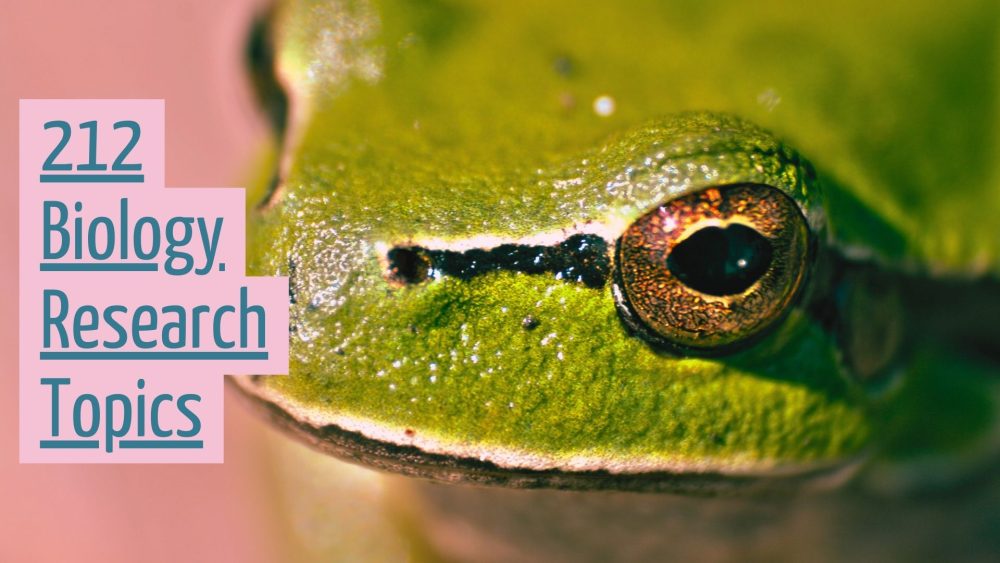
Every student studying something related to biology — botany, marine, animal, medicine, molecular or physical biology, is in an interesting field. It’s a subject that explores how animate and inanimate objects relate to themselves. The field unveils the past, the present, and what lies in the future of the relationship between the living and nonliving things.
This is precisely why you need custom and quality biology topics for your college and university essay or project. It’ll make it easy to brainstorm, research, and get to writing straight away. Before the deep dive, what is biology?
What Is Biology?
Everyone knows it’s the scientific study of life, but beyond that, biology facilitates the comprehension of living and nonliving things. It’s a branch that explores their anatomy, behavior, distribution, morphology, and physiology.
For example, it understands how genes are classified and constituted into generations. It encompasses various branches, including botany, medicine, genetics, ecology, marine biology, zoology, and molecular biology.
Here are what some of these mean:
Botany: This study of plants examines their structure, physiology, ecology, economic importance, and distribution, among others. It also deals with their biochemical processes, properties, and social interactions between plants. It extends to how plants are vital for human life, survival, and growth and how they play a significant role in stabilizing environmental health. Zoology: Zoology studies animal behavior, brain, structure, physiology, class, and distribution. It’s the general study of the lives of both living and extinct animals. It explains animal classification, the animal kingdom, evolution, habitat, embryology, and life span. Physiology: Physiology deals with the daily functions of the human body: How it works and the factors that make it work. It examines molecular behavior, the chemistry and physics behind locomotion, and how the cells in the living organisms’ body function. It helps understand how humans and animals get sick and what can be done to alleviate pain. Microbiology: Dealing with microorganisms, it examined how viruses, algae, fungi, bacteria, protozoa, and slime molds become parts of human life. They’re regarded as microbes, which play substantial roles in the human biochemical processes, including climate change, biodegradation, biodeterioration, food spoilage, biotech, and epidemiology. Marine Biology: This is the scientific study of organs in the sea. It understands their family classification, how they survive, and what makes wild marine animals different from domesticated and consumable ones. It also explores their interaction with the environment through several processes. The marine biologist studies marines in their natural environment, collects data on their characteristics, human impact on their living, and how they relate with themselves.
Now that you know all these, here are some custom biology topics to research for your university or college essay and paper.
Controversial Biology Topics
There are many controversial subjects in every field, and biology isn’t exempt from controversy. If you’d like to create an original essay through diverse opinions, here are biology topics for you:
- What are your thoughts on the post-Roe V Wade world?
- How can the post-Roe V Wade policy affect developing countries looking up to America for their laws?
- Abortion and feminism: discuss
- Does saving life justify cloning?
- Explain the principle of abortion in medical practice
- The effects of cloning in medicine
- How does genetics contribute to obesity?
- Explain why a parent could have Hepatitis B virus and only one of five offspring have the virus
- Is homosexuality really in the gene?
- How does depression correlate with genetics?
- Additives and how they affect the genes
- Examine how genetic mutations work
- Discuss the grounds that you could prove for legalizing human cloning
- Which is more immoral: Human or animal cloning?
- How is nanotechnology different from biotechnology?
- Discuss the manifestation of nanotechnology in science
- Explain three instances where public opinion has held back scientific inventions
- How does transgenic crop work?
- Would you say genetically modified food is safe for consumption?
- Explain why sexual abuse leads to trauma.
Biology Research Paper Topics
You’d need to write an extensive paper on biology one day. This could be when you’re in your final year in college or the university or submitting to a competition. You’d need Biology topics to research for brainstorming, and here are 30 of them:
- Stem cells and tissue formation processes
- Why are there different congenital disabilities?
- Mixtures in anticancer drugs?
- What are the complexities of existing HIV drugs?
- What is the contribution of chemotherapy to cancer?
- Examine the chemotherapy process and why it doesn’t work for some patients.
- Explain the origin of developmental diseases
- How do germs affect the cells?
- What are the consequences of the sun on the white person’s and black person’s skin?
- Why are some diseases treatable through drugs while some are not?
- Scientific lessons learned from COVID-19 and ideas to tackle the next virus
- If animals are carriers of the virus, what should be done to them?
- Examine five animals in extinction and what led to it
- Discuss the subject of endangered species and why people should care
- Is a plant-based diet sustainable for human health?
- Account for the consequence of living on Mars on human health
- Discuss the inconveniences involved in space travel
- How does space flight contribute to environmental disasters
- Discuss the emergence of leukemia
- Explain how the immune systems in humans work
- Evaluate the factors that weaken the immunological system
- What would you consider the deadliest virus?
- Autoimmune: what is it, origin and consequences
- Immune disorder: origin and how it affects the body
- Does stress affect the ability to have sex?
- Contribution of vaccine to eradicating disease: Discuss
- What are the complexities in taking the Hepatitis B vaccine while being positive?
- Allergies: why do humans have them?
- DNA modification: how does it work?
- Explain the misconceptions about the COVID-19 vaccines.
Interesting Biology Topics
Biology doesn’t have to be boring. Different aspects of biology could be fun to explore, especially if you’ve had a flair for the study since your elementary school classes.
You can either write an essay or paper with the following interesting biology research topics:
- Human emotions and conflicts with their intellectual intelligence
- Emotions: Its influence on art and music and how the perception of art influences the world
- The consequences of marijuana and alcohol on teenagers
- Compare and contrast how alcohol affects teenagers and adults
- Discuss the contributions of neuroscience to the subject of emotional pain
- Explain how the brain process speech
- Discuss the factors that cause autism
- Explain what is meant when people say humans are animals
- Why do scientists say humans are pessimists?
- Factors contributing to the dopamine levels human experience
- How does isolation affect the human brain?
- What factors contribute to instinctive responses?
- Noise pollution: how it affects living organisms
- Fire ecology: The contributions of plants to fire outbreak
- Explain the science behind how hot temperature, soil, and dry grass start a fire
- Microbes: what do you understand by bioremediation?
- Explain urban ecology and the challenges it pokes to solve
- Discuss how excessive internet usage affects the human memory
- Evaluate how conservation biology contributes to the extinction prevention efforts
- Discuss the role of satellites and drones in understanding the natural world
- Why do we need space travel and studies?
- Explain the limitations of limnology studies
- What are infectious-disease-causing agents all about?
- Discuss what epigenetics studies encompass
- Why is cancer research essential to the world?
- Discuss climate change: Governments are not interested, and there is no alternative
- How is behavioral science studies a core part of the understanding of the world?
- Discuss the issues with genetic engineering and why it’s a challenge
- Evaluate the strengths and weaknesses in the arguments for a plant-based diet
- Create a survey amongst students of biology asking why they chose to study the course.
Biology Research Topics For College Students
If you find any of the above beyond your intellectual and Research capacity, here are some topics you can handle. You can use these for your essays, projects, quizzes, or competitions.
These custom yet popular biology research topics will examine famous personalities and other discourse in biology:
- Effects of the human hormone on the mind
- Why do men get erect even when they’re absentminded?
- How does women’s arousal work?
- How can melatonin be valuable for therapy?
- Risky behavior: Hormones responsible for the risk
- Stem and cloning: what is the latest research on the subject?
- Hormones: changes in pregnancy
- Why do pregnant women have an appetite for random and remote things?
- The role of physical activities in hormone development
- Examine the benefits and threats of transgenic crops
- The fight against COVID-19: assess current successes
- The fight against smallpox: assess current successes
- The fight against HIV: history, trends, and present research
- Discuss the future of prosthetic appliances
- Examine the research and the future of mind-controlled limbs
- What does cosmetic surgery mean, and why is it needed?
- Analyze the meaning and process of vascular surgery
- Discuss the debate around changes in genital organs for males and females in transgender bodies
- How do donors and organ transplants work?
- Account for the work of Dr. Malcom E Miller
- Discuss the contribution of Charles Darwin to human evolution
- Explain the trends in biomedicine
- Discuss the functions of x-rays in botany
- Assess the most efficient systems for wildlife preservation
- Examine how poverty contributes to climate hazards
- Discuss the process involved in plant metabolism
- The transformation of energy into a living thing: discuss
- Prevention for sexually transmitted disease: What are the misconceptions?
- Analyze how the human body reacts to poison
- Russian Poisoning: What are the lessons scientists must learn?
- COVID-19: Discuss the efforts by two or three governments to prevent the spread
- Discuss the contributions of Pfizer during the pandemic.
Marine Biology Research Topics
This subject explains orgasms in the sea, how they survive, and their interaction with their environment. If you have a flair for this field, the following Biology research topics may interest you:
- Discuss what quantitative ecology through modeling means
- Smallest diatoms and marine logistics: discuss
- How is the shark studied?
- Acidification of seas: Causes and consequences
- Discuss the concept of the immortality of Jellyfishes
- Discuss the differences between seawater and freshwater in marine study
- Account for some of the oldest marine species
- Discuss the evolution of the deep sea
- Explain whales’ communication techniques
- What does plankton ecology encompass?
- The importance of coral reefs to seawater
- Challenges that encompass geological oceanography
- How tourism affects natural animal habitat
- Discuss some instances of the domestication of wild marine animals
- Coastal zone: pros and cons of living in such areas
- How do sharks perceive enemies?
- Analyze why some animals can live in water but can’t live on land
- Explain how plants survive in the sea
- Compare and contrast the different two species of animals in the water
- How can marine energy be generated, stored, and used?
Molecular Biology Research Topics
Focusing on the construct of cells and analysis of their composition, it understands the alteration and maintenance of cellular processes. If you’d like to focus on molecular biology, here are 15 good biology research topics for you:
- Ethical considerations in molecular genetics
- Discuss the structure and component of the gene
- Examine the restrictions in DNA
- What are the peculiarities in modern nucleic acid analysis
- What goes into the Pharmaceutical production of drugs
- Evaluate the building blocks of life
- Discuss the systems of RNA translation to protein
- PCR: How DNA is tested and analyzed
- Why is prion disease so dangerous?
- Compare and contrast recessive genes vs. dominant genes
- Can there be damage to the human DNA, and can it be repaired?
- Constraints in the research of microarray data analysis
- Protein purification: How it evolves
- Objectives of nucleic acid
- Explain the structure of a prion.
Biology Research Topics For High School
Your teachers and professors will be awed if you create impeccable essays for your next report. You need to secure the best grades as you move closer to graduation, and brainstorming any of these popular biology research topics will help:
- Identify the most endangered species
- The challenges to animal extinction
- What are the things everyone should know about sea life?
- Discuss the history of genetics
- Explain the biological theory of Charles Darwin
- How did the lockdown affect social interaction?
- Why do some people refuse the vaccine?
- Origin of genetics
- What is animal hunting, and why is it fashionable
- Explain the evolution of a virus
- Role of lockdown in preventing deaths and illnesses
- Invasive species: What does it mean?
- Endangered animals: How do they survive in the face of their hazards?
- Lockdown and their role in reducing coronavirus transmission
- Vaccine distribution: Ideas for global distribution
- Why can viruses become less virulent?
- Discuss the evolution of the world
- Explain the evolution of the planet
- Explain what Elon Musk means when he says life on Mars is possible
- What does herd immunity mean?
- Flu: why is there a low incidence in 2020?
- Relationship between archaeology and biology
- Antiviral drug: What it means
- Factors leading to the evolution of humans
- Give instances of what natural selection means
- What is considered the dead branches of evolution
- Whale hunting: What it means and the present trends
- Who is Stephen Jay, and what is his role in paleontology?
- Origin of diseases: why must humans fall sick?
- Why are humans called higher animals?
Human Biology Research Topics
Human biology understands humans and their relationship between themselves and their environment. It also studies how the body works and the impediments to health. Here are some easy biology research topics to explore on the subject:
- How do gut bacteria affect the brain?
- What are the ethical concerns around organ transplants?
- The consequence of alcohol on the liver
- The consequences of extreme salt on the human body
- Why do humans need to deworm regularly?
- The relationship between obesity and genetics
- Genetically modified foods: Why are they needed?
- How sun exposure affects human skin
- Latest trends: Depression is hereditary
- Influence of music on the human brain
- What are the stages of lung cancer
- Forensic DNA: latest trends
- How visual consumptions affect how humans think
- What is the process that leads to pregnancy?
- Explain the role of nanotechnology in HIV research
- Discuss any experiment with stem cells you know about
- Explain how humans consume food
- Discuss the process of metabolism as well as its criticality to human health
- Explore the consistent challenges technology poses to human health
- Explain the process of body decay to a skeleton.
Cell Biology Research Topics
There are many evolutionary biology research paper topics formed not by the nomenclature but for what they stand for. Cell biology is one of the most complex branches of the field.
It examines minor units and the living organisms that make them up. The focus is on the relationship between the cytoplasm, membrane, and parts of the cell. Here are some topics to explore for your scientific dissertation writing :
- How does chromatin engage in the alterations of gene expression?
- What are the usual cell infections, and why does the body have immunity defections?
- Identify and account for the heritage of Robert Brown in his core career focus
- Explain the structure of the animal cell and why It’s what it is
- Identify the cells in the human body as well as their functions
- Explain a scenario and justify the context of animals photosynthesizing like plants
- Why do bacteria invade the body, and how do they do it?
- Why are mitochondria considered the powerhouse of the cell
- Use the molecular analysis tool to explain multicellular organisms
- Examine how the White blood cells fight disease
- What do you understand about the role of cell biology in the treatment of Alzheimer’s Disease
- What are the latest research methods in cell biology?
- Identify the characteristics of viruses and why they threaten human existence.
- Discuss the differences between DNA and RNA
- What part of the body is responsible for human functionality for as long as the individual wants?
Get Biology Research Help As Soon As Possible
Creating the best essays or papers is easier now that you have custom biology research topics. However, you may still need support writing your paper beyond these topic ideas. After all, the first stage of writing like experts is brainstorming ideas and researching which is most feasible to write about.
If you truly want to wow your professor or teacher but can’t afford to dedicate all the required time, here’s an alternative. You can hire writing helpers online for quality papers at a cheap price, and we can help with that. We are a team of writers with many years of writing experience for students in Europe and North America. You can even buy thesis online with us, as well as editing services.
Each paper is assigned to writers with expertise in a specific field. This enables them to provide in-depth analysis as your assignment requires. We’re based online, which means you won’t have issues with accessibility and availability. Just tell us what you need, and we will get it done.

Leave a Reply Cancel reply
Your email address will not be published. Required fields are marked *
Comment * Error message
Name * Error message
Email * Error message
Save my name, email, and website in this browser for the next time I comment.
As Putin continues killing civilians, bombing kindergartens, and threatening WWIII, Ukraine fights for the world's peaceful future.
Ukraine Live Updates

Top 240 Biology Research Topics for Students in 2022
Team Desklib
Published: 2022-09-19

Biology is the scientific study of life and living beings. In this, a student studies physiology, morphology, anatomy, behavior, and other qualities of a living organism. Biology is derived from the Greek words “bios” and “logos”. Bios mean life; logos means study.
Biology is an essential branch of science and the most crucial branch in itself, the medical science emerged parallelly with biology. Today we are aware of the human body parts and the diseases related to them and the cure to the disease, this is all because of biology. Hence, biology is the most helpful branch of science for living beings.
This field of science could be enhanced by the new generation as they perform research for the sake of humanity and for the betterment of medical science so that, in the future, all living beings can live a disease-free life.
Read also: I always find a trusted place to get the best research paper topics .
The Main Branches of Biology and Some General Bio Research Topics
Here, we are going to suggest to you some good research topics in biology which might help you in becoming a good researcher. Thus, will eventually help you in settling one more stair upward towards the betterment of medical science.
Top 20 Innovative Research Topics in Biology
- Genetic engineering.
- Epidemiology in the case of coronavirus.
- Astrobiology.
- Cancerous cells.
- Endangered species recovery.
- Toxins in the human body can kill bacteria.
- Ocean acidification.
- Stem cell research and therapy.
- About pseudomonas aeruginosa.
- Comparative genomics.
- Molecular and genome evolution.
- Neurobiological explanation of sleep.
- Symbiosis in parasites.
- Modern technology and tools in the research of biology.
- Change in the behavior of animals due to climate change.
- Fast food chemicals affect the human body.
- Is a stressful environment and disturbed ecology reason behind the humans taking stress.
- ACHOO syndrome.
- Protein synthesis.
- The mixing of races is an example of cross-breeding.
Top 20 Easy Biology Research Topics
- Male pregnancy in animal species.
- Immune system.
- Metabolism.
- Fertilizers.
- Transportation of essential minerals in plants.
- DNA and physical state.
- Structure of cell.
- Characteristics of DNA and RNA.
- Obesity in youngsters.
- The reason behind giving birth to twins.
- Top killer viruses.
- Birth defects.
- Animal husbandry.
- Pollution in water bodies.
- Protection of endangered species.
- Migratory birds and the reason behind their migration.
- Adaptation of animals towards environments.
- Oils spill into oceans.
- Shale gas reservoirs.
- Acid rain and its effects on living beings and plants.
Do also go through science research topics prior to moving ahead !
What are the Branches of Biology and their Research Topics?
Biology is the study of the vital processes in living beings. Biology is further subdivided into various branches to make it convenient to study. Though, the principle in all the components is the same and consistent. Here are mentioned below, a few sub-branches of biology along with their research topics.
Botany is the study of plants . Botany is the detailed study of the function of plants and types. This is the study of, the classes, family, diseases, etc related to plants. Botany is a good area for research and plant lovers can ace the benefits from the topics that we are going to provide them.
Top 20 Botany Research Topics
- Genetic inheritance in plant species.
- Crop science.
- Plant diseases.
- Plant stress physiology.
- Herbs, shrubs, and trees.
- Innovation in agriculture.
- Plants cross-breeding.
- Cytogenetics.
- Paleobotany.
- Staple crops.
- Multi-cropping.
- Fuel from sugarcane.
- Nitrifying monocot grains.
- High-yield variety of crops.
- Plant lectins in cancer therapeutics.
- Synergy among anti-bacterial peptides.
- Land plant molecular phylogenetics.
- Describe the role of anti-microbial peptides in the community of plants.
- What are vascular plant apomorphies?
You might also be interested in knowing Different Branches of Chemistry
Zoology
Zoology is the branch of biology that deals with the study and research of animals and the animal kingdom, and how they interact with their ecosystem. The student of zoology comprehensively studies the structure, embryology, evolution, classification, habits, and distribution of all animals, both living and extinct.
Research in this branch of biology is a daunting task, it requires lots of observation and patience, as it is difficult to understand the behavior of an animal. Here we are to suggest to you some good zoology research topics having a good scope of research.
Top 20 Zoology Research Topics
- Phylogeny of invertebrates.
- Explain Animal kingdoms and classes both horizontally and vertically.
- The origin and evolution of the multicellular organism.
- Warm-blooded and cold-blooded animals.
- Vertebrates and invertebrates.
- Explain the Development cycle of non-helminths-geohelminths and non-helminths-biohelminths.
- Discuss the Arthropods' existence and evolution.
- Crustaceans and their variety.
- How did the primate evolve?
- Diversity of flatworms and tapeworms.
- Types of flagellates.
- Features of cephalopods.
- State the difference between Polyplacophora and Monoplacophora.
- Characteristics of annelids.
- What is anthropogenesis?
- Describe the anatomical view of invertebrates and vertebrates.
- What is the difference between an open and closed circulatory system?
- The mammals' class system and division.
- Reptiles and their evolution.
- Extinct animals and the reason behind their extinctions and a way forward to this.
Genetics is the scientific study of genes and heredity . Researchers notice, how certain qualities or traits are passed from parents to offspring due to changes in the DNA sequence.
A gene is the basic segment of DNA that contains instructions for building one or more molecules that help the body work. The structure, function, variation, and distribution of genes are studied within the context of the cell, the organism, and within the context of the population.
Also Read: Twin Research and Human Genetics
Writing a research paper on this branch of biology is going to be an exciting task. Here we have a few interesting topics related to genetics:
Top 20 Genetics Research Topics
- Chromatin structure.
- Gene editing.
- Gene therapy.
- Microbiome.
- Neuroscience.
- Epidemiology.
- Population genetics.
- Prenatal screening.
- Genetic abnormalities.
- Mitochondrial disorders.
- Pronuclear transfer.
- Maternal spindle transfer.
- CRISPR-CAS9 gene editing.
- Inherited diseases.
- Parkinson’s disease.
- Turner syndrome.
- Klinefelter syndrome.
- Down syndrome.
- Fragile X syndrome .
Environmental Biology
Environmental biology lies in resemblance to ecology, it is a scientific program that focuses on the scientific study of the origins, relationships, functions, interactions, and the natural history of all the living beings, populations, species, and communities, in an ecosystem.
Environmental biology is the most crucial branch of biology and an essential topic for research. Due to climate changes and the extinction of some species, This field of biology requires good and comprehensive research so that a step toward the betterment of an environment can be found and taken by humanity. Here we are going to suggest to you some good environmental biology topics.
Top 20 Environmental Biology Research Topics
- Chemical ecology.
- Tropical wetland ecology.
- Animal behavior.
- Migration of some species due to environmental changes.
- Renewable energy.
- Fire ecology.
- Bioremediation.
- Environmental justice.
- Carbon emissions and control.
- Endemic wildlife.
- Importance of national parks.
- The important role played by wildlife sanctuaries.
- Saving our planet by using green energy.
- Melting of permafrost.
- Depletion of the ozone layer.
- Lungs and heart diseases are increasing due to climate change.
- Destruction of the forest ecosystem is a matter of concern.
- Urban migration.
- Contamination of groundwater.
Need help with Environmental Science Homework Help ?
Cell Biology
Cell is the basic unit of life, multiple cells are combined together to form a tissue and multiple tissues are further combined to form an organism. Cell biology is the branch of biology that studies the structure, function, and behavior of cells in different living beings.
Cell biology encompasses the study of both eukaryotic and prokaryotic cells and both multicellular and single-cell organisms. As every living being is made up of cells, this branch of science becomes the most important branch of biology and the field of research.
Top 20 Cell Biology Research opics
- Cytoskeleton.
- Cell motility.
- Chromatin and gene expression.
- Endosymbiosis.
- Cell evolution.
- Cellular metabolism.
- Cell fate determination.
- Development of the embryo.
- Organelle biogenesis.
- Schistosomiasis.
- Cell differentiation and morphogenesis.
- Stem cell biology.
- Host-parasite interaction.
- Lymphocyte migration.
- Temporal and spatial control of gene expression.
- Epigenetics.
- Cell signaling.
- Regeneration of cells.
- Cell division
Biotechnology
Biotechnology is an integrated study of engineering sciences and natural sciences . It is done with the aim to achieve the applications of cells, organisms, and parts for products and services. It is referred to as using a living organism to produce a different product.
For instance, yeast is a living organism used in the baking of bread. This branch of biology also has a wide scope of research, as our food habits are proportionate to food packaging. Hence research in this field becomes mandatory and going to be proved useful. We are going to suggest to you some good research topics in biotechnology .
Top 20 Biotechnology Research Topics
- Cancer biotechnology.
- Transplantation biology.
- Cell and molecular biology.
- Microbial biotechnology.
- Environmental biotechnology.
- Nanobiotechnology.
- Sustainable and global health biotechnology.
- Pharmacogenomics of anti-hypertensive drugs.
- Pharmacogenomics of metformin in diabetes mellitus type2.
- Medical biotechnology.
- Proteomics.
- Structural biology of infectious diseases.
- Pharmaceutical biotechnology.
- Agricultural biotechnology.
- Bioengineering and research.
- Y-chromosome genotyping.
- Role of Embelin in cancer.
- Hypoallergenic fermented foods.
- Exocellulase and Endocellulase.
- Techniques of protein purification.
Molecular Biology
Microbiology is the branch of biology that seeks to understand the function and structure of the macromolecules that are essential for life. The detailed study of the physical and chemical structure of biological macromolecules is called molecular biology . It is essential to understand the chemical function happening in a living being as they affect both the physical and mental health of an organism.
Writing a research paper is also a crucial task as research in this field is a need of an hour because chemical and hormonal changes take place in a body time and to balance these chemical ups and downs in a body a good medicine or a technique is required which can be invented by good research. So your research paper in molecular biology should entail a series of your findings. Here we are to recommend you few topics to research and write about.
Top 20 Molecular Biology Research Topics
- Structure of DNA.
- Structure of RNA.
- Polymerase chain reaction.
- Recombinant DNA technology.
- Transcription of genes.
- Cell division.
- DNA cloning.
- Prokaryotic transcription.
- Eukaryotic transcription.
- Gene regulations.
- Protein synthesis in cells.
- Chromosome building and function during mitosis.
- Cystic fibrosis.
- Alkaline phosphatase.
- Plasmid loss in bacteria.
- Chemo-enzymatic synthesis.
- Monoclonal antibodies.
- Non-histone proteins.
- Telomerase insufficiency.
Need help with Biology Homework Help ?
Neurobiology
Neuroscience is the branch of biology that deals with the scientific study and functions of the nervous system. The nervous system is made up of three parts: the brain, the spinal cord, and the peripheral nervous system. Neurobiology or neuroscience has a broader scope of research in which a scientist uses different approaches to study the nervous system at different scales. Here we are to suggest to you some really good research topics on neurobiology .
Top 20 Neurobiology Research Topics
- Cellular and molecular neuroscience.
- System neuroscience.
- Cognitive and behavioral neuroscience.
- Computational neuroscience.
- Clinical neuroscience.
- Degenerative brain disorder.
- Dopamine in the brain. What is its role?
- Functional organization of memory.
- Neuroplasticity.
- Schizophrenia.
- Enhancing memory through electrical stimulation.
- Transcranial magnetic stimulation.
- Postpartum depression.
- Algorithms in the brain.
- Effects of LSD.
- Analyze the prefrontal cortex.
- Role of the cerebellum.
- Neurotransmitter disabilities.
- Role of axon in handling the action potential.
- Hippocampus area of the brain.
Top 20 Biology Research Topics for High School Students
- What are cloning and its basic principles?
- Genetic disorders.
- Coronaviridae.
- The human brain and nervous system.
- The right and left sides of the brain. differentiate them on the basis of functions.
- Hormonal changes.
- Immunity system.
- Open and closed circulatory system.
- Viviparous organisms.
- Oviparous organisms.
- Oxytocin and serotonin.
- Human reproduction.
- DNA and physical traits are transferred to offspring.
- Climate change.
- Gases are involved in global warming.
- Tissues in plants.
- Differentiate between plant tissue and animal tissue.
- Role of stomata in the process of photosynthesis.
- Structure of cell and difference between animal and plant cell.
You might also be interested in choosing: Research Topics for High School Students
Top 20 Biology Research Topics for College Students
- Characteristics of viruses.
- Single cellular organisms.
- Research methods in cell biology.
- Visual cortex.
- Depression in youngsters.
- Heartattack these days.
- Oxidative stress.
- Cardio exercises.
- Hormonal changes in the female body.
- Anatomy of a fish.
- Anatomy of a cockroach.
- Anatomy of annelids.
- Anatomy of a frog.
- Biological names.
- Morphology of flowers(rose).
- Darwin’s theory.
- Natural selection theory.
- Survival of the fittest theory.
Conclusion:
Biology is a vast field having many branches and sub-branches . Through this blog, we have discussed with you a few topics of biology for both college and high school students, some innovative and easy topics of biology to research, and comprehensively elaborated on every branch of biology along with its research topics. Our suggestions and discussion will bring you the confidence to write a good biology research paper.
Some more interesting research topics for other different subjects:
Top Trending 150+ Accounting Research Topics
130+ Marketing Research Topics for Marketing Students
Top 140+ Research Topics for Journalism Students
100+ Research Topics for Physiotherapy Students in 2022
120 Hot Research Topics for Nursing Students
Top 50+ Research Topics for High School Students in 2022
Your Feedback matters
- Privacy Policy

Home » 350+ Biology Research Topics
350+ Biology Research Topics

Biology is a vast field of study that explores the diverse aspects of life, from the smallest organisms to the complex ecosystems they inhabit. With new discoveries being made every day, the field of biology is constantly evolving and expanding. As a result, there are numerous research topics within biology that can capture the imagination of students, researchers , and professionals alike. Whether you’re interested in genetics, ecology, microbiology, or any other subfield of biology, there is no shortage of fascinating topics to explore. In this post, we will discuss some of the most compelling biology research topics that you can delve into.
Biology Research Topics
Biology Research Topics are as follows:
- The role of gut microbiota in human health and disease.
- The effects of climate change on animal behavior and physiology.
- The molecular mechanisms of cancer development and progression.
- The evolutionary origins of human language.
- The impact of pesticides on insect populations and ecosystems.
- The genetic basis of aging and longevity.
- The ecological importance of microbial communities in soil.
- The physiology and behavior of marine mammals.
- The molecular mechanisms of viral infections.
- The evolutionary history of flowering plants.
- The ecological impacts of invasive species.
- The role of epigenetics in gene regulation and disease.
- The evolution of social behavior in animals.
- The physiology and ecology of birdsong.
- The impact of antibiotics on gut microbiota and human health.
- The role of the microbiome in psychiatric disorders.
- The evolutionary history of human migrations.
- The ecological and physiological effects of light pollution on animals.
- The mechanisms of cell division and differentiation.
- The ecological impacts of deforestation.
- The molecular mechanisms of drug addiction.
- The genetic basis of plant resistance to pests and diseases.
- The evolutionary history of human diet and nutrition.
- The molecular mechanisms of neurodegenerative diseases.
- The ecology and evolution of sexual selection.
- The physiological and behavioral effects of air pollution on animals.
- The role of epigenetics in plant development and stress response.
- The evolutionary history of animal domestication.
- The molecular mechanisms of genetic diseases.
- The ecological impacts of climate change on plants.
- The evolutionary history of human mating systems.
- The physiological and behavioral effects of noise pollution on animals.
- The genetic basis of intelligence and cognitive abilities.
- The ecological and physiological effects of ocean acidification on marine organisms.
- The molecular mechanisms of immune system function and dysfunction.
- The evolutionary history of human social structures.
- The ecological impacts of plastic pollution on marine ecosystems.
- The genetic basis of animal migration.
- The physiological and behavioral effects of light and dark cycles on animals.
- The ecological and evolutionary dynamics of symbiosis.
- The molecular mechanisms of gene regulation and expression.
- The evolutionary history of human disease resistance.
- The ecological impacts of overfishing on marine ecosystems.
- The genetic basis of animal communication.
- The physiological and behavioral effects of temperature changes on animals.
- The ecological and evolutionary dynamics of parasitism.
- The molecular mechanisms of circadian rhythms.
- The evolutionary history of human social cognition.
- The ecological impacts of urbanization on wildlife.
- The genetic basis of antibiotic resistance in bacteria.
- The impact of climate change on insect population dynamics.
- The role of the microbiome in the development of autoimmune diseases.
- The genetic basis of complex human diseases such as diabetes and heart disease.
- The evolution of plant secondary metabolites and their ecological functions.
- The effects of anthropogenic noise on animal communication and behavior.
- The molecular mechanisms of protein synthesis and folding.
- The role of RNA in gene expression and regulation.
- The ecology and evolution of microbial symbioses in plants.
- The physiological and behavioral effects of air temperature changes on animals.
- The genetic basis of crop domestication and improvement.
- The evolution of reproductive strategies in animals.
- The impacts of plastic pollution on terrestrial ecosystems.
- The molecular mechanisms of stem cell differentiation and regeneration.
- The ecological dynamics of predator-prey interactions.
- The role of gut microbiota in the regulation of host metabolism.
- The genetic basis of host-pathogen coevolution.
- The evolution of social cognition and cooperation in animals.
- The ecological and physiological effects of wildfires on ecosystems.
- The molecular mechanisms of transcriptional regulation in eukaryotic cells.
- The role of microorganisms in soil nutrient cycling and ecosystem functioning.
- The genetic basis of plant-pathogen interactions.
- The ecology and evolution of microbial communities in the ocean.
- The physiological and behavioral effects of water pollution on aquatic organisms.
- The molecular mechanisms of protein degradation and turnover.
- The impact of urbanization on pollinator populations and plant-pollinator interactions.
- The genetic basis of insecticide resistance in pests.
- The evolution of animal cognition and perception.
- The ecological and evolutionary dynamics of host-parasite interactions.
- The role of epigenetic modifications in plant adaptation to environmental stress.
- The physiological and behavioral effects of endocrine disruptors on animals.
- The molecular mechanisms of DNA replication and repair.
- The impact of ocean warming on coral reef ecosystems.
- The genetic basis of animal personality traits.
- The ecology and evolution of microbial symbioses in animals.
- The physiological and behavioral effects of light quality on plants.
- The molecular mechanisms of RNA editing and splicing.
- The role of microbial communities in plant-pathogen interactions.
- The ecological and evolutionary dynamics of seed dispersal.
- The genetic basis of animal coloration and pattern.
- The impact of climate change on plant phenology and productivity.
- The molecular mechanisms of signal transduction in cells.
- The role of microbial communities in the human gut-brain axis.
- The ecology and evolution of animal migrations.
- The physiological and behavioral effects of chemical pollution on animals.
- The genetic basis of animal development and morphogenesis.
- The evolution of animal social behavior and communication.
- The ecological dynamics of plant-pollinator networks.
- The molecular mechanisms of intracellular trafficking and transport.
- The role of microbial communities in the degradation of pollutants.
- The ecological and evolutionary dynamics of species interactions in ecological communities.
- The role of epigenetics in cancer development and progression.
- The molecular basis of antibiotic resistance in bacteria.
- The impact of climate change on biodiversity and ecosystem functioning.
- The genetic basis of aging and age-related diseases.
- The evolution of social organization in primates.
- The ecological dynamics of plant-fungal interactions.
- The role of microbiota in immune system development and function.
- The molecular mechanisms of DNA damage and repair.
- The physiological and behavioral effects of climate change on marine organisms.
- The genetic basis of human variation and diversity.
- The evolution of sexual selection and mate choice in animals.
- The ecological and evolutionary dynamics of species invasions.
- The role of microbiota in brain function and behavior.
- The molecular mechanisms of immune system activation and regulation.
- The physiological and behavioral effects of pollution on wildlife.
- The genetic basis of behavioral disorders and mental illness.
- The evolution of plant-pollinator mutualisms.
- The ecological dynamics of predator-prey coevolution.
- The role of microbiota in metabolic diseases such as obesity and diabetes.
- The molecular mechanisms of protein-protein interactions and signaling.
- The genetic basis of complex traits such as intelligence and personality.
- The evolution of animal communication and language.
- The ecological and evolutionary dynamics of mutualistic interactions in ecological communities.
- The role of microbiota in the development and maintenance of gut homeostasis.
- The molecular mechanisms of neurotransmitter synthesis and release.
- The physiological and behavioral effects of artificial light at night on wildlife.
- The genetic basis of developmental disorders such as autism and ADHD.
- The evolution of host-parasite coevolution and adaptation.
- The ecological dynamics of plant-herbivore interactions.
- The role of microbiota in the regulation of metabolism and energy balance.
- The molecular mechanisms of membrane transport and signaling.
- The physiological and behavioral effects of habitat fragmentation on wildlife.
- The genetic basis of circadian rhythms and sleep disorders.
- The evolution of animal cognition and decision-making.
- The ecological and evolutionary dynamics of trophic cascades.
- The role of microbiota in the development and function of the respiratory system.
- The molecular mechanisms of epigenetic inheritance.
- The physiological and behavioral effects of endocrine disruptors on wildlife.
- The genetic basis of developmental plasticity and adaptation.
- The evolution of animal social learning and culture.
- The ecological dynamics of predator-prey interactions in aquatic systems.
- The role of microbiota in the regulation of host immunity and inflammation.
- The molecular mechanisms of RNA interference and gene silencing.
- The physiological and behavioral effects of climate change on migratory animals.
- The genetic basis of drug addiction and substance abuse disorders.
- The evolution of animal cooperation and conflict resolution.
- The ecological and evolutionary dynamics of niche construction.
- The role of microbiota in the regulation of host-microbe interactions.
- The molecular mechanisms of gene regulation by non-coding RNAs.
- The role of epigenetics in gene expression and regulation.
- The molecular mechanisms of DNA damage response and repair.
- The impact of environmental toxins on human health.
- The evolutionary origins of viruses and their impact on hosts.
- The genetics of aging and age-related diseases.
- The impact of ocean acidification on marine organisms.
- The molecular basis of cancer development and progression.
- The genetic basis of behavior in animals.
- The impact of environmental stressors on plant growth and productivity.
- The evolution of sex determination and sexual selection.
- The role of the immune system in host-microbe interactions.
- The molecular mechanisms of circadian rhythms and sleep.
- The impact of air pollution on respiratory health.
- The genetic basis of speciation and hybridization.
- The role of neurotransmitters in brain function and behavior.
- The ecological dynamics of microbial communities in soil.
- The impact of climate change on biodiversity and ecosystem services.
- The molecular mechanisms of viral entry, replication, and release.
- The genetics of plant domestication and diversification.
- The role of mitochondrial DNA in aging and disease.
- The impact of deforestation on ecosystem functioning.
- The molecular basis of drug addiction and treatment.
- The genetic basis of adaptation and evolution in response to environmental change.
- The role of gut-brain signaling in behavior and disease.
- The impact of noise pollution on wildlife populations.
- The genetic basis of plant morphology and development.
- The role of the microbiome in disease susceptibility and resistance.
- The ecological dynamics of plant-insect interactions.
- The impact of agricultural practices on soil health and biodiversity.
- The molecular mechanisms of gene regulation in development and disease.
- The genetic basis of complex traits in humans and animals.
- The role of cytokines in immune response and inflammation.
- The ecological dynamics of microbial communities in aquatic ecosystems.
- The impact of plastic waste on marine ecosystems.
- The molecular mechanisms of genome stability and repair.
- The genetics of rare and common genetic diseases.
- The role of the endocannabinoid system in health and disease.
- The ecological dynamics of competition and cooperation in populations.
- The impact of light pollution on wildlife behavior and ecology.
- The genetic basis of animal migration and navigation.
- The role of the microbiome in host metabolism and energy balance.
- The impact of climate change on agricultural productivity and food security.
- The molecular mechanisms of epigenetic inheritance and transmission.
- The genetics of human brain development and disorders.
- The role of pheromones in animal communication and behavior.
- The ecological dynamics of host-microbe-pathogen interactions.
- The effect of diet and nutrition on gut microbiome diversity and composition.
- The ecology and evolution of microbial interactions in the soil.
- The role of epigenetic modifications in cancer development and progression.
- The impact of climate change on marine biodiversity and ecosystem functioning.
- The molecular mechanisms of mitochondrial respiration and ATP synthesis.
- The role of non-coding RNAs in gene regulation and disease.
- The evolution and diversification of flowering plants.
- The effects of artificial light at night on animal behavior and physiology.
- The genetic basis of adaptation to extreme environments.
- The ecology and evolution of plant-microbe interactions.
- The physiological and behavioral effects of noise pollution on wildlife.
- The molecular mechanisms of DNA methylation and histone modification.
- The role of microbial communities in the cycling of nutrients in aquatic ecosystems.
- The evolution of animal color vision and perception.
- The ecological and evolutionary dynamics of mutualistic interactions.
- The impact of deforestation on soil fertility and carbon storage.
- The molecular mechanisms of viral replication and pathogenesis.
- The role of microorganisms in the biodegradation of plastics.
- The ecology and evolution of microbial communities in the human gut.
- The physiological and behavioral effects of climate change on birds.
- The impact of invasive species on native ecosystems.
- The genetic basis of developmental disorders and intellectual disabilities.
- The evolution of animal behavior and communication in response to anthropogenic change.
- The ecological dynamics of soil carbon sequestration and storage.
- The role of microbial communities in the decomposition of organic matter.
- The physiological and behavioral effects of air pollution on plants.
- The molecular mechanisms of cellular differentiation and tissue development.
- The ecology and evolution of plant-animal interactions.
- The genetic basis of resistance to herbicides and pesticides in crops.
- The impact of urbanization on bird diversity and distribution.
- The role of microorganisms in the cycling of carbon and nitrogen in soil.
- The ecological and evolutionary dynamics of invasive species interactions.
- The physiological and behavioral effects of climate change on reptiles and amphibians.
- The role of microbial communities in the degradation of petroleum hydrocarbons.
- The genetic basis of plant development and growth.
- The evolution of animal migration and dispersal.
- The impact of land use change on freshwater biodiversity.
- The molecular mechanisms of membrane transport and ion channels.
- The role of microorganisms in the cycling of sulfur and phosphorus in soil.
- The physiological and behavioral effects of ocean acidification on marine organisms.
- The genetic basis of behavior and personality traits in humans.
- The evolution of plant reproductive strategies and pollination systems.
- The ecological and evolutionary dynamics of predator-prey coevolution.
- The impact of environmental stressors on gene expression and epigenetics.
- The evolution of sexual reproduction and mating systems in plants.
- The role of microorganisms in bioremediation of contaminated sites.
- The physiological and behavioral effects of climate change on fish.
- The molecular mechanisms of chromatin remodeling and gene regulation.
- The genetic basis of adaptation to high altitude environments.
- The ecology and evolution of plant-insect interactions.
- The impact of pesticide use on insect biodiversity and ecosystem functioning.
- The role of microorganisms in nitrogen fixation and cycling.
- The genetic basis of neurodegenerative diseases and cognitive decline.
- The evolution of social behavior and cooperation in animals.
- The ecological and evolutionary dynamics of plant invasions.
- The physiological and behavioral effects of noise pollution on humans.
- The molecular mechanisms of RNA splicing and alternative splicing.
- The role of microorganisms in biogeochemical cycling of trace elements.
- The genetic basis of adaptation to extreme temperatures.
- The ecology and evolution of microbial communities in soil and water.
- The impact of climate change on insect phenology and distribution.
- The molecular mechanisms of protein folding and misfolding.
- The role of microorganisms in biodegradation of environmental pollutants.
- The evolution of animal cognition and intelligence.
- The ecological and evolutionary dynamics of predator-prey interactions.
- The impact of anthropogenic noise on marine mammals.
- The role of microorganisms in biofilm formation and quorum sensing.
- The genetic basis of speciation and hybridization in plants.
- The evolution of parental care and offspring development in animals.
- The ecological and evolutionary dynamics of food web interactions.
- The physiological and behavioral effects of air pollution on human health.
- The molecular mechanisms of transcriptional regulation and gene expression.
- The role of microorganisms in plant growth promotion and disease suppression.
- The genetic basis of adaptation to drought stress in crops.
- The ecology and evolution of microbial interactions in the ocean.
- The impact of land use change on soil erosion and nutrient cycling.
- The molecular mechanisms of autophagy and programmed cell death.
- The role of microorganisms in biodegradation of pharmaceuticals.
- The genetic basis of immune system variation and disease susceptibility.
- The evolution of animal social networks and communication systems.
- The ecological and evolutionary dynamics of biodiversity loss.
- The physiological and behavioral effects of light pollution on nocturnal animals.
- The molecular mechanisms of DNA repair and genome stability.
- The role of microorganisms in the production of biofuels and bioplastics.
- The genetic basis of adaptation to salinity stress in plants.
- The ecology and evolution of microbial symbioses with plants and animals.
- The impact of climate change on plant-pollinator interactions.
- The molecular mechanisms of cellular senescence and aging.
- The role of microorganisms in biodegradation of synthetic organic compounds.
- The genetic basis of variation in complex traits in humans.
- The evolution of animal social behavior and cultural transmission
- The genetic basis of cancer development and progression.
- The role of microorganisms in the gut microbiome and human health.
- The genetic basis of phenotypic plasticity and adaptation in plants.
- The evolution of animal migration and navigation.
- The ecological and evolutionary dynamics of community assembly.
- The physiological and behavioral effects of light and dark cycles on circadian rhythms.
- The molecular mechanisms of protein synthesis and degradation.
- The role of microorganisms in nitrogen and carbon cycling in aquatic ecosystems.
- The genetic basis of sex determination and differentiation in animals.
- The ecology and evolution of predator-prey coevolution.
- The impact of anthropogenic activities on marine biodiversity and ecosystems.
- The role of microorganisms in bioleaching and biomining of metals.
- The genetic basis of inherited disorders and genetic diseases.
- The evolution of animal social behavior and communication systems.
- The ecological and evolutionary dynamics of competition and coexistence.
- The physiological and behavioral effects of endocrine disruptors on human health.
- The molecular mechanisms of cell division and mitosis.
- The role of microorganisms in biodegradation of plastics and synthetic materials.
- The genetic basis of epigenetic inheritance and regulation.
- The ecology and evolution of mutualistic symbioses in plants and animals.
- The impact of habitat fragmentation on species diversity and ecosystem functioning.
- The role of microorganisms in bioremediation of oil spills.
- The genetic basis of drug resistance in pathogens and cancer cells.
- The evolution of animal personality and individual variation.
- The ecological and evolutionary dynamics of biotic interactions in freshwater ecosystems.
- The physiological and behavioral effects of artificial sweeteners on human health.
- The molecular mechanisms of intracellular trafficking and secretion.
- The role of microorganisms in biocontrol of plant pathogens and pests.
- The genetic basis of hybridization and introgression in animals and plants.
- The ecology and evolution of plant-pollinator mutualisms.
- The impact of climate change on marine ecosystems and fisheries.
- The molecular mechanisms of genome editing and gene therapy.
- The role of microorganisms in biogas production and carbon capture.
- The genetic basis of developmental disorders and birth defects.
- The evolution of animal coloration and camouflage.
- The ecological and evolutionary dynamics of invasive species.
- The physiological and behavioral effects of air pollution on wildlife.
- The molecular mechanisms of signal transduction and cell signaling.
- The role of microorganisms in biodegradation of pharmaceuticals and personal care products.
- The genetic basis of reproductive isolation and speciation.
- The ecology and evolution of microbial interactions with plants and insects.
- The impact of climate change on bird migration and breeding patterns.
- The molecular mechanisms of protein-protein interactions and protein complexes.
- The role of microorganisms in bioremediation of heavy metals.
- The evolution of animal cognition and learning.
- The ecological and evolutionary dynamics of biodiversity hotspots.
- The impact of ocean acidification on marine ecosystems.
- The genetics of complex diseases and personalized medicine.
- The evolution of plant defense mechanisms against herbivores.
- The role of microorganisms in soil carbon sequestration.
- The physiological and behavioral effects of light on plant growth and development.
- The molecular mechanisms of cancer metastasis and invasion.
- The ecology and evolution of microbial communities in the human body.
- The impact of climate change on migratory bird populations.
About the author
Muhammad Hassan
Researcher, Academic Writer, Web developer
You may also like

500+ Google Scholar Research Topics

300+ Communication Research Topics

500+ Economics Research Topics

500+ Business Research Topics

500+ Cyber Security Research Topics

300+ Interesting Research Topics
Biology Research Projects for High School Students: 20 Ideas To Try This Summer

By János Perczel
Co-founder of Polygence, PhD from MIT
16 minute read
Biology and biomedical research are two of the most popular academic disciplines among high schoolers. If you’re someone who’s interested in those fields and you’re looking for research opportunities this summer, you’ve come to the right place! With the study of biology, not only can you gain a better understanding of the natural world, but your research can have practical applications in fields like medicine, agriculture, and environmental science. Whether you’re just starting out in your exploration of biology, have taken a biology class in school, or you’re looking to do some advanced research to submit to your state’s science fair , we have level-appropriate ideas for you!
With a variety of topics like cancer treatment, genetics, neurodegenerative diseases, and marine life, we’ve got you covered. Here is a curated list of 20 different research project ideas to get those creative juices flowing. If you’re hungry for more, head over to our comprehensive Project Ideas database here and browse over 2800 more ideas!
Research YOUR fave areas of Biology and Medicine
Polygence pairs you with an expert mentor in to create a passion project around biology and medicine. Together, you work to create a high quality research project that is uniquely your own. We also offer options to explore multiple topics, or to showcase your final product!
Human Body Project Ideas
Rate of cognitive decline in different elevations.
Oxygen partial pressure decreases with altitude, challenging blood oxygenation which may affect brain function. If you’ve ever felt some altitude sickness, then this is exactly what’s happening. This is because the atmospheric pressure decreases at higher elevations, leading to a decrease in the partial pressures of the gasses in the air, including oxygen. And of course, oxygen is needed for us to function. What is the effect on brain health/ cognition in sudden increased elevation: say, climbing Mount Everest? Does chronic exposure to high elevations increase the likelihood of dementia? In this project, a meta-analysis of published works examining the effects of altitude on cognition would be conducted.
Idea by mentor Alyssa
Building a Blood Vessel
Use online graphics to illustrate how a blood vessel forms. Blood vessels are structures that carry blood and are responsible for transporting nutrients and oxygen throughout the body. There are three main types of blood vessels: arteries, veins, and capillaries. For this project, complete a literature search to understand what is known about blood vessel growth. Then, utilize this information to generate a graphic with no words to demonstrate how the vasculature (network of blood vessels) forms. The goal of this project is to explain science without using text and therefore make it more available to a larger community.
Idea by mentor Natalie
Examining the bacterial profile of various households
As of late, bacterial microbiomes have been a huge and interesting topic in the field of bacteriology as they play an important role in human health. Bacterial microbiomes are communities of bacteria that live on or outside organisms. They’re found in various parts of the human body, and help us to digest food and regulate our immune system. In this project, you will seek to understand how skin microbiomes can differ between different individuals of different households. This project will require making different bacterial media that can be made at home selecting for various microorganisms. If you’re new to preparing bacterial media, check out this resource here!
Idea by mentor Hamilton
Regulation of Circadian Clocks
Sleep is known to be governed by two distinct processes: a circadian clock that aligns sleep and wakefulness to the solar day and the sleep homeostat that encodes for sleep debt as a compensatory mechanism against sleep loss. You’ve most likely heard about circadian rhythm and our body’s internal clock, and circadian regulation of sleep is a fundamental process that allows animals to anticipate sleepiness or wakefulness consistently every day. These mechanisms can be regulated in multiple ways: at the gene, protein, gene, and clock neuronal level. In this project, we will focus on 1) how to efficiently digest primary and review articles to compile and condense information, 2) investigate how circadian clocks are regulated at these different genetic levels, and 3) try to effectively summarize the information we've gathered. We can present this information in a variety of ways, and what the final product looks like is up to you.
Idea by mentor Oscar
The Biology of Aging
Aging is the number one risk factor for a variety of diseases including cancer, neurodegenerative disease, and loss of hearing/sight. We are only now beginning to truly understand the process of aging and have even started to uncover ways that we could stop, or potentially reverse, the effects of aging. What are the hallmarks/signs of aging? How do researchers study 'aging'? How does human lifespan and aging compare to the rest of the animal kingdom? Is it possible to stop or reverse the effects of aging? What advancements are being made related to this? We could explore these questions or brainstorm others you might have about the biology of aging.
Idea by mentor Emily
Animals, Plants, and Nature Project Ideas
How genetically engineered mosquitoes are reducing rates of vector-borne diseases such as zika.
Many countries are already releasing millions of genetically engineered mosquitoes into the wild every week. These mosquitoes have been modified to reduce their ability to transmit disease-causing pathogens like dengue fever, Zika, and malaria, and are sent into the wild to mate with disease-carrying mosquitoes. However, this is still controversial as some people are concerned about the unintended consequences on the environment. What could be the potential pros and cons for this? The project will mainly focus on doing meta analysis of articles and watching informative videos to understand how/why genetically engineered mosquitoes can be used to reduce rates of different diseases. Students will have the chance to use critical thinking and do in-depth research on genetic engineering techniques, how scientists determine breeding rates and number of insects released, and epidemiology of different bloodborne diseases.
Idea by mentor Vanessa
Efficacy of Marine Protected Areas
Marine protected areas (MPAs) are areas of ocean or coastal waters that are set aside for the conservation and sustainable use of marine resources. These areas are established by governments, NGOs, or other organizations, and they can take different forms, from fully protected "no-take" zones to areas with regulated fishing or other activities. Marine protected areas have the potential to guide sustainable resource management and protect biodiversity, but have a host of reasons for why they are not currently effective. Explore reasons for why MPAs may not be effective. Then develop a framework for mapping, modeling, and implementing an effective Marine Protected Area.
Bioinspiration: Do animals hold the answers?
Can the toxins produced by frogs help us fight antibiotic resistant bacteria strains? How can understanding how lizards and newts regrow their limbs help us improve wound treatment? Why do tilapia skins help with burns? Discover the role of animals in the development of modern medicine as well as its potential. Are there any ethical concerns with these developments and findings? If so, what are they and do they matter? Share your findings in a research proposal, article, or presentation.
Idea by mentor Cheyenne
How Climate Change Can Affect Future Distributions of Rare Species
Climate change, such as global warming and longer drought, can threaten the existence of some of the rarest plants on earth. It is important to understand how future suitable habitats will change for these rare species so that we can target our conservation efforts in specific areas. In this project, you will identify a rare species that you like (it can be animals, plants, or fungi!), and gather the data online on its current occurrences. Then you will learn how to perform species distribution modeling to map its current and future suitable habitat areas. To get you started on learning species distribution modeling, check out this Youtube resource here. The changes in the amount or location of future suitable habitats can significantly affect the destiny of a rare species. By doing this project, you will not only learn skills in data analyses but also become the best ambassador for this rare species that you love.
Idea by mentor Yingtong
A Reef’s Best Frenemies
Coral reefs are in global decline. A primary cause of this is "coral bleaching" which results in the white reefs we often see in the news. Coral bleaching is actually the breakdown in the partnership between the coral animal and tiny, symbiotic algae that live within its cells. Corals and algae have a variety of thermal tolerances which are likely decided by genetic and environmental factors. However, despite how important this relationship is, it's currently very poorly understood. This project would review existing literature on the symbiotic partnernship and try to identify factors that predict bleaching and thermal resilience.
Idea by mentor Carly
Dive in to BioMed NOW!
Register to get paired with one of our expert mentors and to get started on exploring your passions today! You have agency in setting up your schedule for this research. Dive in now!
Diseases and Treatments Project Ideas
The understanding of a new and upcoming treatment: immunotherapy.
Immunotherapies have been growing in the past few years as alternative treatments for many types of cancer. These treatments work by boosting the patient's immune system to fight the disease, however it is not always effective. There are many types of immunotherapies with various nuances, but they all work to attack specific cells that are causing the disease. For this project, pick one of a few types of immunotherapy and deeply understand the mechanism of action and what is the current effectiveness against the cancer it treats.
Idea by mentor Hannah
Exploring The Cancer Genome Atlas data
There has been an explosion of publicly available data for cancer. The Cancer Genome Atlas was a research program with the purpose of creating a comprehensive catalog of genomic and molecular information about different types of cancer, with the aim of improving our understanding of the disease and developing new treatments. The dataset has been used to identify new cancer subtypes, develop diagnostic tests, and discover potential targets for new cancer therapies. Explore the implications and impact of The Cancer Genome Atlas data, and why it’s become so important.
Idea by mentor Hersh
Systematic Review and Meta-Analysis of Physiological Benefits of Fasting-induced Autophagy
Autophagy, meaning "self-eating", is a cellular process where damaged or unwanted components are disposed. Autophagy has been linked to various diseased pathologies, including cancer and heart disease. Fasting or specific dietary lifestyles may induce levels of autophagy in the human body. In this project, we will perform and systematic review and meta-analysis of fasting or diet-induced autophagy and its benefits on the body. You will gain skills in 1) searching and reviewing primary literature, 2) computational skills for performing data analysis (R language), and 3) writing your scientific findings.
Idea by mentor Jose
The Amyloid Hypothesis: Sifting through the controversy
For many years, scientists have thought that amyloid beta was the protein responsible for a patient developing Alzheimer's Disease symptoms. This "Amyloid Hypothesis" is now being questioned in light of current clinical data. Recently, drugs have been developed that reduce amyloid beta in patients. Surprisingly, the drugs worked in reducing amyloid beta, but it did not result in the slowing of disease pathology. Does this mean that the amyloid hypothesis is incorrect? Is amyloid beta less important in the progression of disease then what we once thought? This research project aims to explore the issues with the amyloid hypothesis and to assess where we stand in our understanding of amyloid beta's contribution to Alzheimer’s.
Idea by mentor Patrick
How do vaccines work?
During the COVID pandemic, vaccines have been all over the news! But how do they actually work? What’s the science behind them? Through this project, you will explore how vaccines work and the history of science behind vaccine development. While the final product of the projectwill be up to you, the ultimate goal of this project is for you to be a true public health advocate for vaccines and to be able to communicate why vaccines are so important in a way that the general public can understand.
Idea by mentor Helen
Sleep Disruption Profiles in Various Mouse Models of Alzheimer’s
Alzheimer's disease (AD) has been studied for decades but we are no closer to understanding the mechanisms of the disease. Because of the vast number of researchers studying AD, there are numerous models used to study the disease. All these models have different sleep profiles, phenotypes, disease onsets, sex differences etc. Therefore, in this project we will compile a document based on extensive literature review about the various models there are. We will focus on sleep profiles in these animals with an emphasis on male and female differences. This information is valuable because it is important to know which model is best to use to answer your scientific questions and there is a lot of criticism (by other scientists) that can be brought on by the model chosen so you need to be able to justify your choice. This project will also introduce you to the world of AD research and some of the gaps in knowledge in the field.
Idea by mentor Shenee
Rethinking The Treatment Of Neurodegenerative Diseases
Neurodegenerative diseases affect millions of people worldwide. They are conditions that affect the nervous system, particularly the brain and spinal cord, and examples include Alzheimer’s and Parkinson’s. While billions of dollars have been spent trying to find treatments for the disease, very few drugs and therapies have had a meaningful impact on slowing down disease progression. This is often because by the time someone is diagnosed with a disease, it has progressed too far for a treatment to have a substantial effect. Some recent approaches to treatment have turned to looking for early indications of the disease (termed "biomarkers") that can occur before the onset of symptoms. By diagnosing disease and beginning treatment before symptoms arise, these treatments could have a more profound effect in slowing down the progression of disease. Students could review the recent progress being made on identifying biomarkers for neurodegenerative diseases, and either write a paper or even record a podcast on their findings!
Idea by mentor David
Genetics Project Ideas
Height and genetics: nature or nurture.
How much do your genes determine your height? How much do nutrition and environmental factors play a role? What gene variants are implicated in height differences and what is the role of epigenetics? Epigenetics is the study of heritable changes in gene expression or cellular phenotype that occur without changes to the underlying DNA sequence. These changes can be influenced by diet and lifestyle. We will access and analyze an open dataset on twins to estimate the correlation between monozygotic twins (who have the exact same DNA) and height. You will learn to use R to open a dataset, analyze data with statistical methods such the student’s t-test, and display your data as graphs and charts. Finally, you will learn how to make a research presentation on height and genetics, describe the research methods, and present the data in a compelling and thorough way.
Idea by mentor Adeoluwa
The World of Personalized Medicine
Similar to our fingerprints, our genetic code is also unique to each individual person. Our genetic code is what determines our hair color, height, eye color, skin tone...just about everything! For those that develop diseases such as cancer, their genetic code found inside the malignant cells that comprise a tumor may also be unique to them or to certain groups of people with similar mutations (the drivers of disease). So why is it that we treat each person the same way even though the genetic drivers of that disease may be disparate? The world of Personalized Medicine is new and exciting and looks to circumvent this problem. Personalized Medicine (also known as precision medicine) uses the genetic code of a patients disease to guide treatment options that prove to be highly efficacious. Together, lets write a review on a disease of your choice that could benefit from Personalized Medicine based on current literature and research.
Idea by mentor Somer
General Biology Project Ideas
Teach a biology concept two ways: to your fellow students and to the general public.
One of the best ways to learn is to teach. Choose a biological concept that interests you and prepare a lesson and or demo on it. The format should be a video recording of yourself teaching (a la Khan Academy or a Zoom class), but the other details are up to you. Consider incorporating a demonstration (e.g. how can you use items from your kitchen to illustrate properties of mixtures?) or animation (e.g. to illustrate molecular motion). Also consider how you will check that your students understand the concept(s) and/or skill(s) you have taught them. Prepare and record two versions of your lesson: one intended for your peers and one for the general public. How will the versions differ to reflect these different audiences? You will learn what it's like to teach, gain a much greater understanding of your chosen concept(s)/skill(s), and learn how to communicate science to different audiences.
Idea by mentor Alexa
Once you’ve picked a project idea, check out some of our resources to help you progress with your project! Whether you’re stuck on how to cite sources , how to come up with a great thesis statement , or how to showcase your work once it’s finished , we’ve created blog posts to help you out. If you’re interested in doing one of the biology research projects with the help of an amazing mentor at Polygence, apply now ! If you would like some help with coming up with your own idea, book a complimentary consultation call with our admissions team here ! For more biology and science research information, check out our comprehensive list of research opportunities for high school students .
Feeling Inspired?
Interested in doing an exciting research project? Click below to get matched with one of our expert mentors!

200 Biology Research Topics For High School
Research papers are an integral part of high school. A detailed research paper is required in most of the subjects, and one just cannot back out, as this is a part of their curriculum. However, what is even more laborious than writing the whole research paper? Finding a good topic!
The same goes for biology. Although there are plenty of topics out there that a student can write about, choosing a relevant topic is often a taxing job since they may need to brainstorm various factors. However, it can be disentangled with clarity and appropriate counsel.
While this subject deals with various areas like cells, animals, plants, and human anatomy; in this post, we would appraise you with 200 biology research topics handpicked for aspiring high schoolers, to make their task easier.
Biology Research Topics- Finding the Right one
Choosing the right topic can be a long expedition. However, it can be effortless when students are clear about their requirements personally and academically. To discern the same, it can be a fair idea to look into some crucial attributes that can lead a high schooler towards a desired biology research topic.
- Know your niche
Learners often have one or more notions that they feel enticing to learn and travel with. For instance, a student may like to learn and work in cell biology, while another may love studying more about genetics. Knowing the niche in which they can excel can make their topic selection facile.
- Stick to one Narrow topic
After comprehending the choice of the niche, the scholar may need to narrow down to one topic which is intriguing and manageable at the same time. Evidently, “Study of Mitochondria and its benefits ” is a better choice than “Cell biology”. Choosing a righteous narrow topic may mitigate the constraints like taxing research and report length later.
- Consult mentors and Peers
Instructors are always available to answer the queries of pupils. Students can take their inputs to add strength to their research topics. Mentors not only assist to choose the right topic but also can advise a few changes in the choice to make it finer. Say, a student has chosen “Study of DNA”, the mentor can suggest modifying it to ”Role of DNA in Curing Diseases”. Brainstorming sessions with peers may also ameliorate the topic decision
- Ensure the School Regulations
High school research is often guided by some crucial regulations to stipulate students work efficiently. Students may need to choose a topic somehow related to the academic syllabus. Further, they may be stimulated to address burning issues to create awareness. Adhering to the guidelines can mitigate the need for rectifications later.
200 Biology Research Topics- To Start With Right Away
High School biology has several sections to choose from, which may make it taxing for students to resolute on one choice. Here is a sizable list of 201 biology research topics for high schoolers which they can start instantly:
Cell Biology
- Animal cell and its structure
- Functions of Cells
- Mitochondria- the PowerHouse of cell
- Functions of an RBC- How does it transfer Oxygen?
- Functions of a WBC- How does it retain immunity?
- Components of Plant Cell
- Plant Cell Vs. Animal Cell
- Cell Division
- Mitosis Vs. Meiosis
- Bacteria- How is it different from cells?
- Cell structure and antibiotic Resistance
- What are cancer cells? Are they Dangerous?
- Mushrooms and Molds- A brief Study of Fungi
- Curing Cancer Cells
- Stem Cells- A brief Study
- Embryonic vs Induced Pluripotent Stem Cells
- Adults vs Induced Pluripotent stem Cells
- The Build of Human DNA
- Components of DNA
- Chromosomes- A brief Study
- Double Helix Structure of DNA
- Singled celled Organisms and their DNA
- Bacteria and its DNA
- X and Y chromosomes
- Genetic INformation in DNA
- DNA modification- Its application in medicine
- Cancer and DNA modification
- DNA of dinosaurs
- Do plants have DNA?
Molecular Biology
- Gene- A Brief History
- Components of Gene
- Drugs for Humans
- Vaccine vs Drugs
- A brief study of Gregor Mendel
- Dominant vs recessive genes
- Widow’s peak illustration of Genes
- What is mutation?
- Hormones and their functions
- Artificial hormones for animals
- PCR tests for analyzing DNA
- Structure of a Molecule
- Structure of prion
- DNA transcription-Its applications
- Central Dogma
- Heredity and traits
NeuroBiology
- Human Nervous System- A brief description
- Structure and components of neurons.
- Neurons vs Animal cell
- A brief study of electric pulses in the human brain
- Altering reaction speed in the brain
- Alzheimer’s disease- its study in genetics
- Neurobiological Degeneration- does it have a cure?
- Brain injuries and cures
- Spinal Cord Injuries and cures
- Narcolepsy
- A brief study of mental health with neurobiology
- Various emotions and their neural pulses
- A brief study of the human neurological system
Genetics
- A brief study of ancient cloning techniques
- Reasons behind Abortion. Is it ethical
- Procedure of abortion
- What is human cloning?
- Side effects of Human Cloning
- Goals of Human Cloning
- Transplantation vs Human Cloning
- Perfect child theory. Is it ethical?
- Gene cloning- Removal of undesirable traits.
- Genes and ethics
- Gene therapy
- Gene therapy vs Cloning
- Curing Cancer with Gene therapy
- Cons of Cloning
Environment and Ecology
- A Brief Study of Charles Darwin
- The Evolution Theory
- Natural Selection- the complete study
- Mutation- A brief study with examples
- Adaptations in animals- Study with 5 examples
- Divergent evolution
- Convergent evolution
- Parallel Evolution
- Components of a sustainable environment
- Environmental Friendly Practices
- Role of Plastics in pollution
- Alternatives for Plastic
- Deforestation
- Solutions for Deforestations
- Ecological concerns
- History of the Ozone layer
- Change in ecology- A study of extinct animals
- Effects of Fast Food factories
- Reversing ecological changes
- Climate changes and their effects
- Global Warming
- GreenHouse effect
Plants And Animals
- A study of Endangered animals
- Melatonin therapy
- Benefits of growing plants in the home
- A brief study of popular plant diseases
- Effects of pesticides and herbicides
- Immunity in plants
- The Banana Pandemic
- Weedy and Invasive Plants
- Genetic analysis of plants
- Medicinal plants- A brief study
- Evolution in plants
- Plants in Food production
- Components of Photosynthesis
- A brief study of Phytohormones
- Antibiotics and phytocides
- A detailed study of Stomata structure
- Grafting techniques
- Roots and stem modification
- Real-life examples of taxonomy
- Study of sweet potato Virus
- Classifications of animals
- Evolution of marine life
- Prehistoric aquatic life- study of enormous creatures
- Evolution of land-based life
- Zoos and petting- are they ethical?
- Drug testing on animals
- A brief study of cows and their benefits on Humans
- Food chain and classification
- Vegans vs carnivores
- Resistance in animals
- Behavioral changes in animals due to evolution
- A brief study of intelligence in animals
- Migration of birds- a brief study.
- Study of extinct species and bringing back them
- Types of dinosaurs
- Male pregnancy in animals
Marine Biology
- Oil spilling in the ocean- strategies to mitigate
- Ocean Acidification and its effects
- Evolution in aquatic animals
- Camouflage mechanism
- Petting marine species
- Study on Ultrasonic communication in whales
- Role of marine shows and debate on its ethics
- Are mermaids real?
- A study of immortal marine species
- Plankton and its medicinal uses
- Underwater ecologies
- Freshwater And Seawater
- A brief study of coral reefs
- Medicinal values of coral reef plants
- Tectonic plates and underwater earthquakes
Cardiovascular
- Heart Rhythm and Arrhythmias
- Preventive Cardiology
- Hypertension
- InterventionalCardiology
- Heart Failure (Myocardial Biology)
- Heart Disease in various age groups
- Signs, symptoms and first aid for Heart Disease.
- A study of ECG and other apparatus
Hormone Biology
- Pregnancy and hormonal changes
- Bipolar Disorder
- Endocrine and related diseases
- MEntal health in different genders.
- Stress and immunity
Reproductive System
- Cervical Cancer and its cure
- A brief study of puberty
- Contraception
- Infertility
- Test tube babies
- The concept of surrogacy
- Tubectomy and vasectomy
- Male Reproductive complications and their cures
- Female reproductive complications and their cure
Digestive System
- Gastrointestinal tract- a brief study
- Components of Digestive systems
- A brief study of stomach and liver
- Functions of intestines
Skeletal System
- The function of the skeletal system
- Type of bones
- Functions of Sesamoid bones
- Foods for healthy bones
- A brief study of Spinal Cord
Excretory System
- The detailed study on Kidney and its Function
- Gross Anatomy of the Urinary System
- Reasons for Renal Calculi (Kidney Stones) and cures
Miscellaneous
- Coordination between muscular system and skeletal system
- Benefits of ecotourism
- Extinction of bees- A brief study
- The green revolution
- US Grain economy
- Agricultural practices for more yield
- World trade of food
- A brief study of Covid 19
- Renewable energies and their effect on plants
- Bacteria and depression
- Genes and neuron functions
- Robotic surgeries- the study of the future.
- Benefits of organic farming
- Study of various components of flower and a fruit
- Diet and obesity
- Various components of Brain
- Diabetes and its cure
- CRISPR and Genetic Engineering
- A brief on Cell tissue engineering
Having a large number of alternatives often creates incertitude. The topics we put forward are all worth considering. Determining your area of interest can make your choice facile. For instance, if you feel genetics enticing, prefer choosing relevant topics. You may consider consulting researchers, faculty and pertinent professionals to add muscle to your research. Review our picks to see if any of those can fit your choice in making a credible research paper.

Sananda Bhattacharya, Chief Editor of TheHighSchooler, is dedicated to enhancing operations and growth. With degrees in Literature and Asian Studies from Presidency University, Kolkata, she leverages her educational and innovative background to shape TheHighSchooler into a pivotal resource hub. Providing valuable insights, practical activities, and guidance on school life, graduation, scholarships, and more, Sananda’s leadership enriches the journey of high school students.
Explore a plethora of invaluable resources and insights tailored for high schoolers at TheHighSchooler, under the guidance of Sananda Bhattacharya’s expertise. You can follow her on Linkedin
Leave a Comment Cancel reply
Save my name, email, and website in this browser for the next time I comment.
150 Actual Biology Research Paper Topics
Table of contents
- 1 What Is Biology? What Topics Might Biologists Study?
- 2 How to Choose a Topic for Biology Research Paper?
- 3.1 15 Developmental Biology Topics For Research
- 3.2 15 Immune System Biology Research Topics
- 3.3 15 Cell Biology Research Topics
- 3.4 15 DNA Research Topics
- 3.5 15 Molecular Biology Research Topics
- 3.6 15 Neurobiology Research Topics
- 3.7 15 Abortion, Human cloning, and Genetic Researches Topics
- 3.8 15 Environmental and Ecology Topics for Your Research
- 3.9 15 Plant Pathology Biology Research Topics
- 3.10 15 Animals Biology Research Topics
- 3.11 15 Marine Biology Research Topics
- 3.12 15 Zoology Research Topics
- 3.13 15 Genetics Research Topics
- 3.14 15 Biotechnology Research Topics
- 3.15 15 Evolutionary Biology Research Topics
Biology is one of the most magnetic fields of study these days. If you want to be a biologist or scientist in the future, there is no better time to start than right now. Biology research topics covered in this article will keep you busy and interested. Writing a research paper is one of the best ways to dip your toes into the field. Before doing that, you need to know some good topics for the research paper . They should be suitable for biology students rather than cutting-edge researchers. On Papersowl.com , we provide as many biology research paper examples as possible so that you have a huge choice.
What Is Biology? What Topics Might Biologists Study?
Biology is simply the study of everything that has a form of life. It includes investigations on plants, animals, and everything found in the environment. It is about studying how life forms grow, develop, and interact with each other. Biology essay topics for research encompass all these and more.
This science uncovers many fields where various life forms are studied. It makes sense to look through these fields to help you decide which suits you the best.
Plant Biology research topics are about studying the plants around us. They disclose information about their existence as a part of the ecosystem, their life cycle, resources they can give us, their ability to preserve them from climate changes, and so on. There are many ideas to choose from, but you must focus on a specific one.
Human Biology research topics are all about us. These topics focus on different body parts, such as the human brain, the human immunological system, the nervous system, etc. In addition, you can discuss DNA modifications in humans and explain why genetic disorders occur in your research projects. Various cell research is also common today.
Biology research topics on the environment are in great demand too. For example, climate change is becoming a more significant threat every day. By studying environmental topics in biology for projects and research, we can come up with ways to combat them and preserve ecosystems.
Microbiology research topics delve into things we can’t see. There are trillions of microbes and bacteria all around us. Knowing about them is essential to understanding what makes us sick and how to fight against them. All microbiology research paper topics are pretty complicated yet very engaging to include in your paper research.
Molecular biology topics dive even deeper into the level of atoms and molecules. The various medicines and drugs we take were all created through molecular-biology research. It is one of the areas full of ideas, but there is yet to be much evidence. Science is advancing in this realm but still needs a lot of time. Topics of molecular biology will need days for research only.
Keep in mind that there are more ideas and variations of this science. We offer more examples in further sections of the article about developmental biology, marine biology, evolutionary biology, etc. Explore them and make your writing appealing and meaningful in the eyes of a professor.
How to Choose a Topic for Biology Research Paper?
When choosing a biology project topic, you must be aware of one or more fields of science. Biology research is critical to the present world. By doing research, we can learn more about genetic disorders, immune disorders, mental health, natural disease resistance, etc. Knowing about each of these could save lives in the future.
For those who may not have the time or resources to do their own research, there are research paper writing services that can provide assistance with the project. And we are always here to help you find your own topic among interesting biology research topics. Here we prepared some useful tips to follow.
- Tip 1: The level of interest matters Pay attention to one that interests you, and you might have ideas on how to develop the topic. Passion is fundamental in research, after all.
- Tip 2: Explore the topic Try to narrow things down a bit. If the topic is too broad, you may not be able to cover all aspects of it in one research paper. If it is too narrow, the paper could end up too short. Analyze the topic and the ways to approach it. By doing so, you can strike a balance between the two.
- Tip 3: Discover the recent developments To make your research paper touchable with the present day, you must explore the latest developments in the field. You can find out what kind of research has been done recently by looking at journals. Check out research papers, topics, research articles, and other sources.
- Tip 4: Ensure to get enough resources When choosing a topic, make sure it has plenty of resources available. For example, a research paper on xenobiology or cutting-edge nanobiology might sound attractive. Still, you might have difficulties getting data and resources for those unless you are a researcher at a government lab. Data, resources, complex numbers, and statistics are all invaluable to writing a paper about these topics.
That is why we have selected a range of biological topics. The topics on this list are all hopefully exciting topics for research you could write an excellent paper on. We should also add that easy biology topics to research are rare, and a writer usually needs days to prepare and start writing. Yes, biology research topics for high school students are a bit easier, but still, they need time to explore them.
On the other hand, biology research topics for college students are far more complex and detailed. Some people prefer evolutionary biology research paper topics, and we can agree with this claim. These research areas do have a lot of potential and a lot of data to support the claims. Others prefer cell biology research topics that are a bit specific and fun. Anyway, with this article’s list of easy biology research topics, you will surely find the one matching your interest.
For those who may not have the time or resources to do their own research, there are provide assistance with the project.

Top Research Biology Paper Topics
This section contains a large selection of research biology paper topics. You will be able to find one that will suit you the best. The only thing left is to decide what variation of science you prefer. Whether you’re interested in microbiology, genetics, or any other type of science, you’ll find a topic to get you started. If you’re ever stuck or need some extra help, you can always pay someone to write your paper for you. So, take a look, and choose the perfect topic for your project!
15 Developmental Biology Topics For Research
Exploring the processes of how cells grow and develop is exciting. The human body contains millions of cells, and it’s interesting to research their behavior under different conditions. If you feel like writing about it, you can find some interesting biology topics below.
- How do stem cells form different tissues?
- How are tumors formed?
- Duplication of genomes
- Plasticity of development
- Different birth defects
- Interactions between genes and the environment
- Anticancer drugs mixtures
- Developmental diseases: Origin
- Drosophila Oogenesis
- Most deadly viruses
- Most deadly bacteria in the world
- How do germs affect cells?
- How does leukemia start?
- Development of the cardiovascular system in children
- How do autoimmune diseases start and affect the human body?
15 Immune System Biology Research Topics
For decades, many scientists and immunologists have studied the human immune system and tried to explain its reaction to various pathogens. This area allows you to deepen into it and reveal how a body protects itself from harmful impact. Look over the biology research questions below and find your match-up.
- How does the human body’s immune system work?
- The human immune system: How to strengthen it?
- What makes the immunological system weaker?
- The notion of auto-immune diseases and their effect on the body’s immune system
- The global HIV/aids epidemic
- What methods are used to prevent the spread of hives?
- Living with auto-immune diseases
- Genetics and the immune system: effects and consequences
- How do immune disorders affect the body, and what causes them?
- Are allergies signs of worrying about an immune disorder?
- DNA modification in solving immune disorders
- Stress as the biggest ruiner of the immunological system
- Vaccines as strong supporters of the immunological system
- The perception of vaccines in society
- Why do some people refuse vaccines and put others around them in danger?
15 Cell Biology Research Topics
Cell study might seem challenging yet very engaging. It will be a good idea to compare various types of cells and compare them in animals and plants. Make your choice from the list of cell biology research topics below.
- The structure of an animal cell
- Mitochondria and its meaning in cell development
- Cells classification and their functions
- Red blood cells and their function in transporting oxygen
- White blood cells and their responsibility to fight diseases
- How are plant cells different from animal cells?
- What would it be if animals had a function to photosynthesize?
- Single-celled organisms: What is it, and how do they work?
- What processes do cells go through in division?
- Invasion of bacteria into the body
- Viruses – alive or not?
- Fungi: their reproduction and distribution
- Cancer cells: Why are they so dangerous?
- What methods are used to kill cancer cells?
- The role of stem cells and their potential in a body

15 DNA Research Topics
The variety of biology research topics for college students might impress you a lot. This is a science with a large field of investigation, disclosing much scientific information to use in your project. The notion of DNA and its gist are also excellent options to write about.
- The structure of the human DNA
- The main components of a DNA chain
- Why does DNA have a double-helix spiral structure?
- The purpose of chromosomes
- MRNA and its relation to DNA
- Do single-celled organisms have DNA?
- Do viruses have DNA?
- What happens if you have too many or too few chromosomes?
- Analyzing the structure of DNA using computers
- Uses for the DNA of extinct organisms like mammoths and dinosaurs
- Storing non-genetic information in DNA
- Can you write a computer program into human DNA?
- How does radiation affect DNA?
- Modifying DNA to treat aids
- Can we fight cancer through DNA modification?
15 Molecular Biology Research Topics
Do you prefer to research molecules’ chemical and physical composition? We gathered some molecular biology research topics to make your choice easier.
- The structure and components of a gene
- How do molecules move in and out of a cell?
- The basic building blocks of life
- How are drugs designed for humans?
- How is a vaccine designed to target a specific disease?
- Dominant genes vs. recessive genes
- Prion disease – why is it so dangerous?
- Hormones and their function in the body
- Developing artificial hormones from other animals
- How to carry out a western blot?
- Testing and analyzing DNA using PCR
- The three-dimensional structure of a molecule
- What is DNA transcription, and how is it used?
- The structure of a prion
- What is the central dogma of molecular biology?
15 Neurobiology Research Topics
The more you dive into science, the more exciting things you find. That’s about biology. Here, you can choose biology research topics for high school and try to reveal more simply.
- Nervous system: its structure and function
- Neurons as unique cells playing a central role in the nervous system
- What is the maximum reaction speed in a human?
- Reaction speed: how to improve it?
- Research on Organic Farming
- What are the symptoms of Alzheimer’s disease?
- Why do we feel happy or sad?
- Headaches in terms of Neurobiology
- What are the reasons for neurobiological degeneration?
- Myths and reality of Amnesia
- What causes Alzheimer’s Disease, and what are the consequences of the disease?
- What is the treatment for Spinal Cord Injury?
- Studies on Narcolepsy and Insomnia: What are the causes?
- Is there a connection between Mental Health and Neurobiology?
- Emotions in terms of their reflection in the brain
15 Abortion, Human cloning, and Genetic Researches Topics
There are so many scientific researches and theories that society accepts or neglects. You can operate different notions and try to explain them, reflecting their advantages and downsides for a human being. We gathered some enticing life science research topics for high school students that might interest you.
- The controversy around abortion: legal or not?
- Can abortion be safe?
- Human cloning – reality vs. science-fiction
- The goals of cloning humans
- Are human cloning and transplantation ethical?
- Having a “perfect child” through gene therapy: Is it a myth?
- How far has gene therapy gone in genetic research?
- Advantages and disadvantages of gene therapy
- How gene therapy can help beat cancer
- How gene therapy can eliminate diabetes
- The opportunity to edit genes by CRISPR
- DNA modifications in humans to enhance our abilities – an ethical dilemma
- Will expensive gene therapy widen the gap between the rich and the poor?
- Cloning: the good and the Bad for a Generation
- The disadvantages of cloning
- Free unlimited checks
- All common file formats
- Accurate results
- Intuitive interface
15 Environmental and Ecology Topics for Your Research
The nature around us is so enormous and includes many branches to investigate. If you are keen on the environment and how ecology affects it, the list of follow-up biology paper topics might be helpful to you.
- The theory of evolution
- How does natural selection work?
- How do living organisms adapt to their environment?
- The concept of divergent and convergent evolution
- Building a sustainable environment
- Development of environment-friendly cities
- How to control population growth?
- Why have recycling resources become so essential in the modern world?
- The effect of plastic on the environment
- What are the global consequences of deforestation?
- What can we expect when losing biodiversity?
- Ecological damage: How to prevent it?
- How can GMO products affect ecology?
- Cloning endangered or extinct species: Is it a good idea?
- Is climate change the main reason for disrupting ecology?
15 Plant Pathology Biology Research Topics
Many factors impact human health and the quality of food products matters. These easy biology research topics will be useful if you want to describe the connection between those two concepts.
- How do plants protect themselves from diseases?
- How to increase the plant’s resistance to diseases?
- Diseases distribution among plants
- The banana pandemic
- How do herbicides influence plants?
- Corn blight
- Can any plant diseases affect humans?
- The issue of stem rust and its impact on wheat
- What approaches are used to struggle against invasive plants and affected weeds?
- Fertilizers: their pros and cons on plants
- Plant disease genetics: its system and structure
- What is the connection between ecological changes and plant diseases?
- Modifications on food production because of plant diseases
- How do fungal and viral diseases appear in plants?
- The sweet potato virus
15 Animals Biology Research Topics
It’s hard to find someone who doesn’t like animals. If you are curious about animals scientifically, here you are with biology research paper topics in this field.
- Classification of animals
- Land-based life: its evolution history
- Controversies about keeping animals as pets
- Is it ethical to test drugs and products on animals?
- Why do nature reserves against zoos?
- Evidence on prehistoric aquatic animals growing giant
- What species of animals are vegan?
- Animals and their social behavior
- Primate behavior
- How intelligent can other primates be?
- Are wolves and dogs intelligent?
- Domesticating animals
- Hibernation in animals
- Why animals migrate
- Should we bring back extinct animals?

15 Marine Biology Research Topics
The marine theme is engaging as it reveals so many interesting facts about life forms dwelling under the water. You can make your paper look captivating using biology topics in marine below.
- How acidification affects aquatic environments
- Evolution in the deep sea
- What’s the meaning of camouflage mechanism in sea life?
- Consequences of oil spills on marine life
- Oldest marine species
- How do whales communicate with each other?
- How blind fish navigate
- Are marine shows and aquariums ethical?
- The biology and life cycle of seabirds
- How jellyfish are immortal
- Plankton ecology
- Difference between freshwater and seawater marine life
- Coral reefs: their importance and evolution
- Saving and restoring coral reefs
- Life in the deep-sea ocean trenches
15 Zoology Research Topics
Zoology can be an excellent choice to write about if you are close to animal studies. Look at biology topics to research and choose the one that fits your interest most.
- Asian elephants and human speech patterns
- Oyster genomes and adaptation
- Darwin’s work in the Galápagos Islands
- Asian carp: Invasive species analysis
- Giant squids: Fact vs. fiction
- Coyote and wolf hybrid species in the United States
- Parasites and disease
- Migration patterns of killer bees
- The treatment of species in Melville’s Moby Dick
- Biodiversity and plankton
- The role of camels and the development of Africa and the Middle East
- Muskellunge and adaptive creek mechanisms to small water
- Ants and cooperative behavior among species
- Animal communication and the origin of language
- Speech in African Gray Parrots
15 Genetics Research Topics
Writing about modifications caused on the gene level is pretty challenging but very fascinating. You can select one among the biological questions for research and bring up a meaningful paper.
- Genetics and its role in cancer studies
- Can genetic code be confidential?
- Is it possible to choose the sex of a person before birth?
- Genetics as a ray of hope for children with an intellectual disability
- What factors in human genetics affect behavior?
- Is it somehow possible to improve human personality through genetics?
- Are there any living cells in the gene?
- Fighting HIV with gene mutations
- Genetic mutations
- How addictive substances affect genes
- Genetic testing: is it necessary?
- Cloning: positive or negative outcome for future generations
- Pros and cons of genetic engineering
- Is the world ready for the bioethics revolution?
- The linkage between genetics and obesity
15 Biotechnology Research Topics
The way scientists conduct research today is magnificent. Implementing high-tech innovations in biology research brings new opportunities to study the world. What are these opportunities? Explore biotechnology research topics for college students and disclose the best options for you.
- Biotechnology used in plant research
- What is the contribution of biotechnology to food?
- Pharmacogenetics: What is it, and how it works?
- How are anti-cancer drugs produced to be effective?
- Nanotechnology in DNA: How to isolate it?
- Recent nanotechnology used in HIV treatment
- What biotech apps are used to detect foodborne pathogens in food systems?
- Genotypes research: Why are they tolerant and sensitive to heavy metal?
- High-tech solutions in diagnosing cancer
- Forensic DNA and its latest developments
- Metabolic changes at the level of cells
- Nanotechnology in improving treatments for respiratory viruses
- The latest biotech discoveries
- Digital evolution: bioresearch and its transformation
- The concept of vaccine development

15 Evolutionary Biology Research Topics
Knowing how life forms started their existence is fundamental. And more interesting is to look through the evolution of many processes. If you find this trend of research more engaging, we outlined evolutionary biology research paper topics to diversify your choice.
- Darwin’s concept’s impact on science
- The evolution concept by Lamarck
- Origins of the evolutionary theory
- Evolution acceptance: a belief vs. a theory?
- Evolutionary in microbiology
- Development of robotics
- Revealing differences: human brain & animal brain
- Preservation of biological resources
- Transformations in aging
- Adaptive genetic system
- Morphometrics’ history
- Developmental theory and population genomics
- Bacteria ecology’s evolution
- Biological changes: impact and evolution
- Infectious diseases and their profession
The world of science and biology is vast, making research tedious. Use our list of interesting biology research topics to choose the best issue to write your own paper.
However, it is still hard to prepare a high-quality biology research paper, even with a brilliant topic. Not all college students can do it. Do you feel like you need some help? Then buy biology paper from our professional writers! Our experts will choose the best biology experimental research topics for you and can bring up top-level papers within the shortest time. Additionally, if you need help with a statistics project related to biology, our team of experienced professionals is equipped to provide you with the utmost quality of research and analysis.
Readers also enjoyed

WHY WAIT? PLACE AN ORDER RIGHT NOW!
Just fill out the form, press the button, and have no worries!
We use cookies to give you the best experience possible. By continuing we’ll assume you board with our cookie policy.
Custom Essay, Term Paper & Research paper writing services
- testimonials
Toll Free: +1 (888) 354-4744
Email: [email protected]
Writing custom essays & research papers since 2008
Top 100 biology research topics for high school and college.
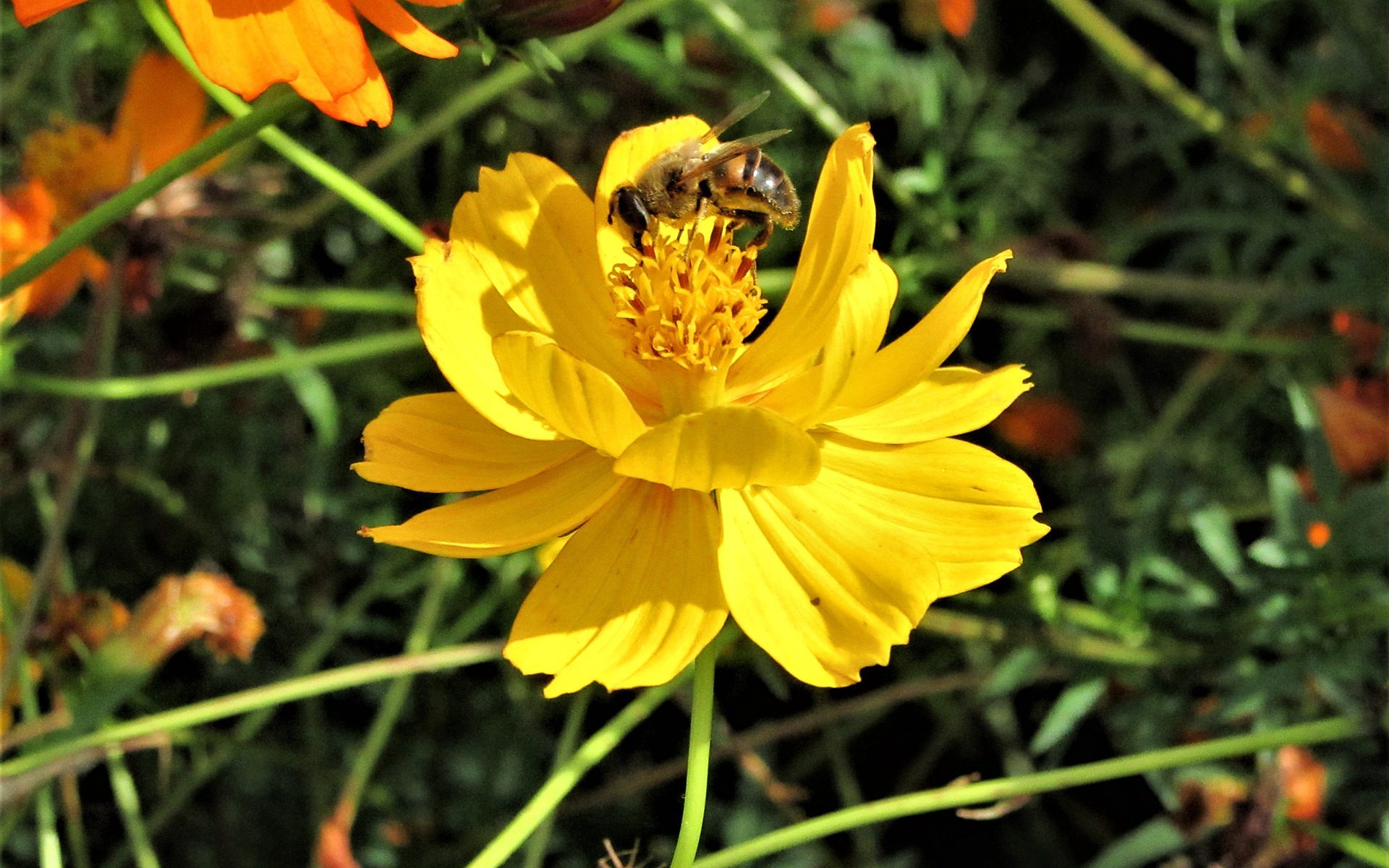
Writing a biology essay may not sound like a very difficult thing to do. In fact, most students really like this subject. The problem is not that you can’t write a good paper on a topic in biology. The problem is with finding excellent biology research topics. Now, you may be wondering why you would want to invest so much time into finding great biology research paper topics. After all, what you write in the essay matters more than the topic, right? Wrong! We are here to tell you that professors really appreciate interesting and unique topics.
And it makes a lot of sense, if you think about it. If you simply pick one of the most popular biology research topics, you will never be able to pique the interest of your teacher. He has read dozens, if not hundreds, or papers on that exact same topic. What you want to do is come up with interesting biology research topics. You want to find topics that none of your classmates are thinking of writing an academic paper about. You will shortly see why this is important. And we will also give you 100 biology topics for research projects that you can use for free – right now!
Biology Research Paper Topics Really Are Important!
It doesn’t matter what area of biology you need to write about. This information applies to everything from zoology and botany to anatomy. The reality is that your professor will really appreciate good topics. And you can rest assured that he or she knows how to spot them. The moment the professor starts to read your paper, he or she will immediately realize that you really did your best to find an excellent topic. And if you write a good introduction paragraph (which contains a captivating thesis statement as well), you are in the best position to earn bonus points.
You may not be aware of it, but teachers are willing to treat great papers with more leniency. This means that you will not get penalized for minor mistakes if you come up with a great topic. In other words, you will get a better grade on your papers if you manage to come up with good research topics for biology. This is a fact and it is based on thousands of pieces of feedback from our readers.
How Do You Choose Good Biology Research Topics?
Choosing research topics for biology can be a daunting task. Frankly, the research paper topics biology students are looking for are not easy to come by. The first thing you want to avoid is going to the first website that pops up in Google and getting your ideas from there. Most of your peers will do the same. Also, avoid topics that are extremely simple. You will simply not have enough ideas to write about. Of course, you should avoid overly complex topics because finding information about them may be extremely difficult.
The best way to find a good topic, in our opinion, is to get in touch with an academic writing company. You will get access to a professional writer who knows exactly what professors are looking for. A writer will quickly give you an amazing research topic in biology.
Eloquent Examples of Popular Biology Research Topics
To make things as simple as possible for you, we’ve put together a list of biology research project ideas. You will find 100 topics on various subjects below. Of course, you can use any of our topics for free. However, keep in mind that even though we are doing our best to maintain this list fresh, other students will find it as well. If you need new topics for your next biology essay, we recommend you to get in touch with us. We monitor our email address, so we can help you right away. Also, you can buy a research paper from our service.
Biology Research Topics for High School
Are you looking for biology research topics for high school? These are relatively simple when compared to college-level topics. Here are a couple of topic ideas that high school students will surely appreciate:
- Identifying Three Dead Branches of Evolution.
- What Is Sleep?
- How Does Physical Exercise Affect the Metabolism?
- A Behavioral Study of Birds.
- How Does Music Affect Your Brain?
- Climate Change and Biodiversity.
- Are Bees Really Becoming Extinct?
- Rainforest Extinction Is Dangerous.
- The Benefits of Organic Farming.
- Can the Brain Repair Itself?
- The Effect of Bacteria on Depression.
- How Do Sea Animals Camouflage?
Research Topics in Biology for Undergraduates
Research topics in biology for undergraduates are more complex than high school or college topics. Our researchers did their best to find topics that are relatively complex. However, each one of the following topics has plenty of information about it online:
- What Is the Mechanism of Metastasis in Cancer Patients?
- How Do Tumor Suppressor Genes Appear?
- How Can We Destroy Cancer Cells Without Damaging Other Cells?
- The Benefits of Gene Therapy.
- Analyzing the Huntington’s Disease (the HTT Gene).
- How Does the down Syndrome (Trisomy of 21st Chromosome) Appear?
- Analyzing the Brain Activity During an Epileptic Seizure.
- How Are Our Memories Formed and Preserved?
- The Effect of Probiotics on Infections.
- Analyzing Primate Language.
- Analyzing Primate Cognitive Functions.
- The Link Between Darwin’s Theory and Biology.
Biology Research Topics for College Students
Biology research topics for college students are of moderate difficulty. They are easier than undergrad topics and more complex than high school topics. While compiling this list, we made sure you have more than enough information online to write the paper quickly:
- Using DNA Technology in the Field of Medical Genetics.
- The Effect of Drinking on Embryonic Development.
- How Are Genes Mapped and Cloned?
- Explain What Genetic Polymorphism Is.
- What Is a Hereditary Disease?
- The Effect of Drugs on Embryonic Development.
- Describing Oligogenic Diseases (like Hirschsprung Disease)
- What Is the Mendelian Inheritance?
- How Transcriptomics and Proteomics Changed Modern Medicine.
- The Risk Factors of Infertility Explained.
- How Does Aging Effect Infertility?
- What Do Ash Elements Do in a Plant?
- Explaining the Pigments in a Plant Cell.
- How Is Photosynthesis Done?
- The Role of Fats in Plant Cells.
- The Effect of Smoking on Embryonic Development.
Cell Biology Research Topics
Some of the best biology topics are cell biology research topics. The scientific community is constantly making progress in this area, so there is always something new to write about. Here are some of the best examples:
- What Is Regenerative Medicine?
- A Closer Look at Tissue Engineering.
- Discuss the Future of Regenerative Medicine.
- Analyzing Therapeutic Cloning.
- The Pros and Cons of Creating Artificial Organs.
- How Do Cell Age?
- Can We Reverse Cell Aging?
- Advances in Cell Therapy.
- What Is Cell Adhesion?
- Explaining Cell Division.
- What Is Cellular Metabolism?
- Describe Active and Passive Transport in Cells.
- What Are Cell Plastids?
Evolutionary Biology Research Paper Topics
If you want something more complex, you can try your hand at writing on evolutionary biology research paper topics. As with all our topics, you will be able to find a lot of ideas and information online. Here are our picks:
- Where Did Plants Come From? (The Evolutionary Theory)
- Explaining the Host-parasite Coevolution.
- How Did Parasites Evolve over Time?
- What Is Natural Selection and How Does It Work?
- Explain Sexual Selection.
- Explain Sexual Conflict.
- How Did Our Immune Systems Evolve?
- How Do New Species Appear in the Wild?
- The Evolution of Cell Respiration.
- What Is the Hippo Pathway? (Developmental Biology)
Various Topics
Antibiotics resistance, agriculture and cloning are hot subjects nowadays. Your professor will surely be interested to learn more about biology research topics. Here is a mix of topic ideas from our established community of academic writers:
- The Problem of Using Antibiotics on Large Scale.
- Examining the Effects of Salt on Plants.
- What Is DNA Technology?
- The Effects of GMOs on the Human Body.
- How Is the Quality of Antibiotics Controlled?
- How Are GMO Food Crops Created?
- The Effect of Veterinary Antibiotics on Humans.
- The Allergic Reactions to Specific Antibiotics.
- A Look at How Penicillin Works in the Human Body.
- How Are Antibiotics Obtained?
- What Are Natural Biochemicals with Pest-repellent Properties?
- The 3 Most Toxic Effects of Antibiotics
- How the Human Body Develops Resistance to Antibiotics.
- The Impact of Biology on the Us Agriculture.
- What Is the Green Revolution?
- Analyzing the Minerals in the Plant Cell.
- Analyzing Muscle Development and Regeneration
- The Uses of Cancer Stem Cells.
Marine Biology Research Topics
There is a lot of talk about global warming, about microplastics in our oceans, and about endangered marine species. This means that marine biology research topics are a very hot topic today. Here are some of our best ideas:
- Can GMO Organisms Break down Oil after Maritime Accidents?
- Pollution-absorbing Bio-films.
- Microbes That Can Absorb Toxic Compounds in the Water.
- Can We Really Use Bioluminescence?
- How Is Bio-diesel Created?
- Analyzing the Coral Reef Biology.
- Why Is the Lobster Population Dwindling?
- The Effect of Mass Fishing on the World’s Oceans.
- Global Warming and Its Effect on Marine Microorganisms.
Molecular Biology Research Topics
Writing about molecular biology research topics is not easy. However, it’s a foolproof way to get a top grade. Your professor will really appreciate your willingness to write an essay about a complex topic. Just make sure you know what you are talking about. Below you can find some of the best topics:
- How Is Insulin Produced?
- How Is the Growth Hormone Produced?
- Analyzing the Repropagation of Translation.
- What Is DNA-telomerase?
- The Process of Sequencing Nucleotides in DNA.
- What Is Telomerase?
- The Link Between Telomerase and Cancer.
- The Link Between Telomerase and Aging.
- How Does DNA Forensics Work?
- Describe the Process of Protein Metabolism.
There is no such thing as easy biology research topics. When the topic is too simple, you end up getting penalized. You can’t write 500 words about it without straying away from the subject. Also, no matter how interesting the topic may be, you should make sure that the essay is written perfectly. This means that not even interesting biology research topics can save you from a bad grade if you fail to follow all applicable academic writing standards.
Find it hard to cope with your college paper? Great news! Use promo “ mypaper20 ” and enjoy 20% discount on a biology writing assignment from our profs!


250+ Best Biology Research Topics for College Students
Photo from unsplash.
Originally Posted On: https://myhomeworkwriters.com/blog/best-biology-research-topics/
When writing a biology research paper, you need to choose insightful biology research topics. The process of selecting the best topics related to biology is challenging for most students.
Biologists study different kinds of organisms, from bacteria to large whales. This interesting science requires you to skillfully select an exciting topic that will enable you to craft a compelling research paper.
Biology is known as the science of life, and it covers a wide range of topics. Read on to find topic ideas on various areas in biology
Biology research topics for high school
There is a wide range of biology topics, from microorganisms to big organisms in plant and animal kingdoms. You can choose a topic that interests you and familiarize yourself with it. The following are biology topics for high school you can use in the brainstorming process
- Compare different types of cells that living things produce
- How was hereditary discovered, and who discovered it?
- Compare the cell structure of two plants
- Discuss the function of enzymes in the body
- Explain the process of photosynthesis. How carbon dioxide is converted into oxygen
- Discuss the process of metabolism in the human body
- Meiosis vs. Mitosis. Explain the difference
- How does gene inheritance work?
- Explain the DNA structure
- What is PCR, and how is it useful?
- Discuss the advantages and the disadvantages of cloning
- Explain natural selection that leads to survival for the fittest
- Explain the evolution theory
- Discuss how species in the world are related
- How do organisms get nutrition?
- Discuss the extinction of dinosaurs. Do they have relatives today?
- Discuss the transmission of information in the nervous system
- What are the mechanisms of the carbon cycle?
- Discuss the impact of biodiversity
- Discuss population regulation and factors involved
Biology research topics for college students
You can write a college research paper on tiny organisms in the field of microbiology. These tiny living things consist of microbes like bacteria and fungi.
When scientists study microbiology, they find solutions to medical and environmental issues. Here are biology research topics for college students
- Discuss resistance in microbes
- Discuss the human immune system and the role of bacteria
- What are the different types of microbes?
- How can microbes be useful?
- Discuss how microbes are involved in soil pollution
- What are some of the agents that can be used to kill bacteria?
- How does yeast work? What are its advantages and disadvantages?
- Virions vs. viroids. What is the difference?
- What are the functions of cellular agents?
- Discuss the biochemical found in fungi?
- Discuss the causes of respiratory conditions in the body
- How can stress affect the human immune system?
- Why are vaccines important?
- Discuss the structure of a molecule
- Discuss the importance of microbiology in science
- What are the advantages of microbes?
- What happens when there are microbes in food?
- Explain the process of making yogurt? What is the role of bacteria in this process?
- Discuss the application of microbial
- What are the groups of protozoa?
Human biology research topics
Human biology is an interesting topic that involves the study of people and populations. When you are writing your biology research paper, you can focus on two of its major parts: anatomy or anthropology.
Anthropology is the study of human evolution , while anatomy is the study of the human body structure. The following are good biology research topics on human biology
- How does the respiratory system function?
- How does anemia affect the body?
- Discuss human population and its history
- Discuss anthropology in relation to health
- What type of information do you gather from reading bones?
- Discuss human movement
- Discuss nutrition and its effects on the human body
- Explore psychology and how it influences the health of human beings
- Explain how the brain can control human behavior
- Discuss the bone structure
- Explain the functions of kidneys in purifying blood
- Explain the regulation of muscle movement in the body
- What are reproductive technologies?
- Discuss the functions of the human skeleton
- Explain the functions of the cerebral cortex
- Discuss the relationship between the brain and hormones
- What are the functions of vitamins in the body?
- Discuss the composition of blood
- Discuss how the heart beats and things that can interfere with a heartbeat
- Discuss the growth of the human population
Cellular biology research topics
A cell is the basic unit of any living thing. Scientists study cells and investigate their lifecycle and vital functions. This involves the chemical processes that happen in the cell.
You can write interesting biology topics for presentation in this field. Below is a list of relevant topics
- How can disease affect growth?
- How much protein does the body need?
- Explain the process of how cells can heal bones
- What are the ethical issues concerning stem cells
- How do cells communicate?
- How does the environment affect DNA?
- What can cause cell deformation?
- Can the process of aging be reversed?
- How do brain cells receive information?
- How does the brain store memories?
- Discuss the shape of cells of someone with sickle cell anemia
- Discuss the advancement of molecular research
- Discuss the movement of cells in the body
- Should glaucoma be treated using surgery?
- How are cells regenerated in the body?
- Discuss diffusion in cells
- What are the different cell types? And what are their functions?
- Discuss DNA translation
- What is the role of dead cells?
- Explain protein biosynthesis
Environmental biology research topics
The field of biology that deals with the environment ensures a harmonious coexistence between human and nature. This field also focuses on pollution and waste disposal, for example, the disposal of wastewater. Below are topic ideas that can help you craft a compelling paper on environmental biology
- Explain the effects of light in water
- What are the functions of a dam, and how is it helpful to the environment
- Discuss the effects of deforestation
- What causes desertification?
- Discuss the role of insects in pollination
- Are there insects that are nutritious and good for human consumption?
- How to properly dispose of wastewater
- What causes the number of sea fish to reduce?
- Explain the best way to dispose of garbage
- The importance of biodiversity conservation
- What is the role of warms in the ecosystem?
- Discuss the conflict between human beings and wildlife
- Are there toxic algae? What causes them to grow?
- What are the causes of air pollution?
- Discuss the causes of pollution in the sea
- Discuss the impact of genetically modified crops
- Discuss the risks of air contamination
- Explain the benefits of natural gas to the environment
- Explain environmentally friendly ways of conserving energy
- Discuss human activities that cause water pollution
Marine biology research topics
Many living things underwater, including in seas and oceans, have not yet been discovered. The study of life underwater encompasses all living organisms underwater or close to a water body.
You can write an interesting research paper that will reveal the mysteries in the deep seas. Here are topic ideas you can consider
- What is the best technology you can use to study marine life?
- How do dolphins communicate?
- How are activities in water affecting whales?
- What are the advantages of living near the sea?
- How do animals living near water camouflage?
- How do living things inside water live together?
- What are the causes of high mercury in fish?
- What is overfishing, and what are its consequences?
- How does high temperature affect animals living in water?
- How do penguins survive? Explain their strategy?
- How does seafood affect life underwater?
- What is the role of bacteria in the sea?
- Are there invasive species? Discuss their types
- What is the role of birds in marine life?
- Discuss how starfish feeds in water
- Discuss the formation of coral reefs
- How can fish farming help boost the number of fish in the sea?
- Explain how whales evolve
- What methods can the government use to regulate fishing?
Plant biology research topics
When writing a plant biology research paper, you will cover different plants. This includes trees of different species to algae of all shapes and sizes.
This type of research helps to improve food and medicine, and conservation. Here are biology research topics you can select
- Discuss the most common causes of disease in most plants
- What are the advantages of studying plants?
- How can human beings take care of plants around them?
- Discuss the various types of toxic plants
- Do flowers have a defense mechanism?
- Discuss why and how trees lose their leaves
- Discuss some of the nutritious plants
- Explain how carnivorous plants eat
- How do plants purify the air?
- Explain how to preserve plants that are almost extinct
- Discuss the plant kingdom and problems associated with it
- Discuss the structure of a plant root
- What are some of the plants that have medicinal value?
- How does sound affect the development of plants?
- Discuss starch production in plants
- Discuss the growth of weed and why it is excessive
- How to identify various maize plant diseases
- Explain how light affects plants
- Discuss desert plants and how they survive
- Discuss the growth of a bamboo plant
Interesting biology topics for project
Every living thing goes through change. The changes can be experienced in various areas like ecology, paleontology, or genetics. You can cover these areas in your biology research proposal topics. Here are examples
- Discuss the changes that take place in a butterfly
- Discuss the changes that take place in an eagle
- How is sexual reproduction beneficial?
- Why is cancer persistent?
- Discuss how evolution affects society
- How can a disease evolve?
- Discuss the human race. Does science support it?
- How do people age?
- Does the environment affect evolution?
- How does genetic drift affect variation?
- What are the challenges of modern synthesis?
- What are the main factors that cause disease?
- Discuss the theory of evolution
- How do you determine the age of a tree?
- How does the life history of biology influence the evolution of species?
- How can a species achieve fitness?
- How do bees communicate?
- Discuss animal movement
- Discuss the evolution of animal psychology?
- Compare endotherms vs. ectotherms and how they evolve
Developmental biology research topics
Animals and plants go through the developmental process, and their features change. All living things grow from a single cell to a full organism in the developmental process.
Biologists study and track these developmental changes. You can write biology research topics about interesting facts when organisms develop from one stage to the next. The following are topic ideas you can select and brainstorm
- Describe the development stages of a baby
- Describe the growth stages of a plant
- What causes the cognitive disorder? How did it originate?
- Birds become territorial. Explain why
- What are developmental mechanisms?
- Are older people more likely to get cancer?
- What is the relationship between genes and body structure?
- How do bones develop?
- Describe the physical changes in boys and girls as they grow into adulthood
- Describe the development stages from a zygote until birth
- Discuss metamorphosis
- Discuss the changes that take place from a tadpole to a frog
- Can explosions and other external factors interfere with human physical development?
- How are new cells produced in a plant?
- Discuss the development process in a fish
- How do plants evolve?
- How does a flower develop into a fruit?
- Discuss the development of a zebrafish
- What are the features of desert plants that make them adapt to harsh environmental conditions?
- How do camels develop and adapt to living in the desert
Epidemiology and population biology topics for research paper
The topic of epidemiology investigates health-related issues and the causes of diseases in a population. Epidemiologists analyze health issues and injuries.
The study of population looks at interactions and environment of populations. This background information will help you decide if you are interested in writing a research paper on epidemiology and population. Here are science research topics in this field
- Discuss the development of population
- How do diseases spread in humans?
- How can the spread of disease be contained?
- Discuss the diseases that heavy metal pollution can cause
- Discuss how coronavirus spread
- Describe the causes of malaria
- What is Asian Carp, and how does it affect the marine population?
- What are the different kinds of population distribution?
- Discuss the effects of polio?
- Discuss ways of achieving moderate growth in population
- Discuss predator-prey.
- Discuss resource competition and avoidance mechanism
- What is a symbiotic relationship?
- What are the achievements in reducing the spread of HIV/AIDS ?
- How to deal with HIV stigma and how the stigma contributes to the spread of HIV
- Discuss the relationship between HIV and TB
- Explain how poverty contributes to the spread of HIV in developing countries
- What are the factors that lead to an increase in population growth?
- Explain how depression affects society
- Explain how to prevent an unborn child from contracting the HIV virus
History of biology research topics
Humans in the past had basic biology knowledge that was helpful in finding food and keeping domestic animals. This was before modern scientific studies emerged. Here are some interesting topics that you can write about the history of biology
- Explain the knowledge of medicine in Ancient China
- Discuss the history of Agriculture in Africa
- Discuss the origin of life
- Explain how historically, plans were used as medicine
- Explain animal classification
- Discuss the discovery of penicillin
- How do animals communicate?
- What are the relationships between different organisms?
- What is the contribution of Albertus Magnus to botany?
- Discuss how Italy has contributed to biological studies
- Explain the factors that lead to the development of biology
- How did modern anatomy originate?
- Explain cell theory
- When was the microscope invented, and who invented it?
- What is GMO? Explain the benefits of GMO
- Discuss how hereditary was discovered
- Discuss how blood circulation works and who discovered it
- Discuss the scientific development and biotechnology in Europe
- Discuss the latest biotechnology
- Explain the role of bioinformatics regarding the progress of genetic analysis
Biology research topics on hormones and behavior
You can write a research paper on how hormones can influence a person’s behavior. This is an interesting field with scientific evidence that will uncover how hormones can influence moods and wellbeing.
You can discuss this topic with other students who can relate to some conditions. Below are topic ideas you can consider
- The significance of a particular hormone in the body
- How is cell structure related to the resistance of antibiotics?
- How do hormones affect a person’s behavior and mind?
- What is the connection between hormones and depression?
- Discuss pregnancy and hormonal changes
- Discuss how hormonal changes can lead to psychological disorders
- Describe the effects of bipolar disorder
- What is the relationship between oxytocin and the reaction of fear?
- What are some of the diseases related to the endocrine?
- Discuss hormonal control and the reproductive system
- Discuss hormonal influence
- Is there a relationship between endocrinology and metabolism?
- How can cardio exercises affect hormones?
- Discuss hormones and women’s mental health
Research topics on the immune system
When writing about the immune system, you will be discussing the defense system in the body. The immune system is the defense mechanism against diseases.
This makes the topic important and interesting. Here are science research topics you can brainstorm
- Explain the resistance capability of the immune system
- What are the agents of the immune system, and how do they work?
- When the immune system is not functioning properly what are the diseases that can occur
- What is the relationship between stress and immunity?
- Discuss the various allergic reactions that asthma causes
- What is immunotherapy, and how can it influence the human body?
- What are the benefits of vaccination?
Easy biology research topics about animals
You can write a compelling research paper that focuses on one animal or species. Here are topics you can select
- What are the factors affecting animal growth?
- Discuss obesity in pets
- Is it ethical to test beauty products on animals?
- Discuss the study of bird’s behavior
- What are the camouflage mechanisms in sea creatures?
- What is the relationship between veganism and meat production?
Biology research topics on ecology
When you write about ecology topics, you will be discussing how living things relate to each other in their environment. The following are exciting topics that you can use to uncover organisms and their environment
- What is the relationship between living things and the environment?
- What ways can plants adapt to changes in the environment?
- What is the relationship between change in environment and different animal species?
- What are the different ways of protecting wildlife?
- How to protect rare species
- Discuss the methods of stopping animal extinction
- What are the different types of pollution?
- Discuss why sustainability is important in wildlife
- Discuss ecotourism and its benefits
- What is the impact of the extinction of bees?
- How do oil spills in the ocean affect water animals?
- What are the benefits of organic farming?
- How does climate change affect animal behavior?
How to choose topic for biology research paper?
Biology research topics are many from organism structure, chemical processes, and interactions. These topics are extensive. You can conduct in-depth research to produce an insightful paper.
It is important that you choose an interesting topic to ensure you deliver value to your readers. The process of selecting a topic can be difficult for many students. The following steps will enable you to choose a topic that will help you produce a well-researched and informative paper
1. Brainstorm biology research topics
Brainstorm topic ideas to discover interesting biology topics for presentation. Research and create a list of ideas. Look at each topic and answer the following questions
- What is your opinion about each topic? Is your opinion strong enough to inspire you to write about it?
- Have you read an article or listened to news about a topic that has made you curious?
- Do you have the desire to research the information further after reading or hearing about it?
- What is your personal view on the topic?
After answering the questions you can choose a research topic for your paper. The brainstorming stage can be time-consuming as you analyze one topic after the next.
Do not be in a hurry to make a decision. Allocate enough time for it. You can brainstorm for one or two days before you decide on a topic.
After selecting your topic, wait for a day. Look at your topic again, and if you are fully convinced that it is the best topic for your paper, you can start researching.
2. Choose an interesting biology research topic
Biology encompasses extensive fields that require in-depth research. Choose a topic that interests you.
An interesting topic will motivate you to research and write your paper faster. Your audience will enjoy reading an informative paper.
3. Narrow down your topic
Science research topics can be too broad for you to manage unless you narrow them down. Select a narrow topic that you can handle and ensure you can find enough information to support it.
For example, biology is an extensive topic, but you can choose genetic researches biology topics. This is a field in biology that is narrow enough for you to handle.
4. Write the keywords
Write a list of keywords that describes your topic. This way, you can use these keywords to search for relevant information in the databases. Find broad and narrow terms and key concepts that are useful for your work.
5. Explore examples about your topic
Look at relevant examples about your topic and get insight into the primary matter. There are many articles with different examples.
It is important that you understand the main message. For example, environmental biology research topics cover areas like
- Thermoregulation
- Environmental pollution
- Hypothermia
Look at each sub-topic and choose the one that interests you. This will allow you to use relevant examples in your paper.
What is the best topic in biology?
There are different areas you can research in biology. You can find the best topic in biology when you identify the areas that interest you. The following is a list of areas you can consider
1. Microbiology
Microbiology is the study of tiny organisms such as viruses. Some of the viruses that scientists study cause diseases.
This field is closely linked to a different field called immunology. You can choose to research this topic if you are interested in tiny living things or causes of diseases.
2. Anatomy
When you choose to write a paper on anatomy, you will focus on tissue structure and organs. You can choose this area in biology if you find researching about the human body tissues interesting
3. Environmental biology
You may be interested in sharing with your audience different ways of supporting the environment. Environmental biology topics will enable you to find out information on how human beings affect their environment. You will uncover the reaction of organisms to the surroundings
4. Marine biology
You may want to write about life underwater. The best topics in this field will come from marine biology.
You can write about any organism in water, from bacteria to the whale. You can also write about animals living near water.
5. Botany
This is the study of plants. You can get the best topics on anything that deals with trees, flowers, and shrubs, among others. You can write about the different properties of plants and how they need sunlight and water to live.
6. Biology research topics in evolution
All living things are constantly evolving. They can merge, create or delete genes.
You may be interested in this area of biology and how the changes are monitored. You can brainstorm the best topics in this area.
7. Developmental biology
This area of biology deals with tissue regeneration and the growth of cells. You can brainstorm topics that excite you in this field.
8. Epidemiology
This is where scientists study health and how diseases spread among the population. Understanding where diseases originate and how they are transmitted may interest you. This means that you will need to select the best topics in the field of epidemiology.
Biology encompasses large areas, and writing a research paper on biology research topics may seem like a daunting task. How to start writing a biology paper requires you to understand the writing process .
How to write a biology research paper
Start with planning so you can work fast and save time. A structure will help you write a well-organized research paper quickly.
Structure of a biology research paper
When you structure your research paper well, you will have a good flow of ideas. A structure is a framework that allows you to organize your thoughts logically and present them coherently.
Your readers can follow your line of thought from start to finish. It acts as a guide to your writing.
A biology research paper structure allows you to write your main points so that you do not forget them when finalizing your draft. The following are elements that you should include in your biology research paper structure
1. Title
Creatively craft an interesting title that will attract your audience even before they get to the introduction. You can use an opening statement or a question depending on the biology research topics .
2. Abstract
An abstract should present a short summary from the beginning to the end of your paper. Your abstract should reflect the objective of your paper.
Ensure readers understand what your research paper entails. They should also understand the results of your research.
3. Introduction
The introduction section introduces your topic and describes what your paper will try to achieve. It should start with a hook as the first sentence of the paragraph..
A hook encourages your readers to read your entire paper. The sentences that follow should provide some background information about your topic. The final one or two sentences of the introduction should be your thesis statement.
4. Thesis statement
A thesis statement is the foundation of your biology research paper. Your thesis should reflect your main arguments.
It guides your writing process, and each point you discuss should be connected to your thesis statement. Make sure your thesis is clear and concise.
5. Body paragraphs
The body section of your paper is where you provide detailed information about your science research topics. A topic sentence in each paragraph will introduce a sub-point that is connected to your thesis statement.
The sentences that follow will support your point with detailed information, including biology research paper example and evidence. The final sentence in each paragraph is the concluding sentence.
It finalizes the discussion point and seamlessly transitions the reader to the next point. The body paragraph of your paper should include the following
You will need to explain how you carried out tests in your research. Give the procedure you used. Include the methods of data collection and analysis.
Present results you obtained from your research. Results can be figures or observational results.
You will need to discuss the results you have presented and anything that may have affected them. You can give your opinion regarding the results and if they meet your expectation from your theoretical knowledge.
Cited works
Make sure you properly cite your work and include a reference section on your paper. Follow your professor’s instructions on how to cite your work and the format you need to use.
The most common formats are APA, MLA, and Chicago . Formatting your work properly will ensure you get higher marks.
6. Edit and Proofread
After you finish writing your paper, ensure you proofread and edit accordingly. Submitting your work without proofreading it can cause you to lose marks because of grammar, spelling, and punctuation errors.
Check your examples and make sure they are relevant. For example, if you write a biology research paper on genetic researches biology topics, your examples should adequately explain the topic.
Key takeaway
Biology is an interesting science subject. You can find many topics to write about. The challenging part is selecting the best biology research topics.
To get an interesting topic you will need to know “what are the best research topics?” This way, you can brainstorm different topic ideas and select the one that is interesting to you and your audience.
You will need to ensure the topic is not too wide for you to handle or too narrow for you to find adequate information. To to get best biology research topics for your research paper, pay for write my research paper expert.

No Comments
Sorry, the comment form is closed at this time.
Biology Research Projects for High School Students

Indigo Research Team

Are you looking for biology-related topics for your high school research project? If yes, then you have come to the right place.
We do understand that finding the right topic for research that connects with you can be challenging. This is particularly true for the field of biology since it is very diverse. A good biology project needs to have enough scientific research backing it so that it helps support or disprove your hypothesis.
This article is all about easy and interesting research projects designed just for keen high school students. We'll explore topics in the domain of the human body, ecosystems, diseases and their treatments, and more.
Biology Project Ideas For High Schoolers
Here's a carefully curated compilation of cool biology topics to inspire and kick-start your creativity. We have broken the list into categories so that it's easier for you to navigate projects that fall into your interest.
Human Body Project Ideas
The human body is said to be the most complicated biological machine, which opens room for good research topics . Let's check out some exciting project ideas about the human body.

1. Exploring the Rate of Cognitive Decline at Different Elevations
At higher altitudes, there's a reduction in oxygen partial pressure, impacting blood oxygenation and potentially influencing brain function. If you've ever experienced altitude sickness, you've felt the effects of this phenomenon. The decrease in atmospheric pressure at elevated altitudes results in lower partial pressures of gases, including vital oxygen necessary for our bodily functions.
This project can investigate the impact of sudden increased elevation, such as climbing Denali, on brain health and cognition. Additionally, you can also explore whether continuous exposure to high elevations might contribute to an increased risk of dementia. This biology research project can also analyze published studies examining the correlation between altitude and cognitive brain functions.
2. Making a Visual Guide for Blood Vessel Formation
Create an illustration using online images to showcase the process of blood vessel development. In this project, you can search existing research to understand the current knowledge about how blood vessels form and grow. Then, you can use this gathered information to design a graphic explaining how the network of blood vessels, known as vasculature, takes shape.
This is one of the most interesting human biology project ideas that aims to convey scientific concepts visually, making the information more accessible to a broader audience.
3. Exploring Bacterial Communities in Different Homes
If you’re looking for immune system project ideas, this might be it for you. Bacterial microbiomes are groups of bacteria living on or around living things. These communities of tiny cells are essential for our health, helping with digestion and keeping our immune system in check. The microorganisms in our body outnumber our own cells by approximately 10:1. This project mainly focuses on figuring out how the bacteria on our skin differ between people from different households. To execute this biology project, you can create various bacterial media at home and select other microorganisms.
Note: While conducting research, avoid abrasions, needle sticks, or cuts to avoid getting bacterial infections. Wearing safety goggles, a face mask, or a face shield can help keep you safe. It is also important after the experiments to wash your hands with soap and water and disinfect surfaces that may have been in contact with the bacteria. At the end of your experiment, fully sterilize everything before disposal.
4. Understanding the Control of Biological Clocks
Next up in the human biology project ideas is understanding how biological clocks work. Sleep is managed by two main processes: the circadian clock, which aligns sleep patterns with the day-night cycle, and sleep homeostasis, which tracks sleep debt as a way to recover from sleep loss.
You've probably heard about the circadian rhythm, our body's internal clock. Circadian sleep regulation is crucial for animals to predict when they should be awake or sleepy each day. These processes can be controlled at different levels, such as genes, proteins, and neurons in the clock.
This biology research topic can focus on exploring the regulation of circadian clocks at various genetic levels. This project will help you develop important scientific skills in two areas: the first one is learning how to read and summarize information from scientific articles efficiently, and the second is finding effective ways to present the gathered information.
5. Exploring the Science of Getting Older
Exploring the science of getting older is one of the most groundbreaking human biology research topics. Growing older is the main factor that increases the risk of various diseases like cancer, neurodegenerative conditions, and sensory impairments. Recently, researchers began to unravel the mysteries of ageing and discover ways to slow down or potentially reverse its effects.
What are the signs of ageing? How do scientists study the process of getting older? How do human lifespan and ageing compare to other animals? Can we actually put a halt to or undo the impacts of ageing? What progress has been made in this area? You can delve into these topics for biology projects or brainstorm other inquiries about the biology of ageing.
Animals, Plants, and Nature Project Ideas
Next up, we’ll discuss the biology research projects related to animals, plants, and nature. These environments are very close to human and they are definitely very interesting to explore.
1. Examining the Impact of Genetically Modified Mosquitoes on Disease Rates
In some areas, like the island of Príncipe, many genetically modified mosquitoes are set free every week. These mosquitoes are modified so they can't easily spread diseases like dengue fever, Zika, and malaria. They're released into nature to mix with regular mosquitoes that carry diseases. But only some agree on whether this is a good idea, as there could be unexpected environmental effects.
You can conduct research on what could be the good and not-so-good things about this. This biology project is about researching articles and videos to understand how and why scientists use these mosquitoes to reduce diseases and to understand exactly how this works. You may even want to explore exactly how scientists create these genetically modified mosquitoes.
2. Effectiveness of Ocean-Protected Zones
Ocean-protected zones, known as Marine Protected Areas (MPAs), are specific parts of the sea or coastal waters set aside to conserve marine resources sustainably. Governments, NGOs, or other groups create these areas, and they can vary from entirely off-limits "no-take" zones to zones with controlled fishing or other activities. While MPAs can help manage resources wisely and safeguard biodiversity, there are various reasons why they might need to be revised.
For your marine biology project ideas, investigate the factors that could make MPAs less effective. Then, devise an alternative plan for creating, modeling, and implementing an efficient Marine Protected Area.
For an insightful example of student-led research in this area, explore this project on Applications of Australian Native Aquatic Plants in Purifying Wastewater Sources at Indigo Research .

3. Learning from Nature: Can Animals Provide Solutions?
Exploring the wisdom of the natural world, you can delve into the intriguing question: Can animals offer us innovative solutions to complex problems? How can studying how lizards and newts regrow their limbs help us make wound treatments better or even help someone who is paralyzed from injury to their spinal cord? Why is tilapia skin useful for burns? Explore these new topics in biology on how animals contribute to shaping modern medicine and its future possibilities.
Also, consider if there are any ethical worries tied to these discoveries and developments. If there are, what are they, and should we be concerned?
4. Understanding the Impact of Climate Change on the Habitats of Rare Species
Climate change, marked by factors like global warming and prolonged drought, threatens some of the rarest plants and animals on our planet. It is crucial to figure out how the future living spaces for these rare species might change so we can focus our efforts on preserving specific areas.
In this project, you can choose a rare species you're interested in and gather online data about where it currently exists. This is a great idea for a biology research project if you’re interested in the environment, ecology or rare plant and animal species, in which you can find out how to use species distribution modeling to map where it lives now and where it might thrive.
5. Complex Relationships in Coral Reefs
Coral reefs worldwide are struggling, and one big reason is "coral bleaching," making the reefs look white, as you might have seen in the news. Coral bleaching happens when the teamwork between the coral animals and the tiny, helpful algae inside them breaks down. These coral and algae buddies can handle different temperatures, but we don't really know why.
This biological project can be about reading what scientists have researched about this teamwork and determining what factors can tell us when corals might turn white and how well they can handle temperature changes.
Genetic Project Ideas
If you want to base your project on genetics, we have a few ideas you can look at.

1. Understanding the Relationship between Genetics and Height
Epigenetics studies how heritable cellular phenotype or gene expression changes occur without altering the DNA sequence. Such changes are affected by lifestyle and diet. In these biochemical projects, you can analyze the open dataset on identical (or monozygotic) twins to find what biological features are shared between monozygotic twins and which are not. The latter might be affected by non-genetic factors that control these features
You will learn how to use the R tool to look at and analyze data, and use statistical tools to identify significant differences between groups, and, in the end, showcase your research with graphics to communicate it effectively to the audience.
2. Exploring personalized medication
Just like fingerprints, each of us has a unique genetic code that determines things in our body, like our hair color, height, and eye color. Even diseases like cancer have their own unique codes inside the malignant cells that define important features of the a tumor.
For decades, everyone with a specific cancer has been treated the same way with surgery, chemo- or radiotherapy, even if their malignant cells are different. That's where one of the most interesting biology topics for research, personalized medication, comes in.
It's a new and exciting way to treat diseases. Personalized medicine aims to use the disease's genetic code to customize the treatment to that particular individual. This domain of biology has a lot of published research and a lot of room for new research as well.
One thing you can do for your biology project subject is to pick one disease whose treatment can really benefit from personalized medication and write a research paper on it based on the work of reputable researchers.
3. The genetics of neurodevelopmental disorders
Many neurodevelopmental or psychiatric disorders like autism spectrum disorder or schizophrenia have a strong genetic basis. What genes are involved? What proteins do they produce and what are their functions? How do these genetic changes affect brain development and function? Can this knowledge help scientists develop new drugs to treat conditions like schizophrenia that is still being treated with the same drugs as 50 years ago?
This project will allow you to read exciting research that has been published over the last few years, and learn about genetics and neuroscience, two of the most exciting areas of biology and medicine. You will develop skills in scientific research and ways to present complex ideas to an audience.
Projects based on exciting biological topics allow students to explore the science of living things and get hands-on experience with everything they learned in high school. From investigating altitude's impact on cognition in human beings to exploring genetically engineered mosquitoes, these projects help in understanding biology.
Students develop critical thinking and research skills in each biology project, apply classroom knowledge, and communicate findings effectively. These projects provide students the freedom to explore individual interests and pave the way for future scientific endeavors.
If you're interested in conducting biology research, consider finding a mentor who can guide you through your innovative biology project ideas. At Indigo Research, you can start your research at any time of the year, building on the knowledge and skills you've acquired from your internships or academic coursework.

Summer II 2024 Application Deadline is June 26, 2024.
Click here to apply.

Featured Posts

National Science Foundation's High School Internship - 7 Reasons Why You Should Apply

10 Free Summer Programs for High School Students in New Jersey (NJ)

8 Summer STEM Programs for High School Students in Virginia

How to Write Your Personal Statement: A College Essay Expert’s Step-by-Step Process for Success

10 Mentorship Programs for High School Students in 2024-2025

10 Computer Science Camps for High School Students

7 Robotics Summer Camps for Middle School Students

9 Non-Profit Internships for High School Students

10 Best Hackathons for High School Students

10 International Olympiads for High School Students
25 Research Ideas in Biology for High School Students
To create a good research project, you need to start with a good idea! For those interested in biology research, we’ve compiled a list of different good ideas!
Elements of a good research idea:
There are a couple things that define a solid research idea:
You want to make sure your topic is relevant today! This means there should be some gap in knowledge that you are trying to decrease; it shouldn’t be something that’s already been covered by other scientists. It should be significant—this topic should invoke a lot of different questions and thoughts for your reader.
Your interest
Make sure you are researching something that you are personally passionate about! This means you’ll be much more invested in the project and this interest will show throughout, making your work all the more exciting! Don’t pick something that might be relevant today, but that you’ll know you’ll get bored of easily.
Feasibility
A research project should be doable: make sure it is within your capabilities! You want to feel challenged but also comfortable with the idea and have clear methods with which to approach the challenge.
Why research?
Doing research in high school is a fantastic way to delve into your interests. You build incredibly useful skills, learn new ideas, and are given the chance to work with incredible mentors.
A good way to go about picking a research idea and starting your research project is through a mentored program. Those who are selected for the Lumiere Research Scholar Program are given 1-1 mentorship with top PhDs. Below, we share some of the biology research ideas that have been proposed by our research mentors.
Biology research ideas for high school students
Cancer cell research
One of the most relevant and pressing problems today concerns cancer research. We want to better understand cancer so that we can better develop treatments. Although this might seem like a huge topic to give to a high school student, know that your research goal can be something small but effective —for example, better understanding mechanisms contributing to cancer pathogenesis at the molecular level. Because the topic is so large, there are many things you could potentially aim to do:
1. Find the biochemical underpinnings of cancer predisposition syndromes.
2. Analyze biological sequencing databases to understand what makes certain cancers more aggressive.
3. Study tumor progression and how cancer cells invade and interact with other cells.
Suggested by a Lumiere PhD mentor at Cornell University
Cancer treatment research
On the other side of studying cancer, the overarching goal for all scientists is to find treatment methods. There have been so many new trials, hypotheses, and data, in the last few years; investigating different treatments could yield incredibly valuable results.
4. Study cancer immunotherapy: the study of how cancer cells evade the immune system and how we can harness the immune system to battle cancer.
5. Track current progress and limitations of new methods and identify next opportunities.
6. Study how cancer cells can evolve to become resistant to certain treatments that were once effective.
7. Develop methods and workshops to help with early cancer detection (ex. Teach women how to conduct a simple breast exam at home).
Suggested by Lumiere PhD mentors at Duke University and Yale University
Gene editing
A topic more relevant than ever is gene editing and gene therapy, the process of changing regions of cellular DNA. This is a fascinating new area of research, with so many unexplored possibilities . Gene editing is a rapidly growing field with relevancy in disease treatment, food modification, “perfect humans,” ethical dilemmas, and more!
8. Identify disease causing genes in a crop pathogen.
9. Research past and current technologies still in place regarding gene editing; identify challenges still in place and weigh the ethical and social implications of these technologies.
10. Design a CRISPR system to mutagenize an important gene in a plant or animal to improve its health or productivity.
Suggested by a Lumiere PhD mentor at UC Berkeley
Pharmaceutical and disease research
With the recent COVID-19 pandemic, pharmaceutical research has come to the forefront of the world. If you’re interested in drug discovery, development, and disease treatment, this is the area for you. There are many interesting questions to explore here, some that can be applied to your local community, some to the global community.
11. Identify technical challenges in mass vaccination campaigns. Students can review existing data from public health organizations as well as current scientific literature on new vaccine delivery technologies.
12. Analyze barriers in the clinical translation of biomaterials by conducting case studies on failed products and reviewing clinical trial data.
13. Conduct surveys to study diversity of immune responses to viruses.
14. Design specific operating procedures for a pandemic-prepared taskforce.
15. Research novel drug delivery devices aimed at a certain disease of interest, such as Type 1 Diabetes. Go in-depth into this disease!
16. Compare gene expression profiles of healthy vs diseased cells for very rare disorders.
Neuroscience research
The brain will always be an area of endless study for biologists. Research in neuroscience is always particularly relevant for our world, as it concerns the way our human brain operates and its impact on behavior and cognitive functions. Students who are interested in brain development, mental health, behavior, and more will find this topic interesting!
17. Review recent advances in neuroscience and the potential benefits and costs of new tools and techniques.
18. Discover different theories of learning and memory. This can include the use of different clinical studies designed by the student.
19. Learn about the scale and types of neural analyses used to record brain activity; compare normal states to diseased states.
20. Analyze the effects of alcohol and drug addiction on the brain.
Suggested by a Lumiere PhD mentor at Stanford University
Microbial studies
Harnessing the power of microbial cultivation is becoming a hot topic in many areas of application, particularly that of the environment. Microbial studies have recently probed into producing therapeutics and addressing the issue of industrial waste disposal. Students may confront various real-world problems in their investigations:
21. Study current microbial applications for plastic recycling or bioplastic production and develop your own proposal.
22. Compare data from existing techniques of environmental biotechnology and bioremediation: what looks to be most effective?
Suggested by a Lumiere PhD mentor at University of Pennsylvania
Developmental biology
Animal lovers will love this one: developmental biology is the study of the process by which animals and plants grow and develop. It’s one of the fastest growing and most exciting fields in biology and really opens the door to all different kinds of research. Students will find many exciting ideas to engage with:
23. Study the different factors that influence fertility and development in a specific organism: how can this be applied to humans?
24. Analyze how the collection of microbes living in a host organism (the microbiome) affect the physiology of this organism.
25. Study how different chemical exposures during fetal development can affect an organism’s growth, from limb development to sex determination.
Suggested by a Lumiere PhD mentor at Johns Hopkins University
There are hundreds of different ideas we didn’t have the opportunity to list here, but we hope we’ve inspired you to get started with this list! If you are passionate about biology and hope to do advanced research under expert mentorship, consider applying to the Lumiere Scholar Program. You can find the application form here .
Amelia is a current junior at Harvard College studying art history with a minor in economics. She’s enthusiastic about music, movies, and writing, and is excited to help Lumiere’s students as much as she can!
Image source: Unsplash
Opmerkingen

199+ Innovative Biology Research Topics For Students – 2024
Writing a biology research paper is one of the most complicated assignments during college study. The reason behind this is that it requires deep analysis of a scientific topic that becomes time-consuming.
If you are also assigned to write a biology research paper, three questions you should ask yourself.
- What sources do you have to use to get information?
- What should be my starting point?
- How can I edit my research paper?
But one question you can’t ignore to ask yourself is what topic I should choose for my research paper.
In this blog, we will discuss top biology research topics that will definitely help you to get good scores.
Get the best Biology Research paper help from our professional experts. They will provide you top-notch & Plagiarism-free content within the given deadline at an affordable price.
Tips for Picking the Right Biology Research Topic
Table of Contents
When you know what parts of a subject you like, picking a topic for your research paper gets easier. But, there are some tips from experts that make choosing a topic even quicker. Here are our best tips:
- Look at what important things are happening and what’s new in the field you’re interested in by reading scientific journals, articles, and forums. This will help you see which topics have enough information for research.
- Avoid topics in biology that have already been researched a lot. Your teacher might have read many papers on popular topics, so it’s better to pick something new.
- Make sure your topic is narrow enough so you can cover everything about it and write a detailed paper.
By following these tips, you’ll find the best topic for your biology research paper. And remember, we’re here to help with any writing assignment you have. Just give us a call, and our expert will help you pick the perfect biology research paper topic!
What Are Good Biology Research Topics?
A good biology research paper should challenge readers to think differently and inspire meaningful conversations. Moreover, it must be relevant and have the potential to make an impact on the community.
It doesn’t matter what it’s about – animals, humans, plants, ecology, etc. – as long as it addresses something from a new perspective, makes a new discovery, shows a link between two organisms or phenomena, or potential leads to a scientific breakthrough.
There is great potential to be explored in order to gain a better understanding of life and living organisms. Here are the following good biology research topics.
Here are some really interesting and promising biology research topics to check out. We have cover lots of different areas in biology, giving plenty of chances to find new things and make progress.
Easy Biology Research Topics
- Photosynthesis in plants
- Mitosis and meiosis cell division
- Biodiversity in local ecosystems
- The human digestive system
- Plant adaptations to different environments
- Life cycle of frogs
- Characteristics of different blood groups
- Functions of the human skeletal system
- Adaptation of desert plants
- Fermentation process in bacteria
- Characteristics of different biomes
- Human respiratory system
- Parasitic relationships in nature
- Types of plant cells and their functions
- Reproduction in flowering plants
- Ecological succession
- Importance of decomposers in ecosystems
- Structure and function of plant roots
- Osmosis in living organisms
- Nitrogen cycle in nature
Interesting Biology Topics
- The role of gut microbiome in human health
- Epigenetics and gene expression
- Biomimicry and its applications
- Regenerative medicine and stem cell therapy
- The impact of climate change on biodiversity
- The potential of CRISPR technology
- The biology of aging
- Quorum sensing in bacteria
- Biological clocks and circadian rhythms
- The evolution of antibiotic resistance
- Bioluminescence in living organisms
- Nanotechnology in medicine
- The role of hormones in human development
- Genetic engineering in agriculture
- The impact of plastics on marine life
- The biology of addiction and substance abuse
- The neurobiology of sleep and dreaming
- Evolutionary developmental biology (evo-devo)
- The potential of gene therapy
- The biology of human emotions
Biology Research Topics for High School
- The life cycle of a butterfly
- Enzyme catalysis in biological processes
- The structure and function of the human eye
- Genetic disorders and their inheritance patterns
- Plant tissue culture and its applications
- The role of antibiotics in treating bacterial infections
- Mechanisms of seed germination
- The impact of pollution on aquatic ecosystems
- Biological pest control methods
- The importance of biodiversity conservation
- The structure and function of plant leaves
- The human nervous system
- Cellular respiration in living organisms
- The effects of deforestation on the environment
- The role of enzymes in digestion
- The process of DNA replication
- The importance of vaccines
- The structure and function of the human heart
- The importance of water for living organisms
- The role of symbiosis in nature
Biology Research Topics for College Students
- The molecular mechanisms of cancer
- Bioinformatics and computational biology
- Neuroplasticity and learning
- Genome editing with CRISPR technology
- Sustainable agriculture and food security
- The biology of stress and its effects
- Genetic engineering and ethical considerations
- Biofilms and their applications
- Synthetic biology and designer organisms
- The role of microRNAs in gene regulation
- The biology of infectious diseases
- The impact of air pollution on human health
- The role of proteins in cellular processes
- The neurobiology of memory formation
- The genetics of human behavior and personality
- The potential of plant-based medicines
- The impact of climate change on marine ecosystems
- The biology of cancer stem cells
- The role of gut-brain axis in mental health
- The potential of gene therapy in treating genetic disorders
Biology Research Topics for University
- Bionanotechnology and nanomedicine
- Metabolomics and systems biology
- Bioremediation and environmental biotechnology
- Molecular mechanisms of neurodegenerative diseases
- Protein folding and misfolding disorders
- Genome-wide association studies (GWAS)
- Plant-microbe interactions and symbiosis
- Biological applications of machine learning
- The biology of aging and longevity
- The potential of personalized medicine
- The role of epigenetics in cancer development
- The neurobiology of consciousness and perception
- The impact of microplastics on marine ecosystems
- The potential of gene drives in conservation biology
- The biology of viruses and emerging viral diseases
- The role of non-coding RNAs in gene regulation
- The impact of urbanization on biodiversity
- The potential of synthetic biology in bioremediation
Human Biology Research Topics
- The role of the endocrine system in homeostasis
- Immunotherapy and cancer treatment
- Aging and age-related diseases
- The human microbiome and its implications
- The impact of stress on human health
- The biology of sleep and circadian rhythms
- The role of gut-brain axis in health and disease
- Personalized medicine and pharmacogenomics
- The effects of exercise on human physiology
- The role of nutrition in human health
- The biology of human reproduction
- The impact of environmental factors on human health
- The neurobiology of pain perception
- The role of genetics in human development
- The biology of mental disorders
- The impact of sedentary lifestyle on human health
- The role of the immune system in autoimmune diseases
- The biology of wound healing
- The potential of regenerative medicine in human health
Immune System Biology Topics to Research
- Autoimmune diseases and their mechanisms
- Vaccines and their development
- Allergies and hypersensitivity reactions
- The role of cytokines in immune response
- Immunodeficiency disorders and their treatments
- The gut microbiome and its impact on immunity
- Immune system aging and immunosenescence
- The role of the immune system in cancer
- Transplant rejection and immunosuppression
- The biology of inflammation and its regulation
- The role of immune cells in neurodegenerative diseases
- The impact of stress on the immune system
- The potential of immunotherapy in treating autoimmune diseases
- The role of the immune system in pregnancy and fetal development
- The impact of environmental factors on the immune system
- The biology of immune memory
- The potential of vaccines in treating cancer
- The role of the immune system in wound healing
- The impact of nutrition on the immune system
- The potential of personalized immunotherapy
Genetics Research Topics in Biology
- Genetic testing and personalized medicine
- Gene therapy and its applications
- Epigenetic inheritance and transgenerational effects
- Genetic engineering and GMOs
- The genetics of complex traits and diseases
- Genome editing and its ethical implications
- Mitochondrial genetics and diseases
- The genetics of aging and longevity
- The role of genetics in plant breeding
- The impact of environmental factors on gene expression
- The potential of gene editing in treating genetic disorders
- The role of genetics in drug development and personalized medicine
- The impact of epigenetics on human health and disease
- The role of genetics in human evolution
- The potential of gene therapy in treating neurodegenerative diseases
- The impact of genetics on human intelligence and cognitive abilities
- The role of genetics in cancer development and progression
- The potential of genetic testing in prenatal diagnosis
Neurobiology Research Topics
- Neurodegenerative diseases and their mechanisms
- The role of neuroplasticity in learning and memory
- Neural circuits and brain connectivity
- Neuroethics and the implications of neuroscience
- The biology of sleep and dreaming
- The neurobiology of addiction and substance abuse
- The role of glial cells in brain function
- Neurodevelopmental disorders and their causes
- The neurobiology of emotions and emotional regulation
- The impact of environmental factors on brain development
- The role of neurogenesis in adult brain function
- The potential of brain-computer interfaces
- The neurobiology of pain and its modulation
- The impact of traumatic brain injury on brain function
- The role of the brain in regulating body weight and metabolism
- The neurobiology of language and communication
- The impact of stress on the brain and cognitive function
- The potential of neuroimaging techniques in understanding brain function
- The role of neurotransmitters in regulating behavior
Evolutionary Biology Research Topics
- Speciation and the mechanisms of reproductive isolation
- Evolutionary genetics and molecular evolution
- Phylogenetics and reconstructing evolutionary relationships
- Evolutionary ecology and adaptation
- Coevolution and mutualism in biological systems
- Evolutionary psychology and human behavior
- Cultural evolution and its parallels with biological evolution
- Evolutionary medicine and its applications in understanding human health
- Evolutionary algorithms and their applications in optimization
- Evolutionary origins of social behaviors
- Evolutionary consequences of climate change
- Evolutionary aspects of host-pathogen interactions
- Evolutionary dynamics of invasive species
- Evolutionary history of major groups of organisms
- Evolutionary mechanisms of sex determination and sexual selection
- Evolutionary implications of hybridization and introgression
- Evolutionary transitions in complexity
- Evolutionary patterns in biodiversity hotspots
- Evolutionary perspectives on conservation biology and ecosystem management
Quick Links
- Biology Branches That Are Very Important For Students
- Importance Of Physics In Different Sectors
- Research paper help online
How To Present Your Biology Research Topics To Make It More Engaging

Here are seven easy steps to present your biology research topics:
- Start with a Clear Title: Make sure the title of your research explains what it’s about.
- Provide Background Information: Quickly explain why your topic is important and what other studies have found.
- Outline Your Research Question or Hypothesis: Clearly say what you’re trying to find out or test.
- Describe Your Methods: Explain how you did your research, like any experiments or data collection.
- Present Your Results: Show what you found, using tables or graphs to help.
- Discuss Your Findings: Explain what your results mean for your question or hypothesis.
- Conclude with Implications and Future Directions: Sum up your findings and talk about what could happen next because of them.
By doing these steps, you can share your biology research in a way that’s easy to understand and interesting.
Choosing a topic for your biology research paper can feel overwhelming, but it’s important to ask yourself the right questions. First, look at where you’re getting your information from and check out the latest discoveries in your area of interest. Second, make sure your topic is fresh and focused enough for you to cover it well. Lastly, think about which topic you’re most interested in.
From how plants make food through photosynthesis to the complex world of genetics, there are many exciting topics to explore. Whether you’re in high school or a university researcher, there’s something for everyone in biology.
Remember, how you present your research is just as important as picking the topic. Make sure your title is clear, give some background information, explain your question or guess, talk about how you did your research, show your results, talk about what you found, and finish by talking about what it means and where to go next.
By following these steps, you can not only understand biology research better but also share your discoveries in a way that’s easy to understand and interesting.
Also, if you need homework help in biology , we have a team of biology experts, you can discuss your queries with them and get the best Biology Homework Help to get A+ Grade.
How can I tell if my biology research topic is good?
You can figure out if your biology research topic is good by checking a few important things. First, see if it matches what your assignment says you should do. Then, think about if it’s something new and interesting. Also, consider if your topic is clear and not too broad. Lastly, ask yourself why someone would want to read your paper.
What Factors Need To Be Considered While Choosing A Biology Research Paper Topic?
1. Consider you interest 2. Analyze the topic appropriately 3. Don’t choose too broad and too narrow topic 4. Do proper research 5. Determine your resources carefully
Similar Articles

How To Do Homework Fast – 11 Tips To Do Homework Fast
Homework is one of the most important parts that have to be done by students. It has been around for…

How to Write an Assignment Introduction – 6 Best Tips
In essence, the writing tasks in academic tenure students are an integral part of any curriculum. Whether in high school,…
Leave a Comment Cancel Reply
Your email address will not be published. Required fields are marked *
This site uses Akismet to reduce spam. Learn how your comment data is processed .
100 Fascinating Biology Research Paper Topics for Students
15 January, 2021
11 minutes read
Author: Elizabeth Brown
Biology research is a serious analytical task that usually contains scientific findings, debatable questions, and detailed explanations. Students who are studying biology may get an assignment to find some interesting biological topics to do research for essays, term papers, and scientific reports.

It is quite a challenging and overwhelming task that takes pretty much time and effort. If your topic is not relevant, you won’t be able to include a scientific argument and proceed with further discussion. In this article, you will discover some topics for biology projects that will help you gain attention in a rapidly evolving field like this.
How to Choose Topic for Biology Research Paper?
Well, you’ve been researching for a while now, and you are ready to focus on a particular topic. Professors often ask students to write about something that has not been researched for a hundred times. Among all topics in biology, you should choose the one you are actually interested in. There are certain tips you need to follow before opting for your topic:
- Narrow down the subject matter. Before choosing an interesting biology topic for your research paper, you first need to identify a particular aspect of biology that interests you.
- Examine the existing research papers. You should conduct thorough research on the existing scholarly articles in order to gain a better idea about recent trends in the particular sphere of Biology.
- Brainstorm a particular area . By brainstorming ideas and thoughts, you may find the ideal research topic for biology to focus on.
- Conduct a preliminary research . By conducting preliminary research, you will check the amount of materials covering the selected topic. If you fail to find any information, you should choose another topic.
- Have a look at relevant examples . Checking credible examples is important for biology topics selection. This way, you will learn how to structure your research paper and go about the selected topic.
History of Biology
Do you consider covering the history of Biology in your research? Then, you may refer to the history of all life forms on the planet and explore how they have been researched over time. Here are some topics to dwell on:
- How archeology influences animal biology?
- The latest explanation of Darwin’s theory in modern science
- Edward Jenner and his contribution to the fight against epidemics
- The dead branches of evolution
- Exploring the importance of evolution factors
- Study of modern theories related to the origins of humankind
- The contribution of Antonie van Leeuwenhoek to the science of Biology
- The most significant milestones in the development of behavioral mechanisms in the late XIX – early XX centuries
- Can we trust the Natural Selection Theory? Does it work in the human world?
- The development of genetics over the last century
Immune System Biology Research Topics
The immune system, as our main defense against different diseases and infections, is one of the most important topics for discussion in Biology. Take a look at the following topic examples:
- The resistance capacity of the human immune system
- Why is vaccination important and what are its benefits?
- Problems caused by immunotherapy
- Effects of probiotics on the prevention of infections
- How poor immunity leads to fatal diseases
- The functions of immune system agents
- The resistance of the human immune system
- Medical conditions caused by immune system malfunction
- How does insomnia influence the human immune system?
- Molecular biology of Human Immunodeficiency Virus
Molecular Biology Topics
Are you looking for a molecular biology issue to cover in your research paper? The following topics represent the latest research on this subject matter.
- The effective ways and tools for effective lifetime prolongation
- The role of genetically modified crops for the national economy
- Molecular biology research in the United States
- Can Ebola be viewed as a biological weapon?
- The effect on antibiotics on cells
- Challenges caused by diseases to molecular biology
- Does molecular biological research of rare genetic disorders provide us with the keys to understanding cancer and other diseases?
- What are the biological reasons behind food intolerances?
- Production of growth hormone and insulin in genetic engineering
- Molecular chaperones and their role in polypeptides folding
Genetic Researches Biology Topics
Research on genetic concepts can reveal intriguing insights into human nature and potential. The variety of options here is unlimited. Some of them include the following:
- How to solve the ethical dilemma of human cloning?
- The recent implementation of genetic disorders treatment
- Modern technology in DNA analysis
- The process of DNA modification on smoking females
- Methods of the sequencing of nucleotide sequences of DNA
- DNA Modifications and its Effects on Humans
- Genetics of chromosomal diseases related to structural chromosome rearrangements
- Genetics behind human physical features
- DNA diagnosis of hereditary and infectious diseases
- Can DNA influence the process of aging?
Neurobiology Research Topics
The human brain is intriguing, as there are always some new things to learn. The following topics have a great study potential:
- The improvement of brain activities with the most advanced neurobiology aids
- The innovative technologies in neurobiology
- Does gut bacteria lead to depression?
- Genetic defects that cause schizophrenia
- The molecular and gene regulatory signature of a neuron
- The influence of music on cognitive processes in a human brain
- What are the negative consequences associated with neurosurgery?
- Formation of thinking, speech, and consciousness of an average person
- Neurobiological Explanation of Sleep
- The role of neuroscience in the development of robotic technologies
Plant Research Topics
Are you interested in writing a paper about plants? Here are some of the latest ideas in botany to get inspiration by:
- How does climate change affect biodiversity in Australia?
- The evolutionary factors that affect plant growth
- A comparative analysis of invasive plants in New Zealand
- Friction in the plant world
- How modern technology can facilitate plant disease treatment
- Disease resistance mechanism in plants
- An extensive research on plant-associated microbes and available genomic tools
- Feature and functions of photosynthesis
- Impact of electric current on plant cells
- Plant cells plastids structure and function
Ecological Subjects
Ecology-concerning subjects are becoming more and more popular as society has to deal with the results of human behavior all the time. In your biology research study, you can offer some new solutions to ecological problems in order to turn the world into a better place. Let’s review some popular topic examples:
- Exploring the relevance of chemical ecology in the context of Oceania
- The impact of Ecological factors on animal behavior
- Ways animals and plants adapt to fast-changing environment
- Explore the ecological footprint of cotton production
- The ecological approach to sustainable marine research
- Why does biodiversity need to be conserved?
- Consequences of building the Hetch Hetchy valley dam
- What causes toxic algae bloom?
- Indoor air pollution: causes and risks
- The devastating impact of deforestation in Amazon forests
If you are interested in the animal world , feel free to write about it in your research paper. By conducting a deep analysis of one phenomenon or species, you may shed light on the growing problems. Some of the burning topics to consider include the following:
- How the mechanism of camouflage is used by sea animals?
- How does veganism affect meat production?
- How do humans influence the diversity of animal species?
- The mechanism of resistance in animals
- Domestication: can foxes become domestic animals?
- Possibility of homosexual connections in the world of animals
- The future of the planet through the prism of Species Extinction
- Can beauty products testing on animals be viewed as ethical?
- Evolutionary connections between moths and butterflies
- The importance of home diet for dogs
Behavior and Hormones
You can also share ideas on how human hormones influence their mood and well-being. A short list of topic samples covers the following:
- How hormones affect women’s behavior during pregnancy
- Psychopathic Disorders: Are They Hormone-Specific?
- The hormones disorder and constant depression
- How does your brain control your behavior?
- The three main psychopathic disorders influenced by hormones
- Analyze the features of oxytocin that turn this hormone into a love drug
- How to generate growth hormone by means of genetic engineering methods?
- Biologic basis of the bipolar disorder
- The influence of diabetes and its potential threats
- The role of hormones in women’s health
Easy Biology Research Topics
If you don’t know what to write about in your biology research paper, you can use one of the most common topics. Although they have been widely covered by scientists, it doesn’t mean they are not suitable for further research. These topic ideas might come in handy:
- How to prevent the risks related to global warming?
- The future prospects of molecular biology in Europe
- Is growing organs for transplantation in laboratories ethical?
- How is melatonin used for therapy purposes?
- What is the value of sustainability in Biology?
- Explore the effects of marijuana on the human brain. Should the use of marijuana become legal?
- Accuracy of DNA testing in the modern medical environment
- Different ecological pyramids and the ratio of organisms at each of their levels
- The positive and negative aspects of transgenic crops
- Various means of wildlife protection
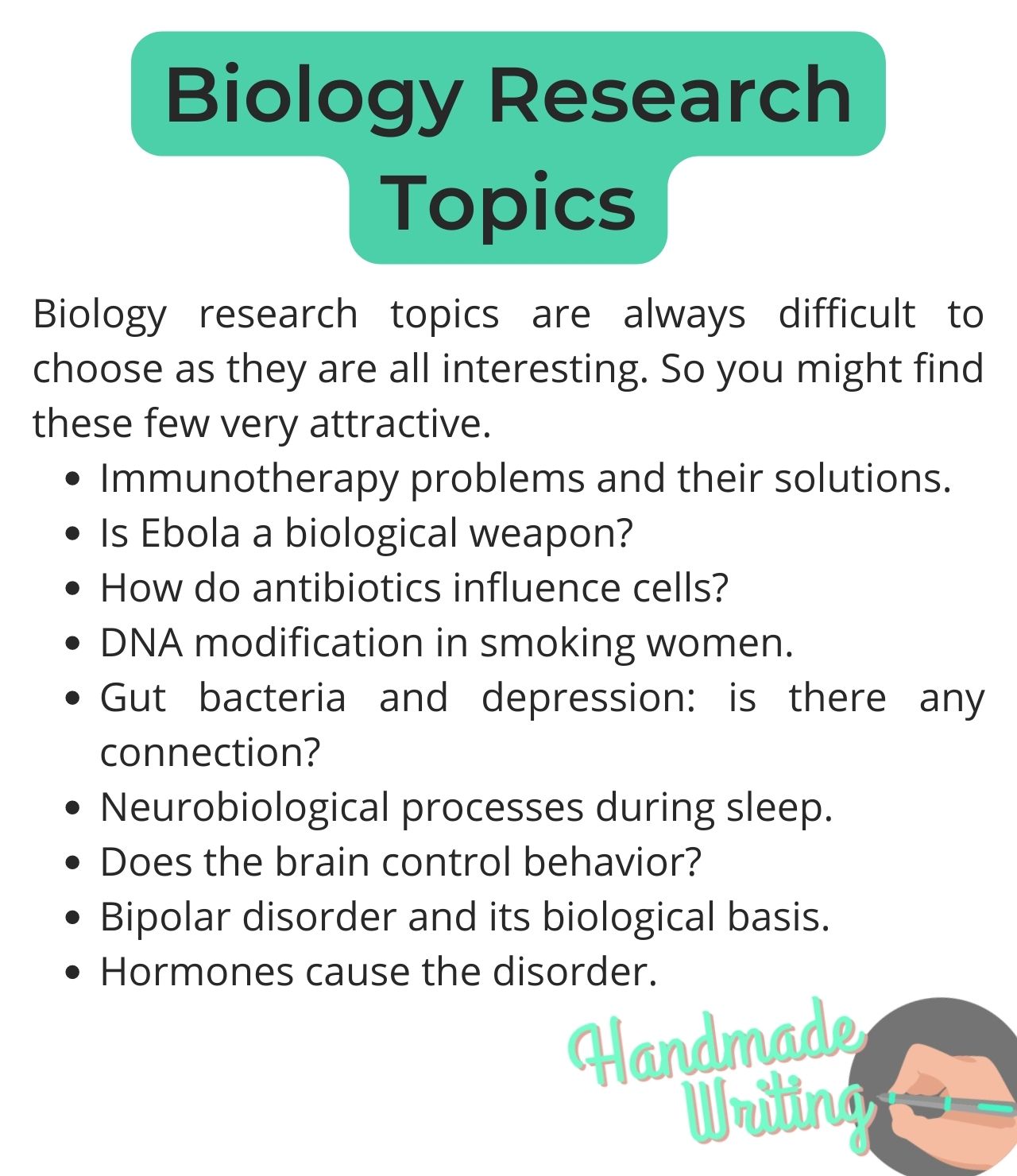
Biology research is one of the most complicated academic assignments that needs to be written according to strict requirements. While checking the variety of biology research topics, you should be ready to deal with certain problems, such as a poor understanding of the subject matter, its value for society, etc. Try to select a brief and concise topic that can be supported with relevant and up-to-date evidence. Make sure to conduct thorough research by using all the available tools and methods you know. Remember that the importance and timely revelation of the topic increases your chances to get an excellent grade eventually.
If you are still unsure on whether you can cope with your task – you are in the right place to get help. Our essay writers know the perfect answer to the question “Who can write my paper?”

A life lesson in Romeo and Juliet taught by death
Due to human nature, we draw conclusions only when life gives us a lesson since the experience of others is not so effective and powerful. Therefore, when analyzing and sorting out common problems we face, we may trace a parallel with well-known book characters or real historical figures. Moreover, we often compare our situations with […]

Ethical Research Paper Topics
Writing a research paper on ethics is not an easy task, especially if you do not possess excellent writing skills and do not like to contemplate controversial questions. But an ethics course is obligatory in all higher education institutions, and students have to look for a way out and be creative. When you find an […]

Art Research Paper Topics
Students obtaining degrees in fine art and art & design programs most commonly need to write a paper on art topics. However, this subject is becoming more popular in educational institutions for expanding students’ horizons. Thus, both groups of receivers of education: those who are into arts and those who only get acquainted with art […]
Thank you for visiting nature.com. You are using a browser version with limited support for CSS. To obtain the best experience, we recommend you use a more up to date browser (or turn off compatibility mode in Internet Explorer). In the meantime, to ensure continued support, we are displaying the site without styles and JavaScript.
- View all journals
- Explore content
- About the journal
- Publish with us
- Sign up for alerts
Collection 12 March 2020
Top 50 Life and Biological Sciences Articles
We are pleased to share with you the 50 most read Nature Communications articles* in life and biological sciences published in 2019. Featuring authors from around the world, these papers highlight valuable research from an international community.
Browse all Top 50 subject area collections here .
*Based on data from Google Analytics, covering January-December 2019 (data has been normalised to account for articles published later in the year)

Genome-wide analysis identifies molecular systems and 149 genetic loci associated with income
Household income is used as a marker of socioeconomic position, a trait that is associated with better physical and mental health. Here, Hill et al. report a genome-wide association study for household income in the UK and explore its relationship with intelligence in post-GWAS analyses including Mendelian randomization.
- W. David Hill
- Neil M. Davies
- Ian J. Deary

A 5700 year-old human genome and oral microbiome from chewed birch pitch
Birch pitch is thought to have been used in prehistoric times as hafting material or antiseptic and tooth imprints suggest that it was chewed. Here, the authors report a 5,700 year-old piece of chewed birch pitch from Denmark from which they successfully recovered a complete ancient human genome and oral microbiome DNA.
- Theis Z. T. Jensen
- Jonas Niemann
- Hannes Schroeder

A short translational ramp determines the efficiency of protein synthesis
Several factors contribute to the efficiency of protein expression. Here the authors show that the identity of amino acids encoded by codons at position 3–5 significantly impact translation efficiency and protein expression levels.
- Manasvi Verma
- Junhong Choi
- Sergej Djuranovic
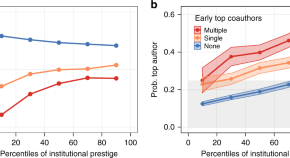
Early coauthorship with top scientists predicts success in academic careers
By examining publication records of scientists from four disciplines, the authors show that coauthoring a paper with a top-cited scientist early in one's career predicts lasting increases in career success, especially for researchers affiliated with less prestigious institutions.
- Tomaso Aste
- Giacomo Livan

Ancient DNA from the skeletons of Roopkund Lake reveals Mediterranean migrants in India
Remains of several hundred humans are scattered around Roopkund Lake, situated over 5,000 meters above sea level in the Himalayan Mountains. Here the authors analyze genome-wide data from 38 skeletons and find 3 clusters with different ancestries and dates, showing the people were desposited in multiple catastrophic events.
- Éadaoin Harney
- Ayushi Nayak

Ketamine can reduce harmful drinking by pharmacologically rewriting drinking memories
Memories linking environmental cues to alcohol reward are involved in the development and maintenance of heavy drinking. Here, the authors show that a single dose of ketamine, given after retrieval of alcohol-reward memories, disrupts the reconsolidation of these memories and reduces drinking in humans.
- Ravi K. Das
- Sunjeev K. Kamboj

Sequential LASER ART and CRISPR Treatments Eliminate HIV-1 in a Subset of Infected Humanized Mice
Here, the authors show that sequential treatment with long-acting slow-effective release ART and AAV9- based delivery of CRISPR-Cas9 results in undetectable levels of virus and integrated DNA in a subset of humanized HIV-1 infected mice. This proof-of-concept study suggests that HIV-1 elimination is possible.
- Prasanta K. Dash
- Rafal Kaminski
- Howard E. Gendelman

XX sex chromosome complement promotes atherosclerosis in mice
Men and women differ in their risk of developing coronary artery disease, in part due to differences in their levels of sex hormones. Here, AlSiraj et al. show that the XX sex genotype regulates lipid metabolism and promotes atherosclerosis independently of sex hormones in mice.
- Yasir AlSiraj
- Lisa A. Cassis

Early-career setback and future career impact
Little is known about the long-term effects of early-career setback. Here, the authors compare junior scientists who were awarded a NIH grant to those with similar track records, who were not, and find that individuals with the early setback systematically performed better in the longer term.
- Benjamin F. Jones
- Dashun Wang

Ideological differences in the expanse of the moral circle
How do liberals and conservatives differ in their expression of compassion and moral concern? The authors show that conservatives tend to express concern toward smaller, more well-defined, and less permeable social circles, while liberals express concern toward larger, less well-defined, and more permeable social circles.
- Jesse Graham
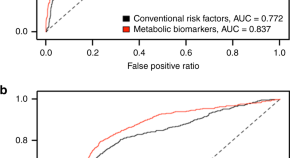
A metabolic profile of all-cause mortality risk identified in an observational study of 44,168 individuals
Biomarkers that predict mortality are of interest for clinical as well as research applications. Here, the authors analyze metabolomics data from 44,168 individuals and identify key metabolites independently associated with all-cause mortality risk.
- Joris Deelen
- Johannes Kettunen
- P. Eline Slagboom
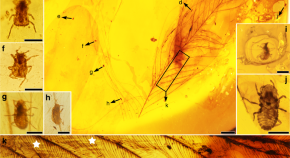
New insects feeding on dinosaur feathers in mid-Cretaceous amber
Numerous feathered dinosaurs and early birds have been discovered from the Jurassic and Cretaceous, but the early evolution of feather-feeding insects is not clear. Here, Gao et al. describe a new family of ectoparasitic insects from 10 specimens found associated with feathers in mid-Cretaceous amber.
- Taiping Gao
- Xiangchu Yin
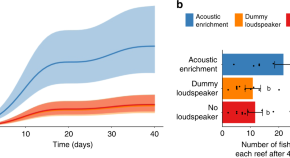
Acoustic enrichment can enhance fish community development on degraded coral reef habitat
Healthy coral reefs have an acoustic signature known to be attractive to coral and fish larvae during settlement. Here the authors use playback experiments in the field to show that healthy reef sounds can increase recruitment of juvenile fishes to degraded coral reef habitat, suggesting that acoustic playback could be used as a reef management strategy.
- Timothy A. C. Gordon
- Andrew N. Radford
- Stephen D. Simpson
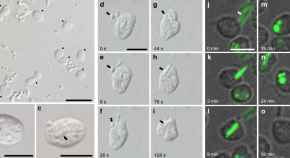
Phagocytosis-like cell engulfment by a planctomycete bacterium
Phagocytosis is a typically eukaryotic feature that could be behind the origin of eukaryotic cells. Here, the authors describe a bacterium that can engulf other bacteria and small eukaryotic cells through a phagocytosis-like mechanism.
- Takashi Shiratori
- Shigekatsu Suzuki
- Ken-ichiro Ishida

Hippocampal clock regulates memory retrieval via Dopamine and PKA-induced GluA1 phosphorylation
The neural mechanisms that lead to a relative deficit in memory retrieval in the afternoon are unclear. Here, the authors show that the circadian - dependent transcription factor BMAL1 regulates retrieval through dopamine and glutamate receptor phosphorylation.
- Shunsuke Hasegawa
- Hotaka Fukushima
- Satoshi Kida

Agreement between two large pan-cancer CRISPR-Cas9 gene dependency data sets
Integrating independent large-scale pharmacogenomic screens can enable unprecedented characterization of genetic vulnerabilities in cancers. Here, the authors show that the two largest independent CRISPR-Cas9 gene-dependency screens are concordant, paving the way for joint analysis of the data sets.
- Joshua M. Dempster
- Clare Pacini
- Francesco Iorio

Phylogenomics of 10,575 genomes reveals evolutionary proximity between domains Bacteria and Archaea
The authors build a reference phylogeny of 10,575 evenly-sampled bacterial and archaeal genomes, based on 381 markers. The results indicate a remarkably closer evolutionary proximity between Archaea and Bacteria than previous estimates that used fewer “core” genes, such as the ribosomal proteins.
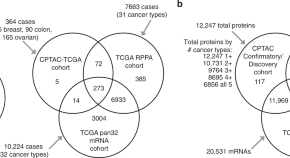
Pan-cancer molecular subtypes revealed by mass-spectrometry-based proteomic characterization of more than 500 human cancers
Mass-spectrometry-based profiling can be used to stratify tumours into molecular subtypes. Here, by classifying over 500 tumours, the authors show that this approach reveals proteomic subgroups which cut across tumour types.
- Fengju Chen
- Darshan S. Chandrashekar
- Chad J. Creighton

CRISPR-Switch regulates sgRNA activity by Cre recombination for sequential editing of two loci
Inducible genome editing systems often suffer from leakiness or reduced activity. Here the authors develop CRISPR-Switch, a Cre recombinase ON/OFF-controlled sgRNA cassette that allows consecutive editing of two loci.
- Krzysztof Chylinski
- Maria Hubmann
- Ulrich Elling
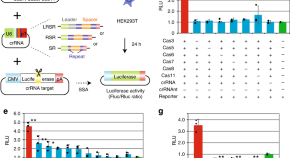
CRISPR-Cas3 induces broad and unidirectional genome editing in human cells
Class 1 CRISPR systems are not as developed for genome editing as Class 2 systems are. Here the authors show that Cas3 can be used to generate functional knockouts and knock-ins, as well as Cas3-mediated exon-skipping in DMD cells.
- Hiroyuki Morisaka
- Kazuto Yoshimi
- Tomoji Mashimo

Genetic evidence for assortative mating on alcohol consumption in the UK Biobank
From observational studies, alcohol consumption behaviours are known to be correlated in spouses. Here, Howe et al. use partners’ genotypic information in a Mendelian randomization framework and show that a SNP in the ADH1B gene associates with partner’s alcohol consumption, suggesting that alcohol consumption affects mate choice.
- Laurence J. Howe
- Daniel J. Lawson
- Gibran Hemani

The autophagy receptor p62/SQST-1 promotes proteostasis and longevity in C. elegans by inducing autophagy
While the cellular recycling process autophagy has been linked to aging, the impact of selective autophagy on lifespan remains unclear. Here Kumsta et al. show that the autophagy receptor p62/SQSTM1 is required for hormetic benefits and p62/SQSTM1 overexpression is sufficient to extend C. elegans lifespan and improve proteostasis.
- Caroline Kumsta
- Jessica T. Chang
- Malene Hansen
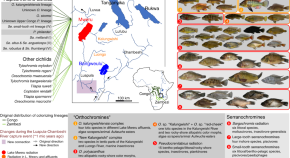
The coincidence of ecological opportunity with hybridization explains rapid adaptive radiation in Lake Mweru cichlid fishes
Recent studies have suggested that hybridization can facilitate adaptive radiations. Here, the authors show that opportunity for hybridization differentiates Lake Mweru, where cichlids radiated, and Lake Bangweulu, where cichlids did not radiate despite ecological opportunity in both lakes.
- Joana I. Meier
- Rike B. Stelkens
- Ole Seehausen

Flagellin-elicited adaptive immunity suppresses flagellated microbiota and vaccinates against chronic inflammatory diseases
Gut microbiota alterations, including enrichment of flagellated bacteria, are associated with metabolic syndrome and chronic inflammatory diseases. Here, Tran et al. show, in mice, that elicitation of mucosal anti-flagellin antibodies protects against experimental colitis and ameliorates diet-induced obesity.
- Hao Q. Tran
- Ruth E. Ley
- Benoit Chassaing
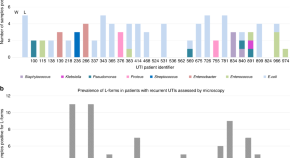
Possible role of L-form switching in recurrent urinary tract infection
The reservoir for recurrent urinary tract infection in humans is unclear. Here, Mickiewicz et al. detect cell-wall deficient (L-form) E. coli in fresh urine from patients, and show that the isolated bacteria readily switch between walled and L-form states.
- Katarzyna M. Mickiewicz
- Yoshikazu Kawai
- Jeff Errington

Dual microglia effects on blood brain barrier permeability induced by systemic inflammation
Although it is known that microglia respond to injury and systemic disease in the brain, it is unclear if they modulate blood–brain barrier (BBB) integrity, which is critical for regulating neuroinflammatory responses. Here authors demonstrate that microglia respond to inflammation by migrating towards and accumulating around cerebral vessels, where they initially maintain BBB integrity via expression of the tight-junction protein Claudin-5 before switching, during sustained inflammation, to phagocytically remove astrocytic end-feet resulting in impaired BBB function
- Koichiro Haruwaka
- Ako Ikegami
- Hiroaki Wake

Mice with hyper-long telomeres show less metabolic aging and longer lifespans
Telomere shortening is associated with aging. Here the authors analyze mice with hyperlong telomeres and demonstrate that longer telomeres than normal have beneficial effects such as delayed metabolic aging, increased longevity and less incidence of cancer.
- Miguel A. Muñoz-Lorente
- Alba C. Cano-Martin
- Maria A. Blasco
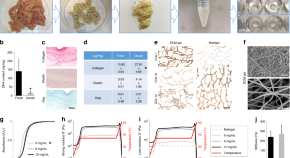
Extracellular matrix hydrogel derived from decellularized tissues enables endodermal organoid culture
Organoid cultures have been developed from multiple tissues, opening new possibilities for regenerative medicine. Here the authors demonstrate the derivation of GMP-compliant hydrogels from decellularized porcine small intestine which support formation and growth of human gastric, liver, pancreatic and small intestinal organoids.
- Giovanni Giuseppe Giobbe
- Claire Crowley
- Paolo De Coppi
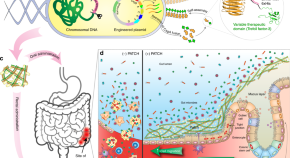
Engineered E. coli Nissle 1917 for the delivery of matrix-tethered therapeutic domains to the gut
Anti-inflammatory treatments for gastrointestinal diseases can often have detrimental side effects. Here the authors engineer E. coli Nissle 1917 to create a fibrous matrix that has a protective effect in DSS-induced colitis mice.
- Pichet Praveschotinunt
- Anna M. Duraj-Thatte
- Neel S. Joshi
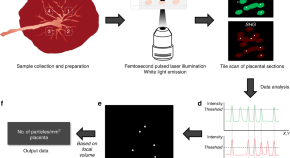
Ambient black carbon particles reach the fetal side of human placenta
Exposure to air pollution during pregnancy has been associated with impaired birth outcomes. Here, Bové et al. report evidence of black carbon particle deposition on the fetal side of human placentae, including at early stages of pregnancy, suggesting air pollution could affect birth outcome through direct effects on the fetus.
- Hannelore Bové
- Eva Bongaerts
- Tim S. Nawrot

Real-time decoding of question-and-answer speech dialogue using human cortical activity
Speech neuroprosthetic devices should be capable of restoring a patient’s ability to participate in interactive dialogue. Here, the authors demonstrate that the context of a verbal exchange can be used to enhance neural decoder performance in real time.
- David A. Moses
- Matthew K. Leonard
- Edward F. Chang
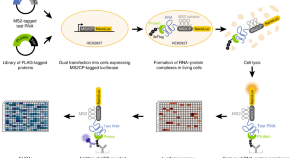
In-cell identification and measurement of RNA-protein interactions
RNA-interacting proteome can be identified by RNA affinity purification followed by mass spectrometry. Here the authors developed a different RNA-centric technology that combines high-throughput immunoprecipitation of RNA binding proteins and luciferase-based detection of their interaction with the RNA.
- Antoine Graindorge
- Inês Pinheiro
- Alena Shkumatava

A bacterial gene-drive system efficiently edits and inactivates a high copy number antibiotic resistance locus
Genedrives bias the inheritance of alleles in diploid organisms. Here, the authors develop a gene-drive analogous system for bacteria, selectively editing and clearing plasmids.
- J. Andrés Valderrama
- Surashree S. Kulkarni

Flavonoid intake is associated with lower mortality in the Danish Diet Cancer and Health Cohort
The studies showing health benefits of flavonoids and their impact on cancer mortality are incomplete. Here, the authors perform a prospective cohort study in Danish participants and demonstrate an inverse association between regular flavonoid intake and both cardiovascular and cancer related mortality.
- Nicola P. Bondonno
- Frederik Dalgaard
- Jonathan M. Hodgson
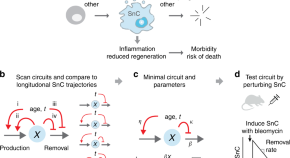
Senescent cell turnover slows with age providing an explanation for the Gompertz law
One of the underlying causes of aging is the accumulation of senescent cells, but their turnover rates and dynamics during ageing are unknown. Here the authors measure and model senescent cell production and removal and explore implications for mortality.
- Amit Agrawal

Optimizing agent behavior over long time scales by transporting value
People are able to mentally time travel to distant memories and reflect on the consequences of those past events. Here, the authors show how a mechanism that connects learning from delayed rewards with memory retrieval can enable AI agents to discover links between past events to help decide better courses of action in the future.
- Chia-Chun Hung
- Timothy Lillicrap
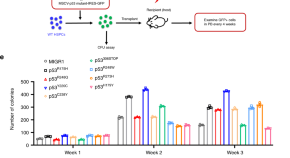
Mutant p53 drives clonal hematopoiesis through modulating epigenetic pathway
Ageing is associated with clonal hematopoiesis of indeterminate potential (CHIP), which is linked to increased risks of hematological malignancies. Here the authors uncover an epigenetic mechanism through which mutant p53 drives clonal hematopoiesis through interaction with EZH2.
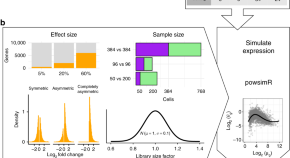
A systematic evaluation of single cell RNA-seq analysis pipelines
There has been a rapid rise in single cell RNA-seq methods and associated pipelines. Here the authors use simulated data to systematically evaluate the performance of 3000 possible pipelines to derive recommendations for data processing and analysis of different types of scRNA-seq experiments.
- Beate Vieth
- Swati Parekh
- Ines Hellmann

Cryo-EM structure and polymorphism of Aβ amyloid fibrils purified from Alzheimer’s brain tissue
Alzheimer’s disease is characterised by the deposition of Aβ amyloid fibrils and tau protein neurofibrillary tangles. Here the authors use cryo-EM to structurally characterise brain derived Aβ amyloid fibrils and find that they are polymorphic and right-hand twisted, which differs from in vitro generated Aβ fibrils.
- Marius Kollmer
- William Close
- Marcus Fändrich
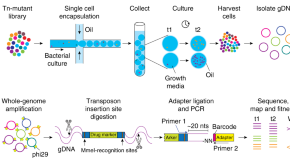
Droplet Tn-Seq combines microfluidics with Tn-Seq for identifying complex single-cell phenotypes
Culturing transposon-mutant libraries in pools can mask complex phenotypes. Here the authors present microfluidics mediated droplet Tn-Seq, which encapsulates individual mutants, promotes isolated growth and enables cell-cell interaction analyses.
- Derek Thibault
- Paul A. Jensen
- Tim van Opijnen
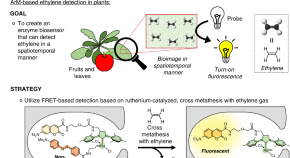
An artificial metalloenzyme biosensor can detect ethylene gas in fruits and Arabidopsis leaves
Existing methods to detect ethylene in plant tissue typically require gas chromatography or use ethylene-dependent gene expression as a proxy. Here Vong et al . show that an artificial metalloenzyme-based ethylene probe can be used to detect ethylene in plants with improved spatiotemporal resolution.
- Kenward Vong
- Katsunori Tanaka
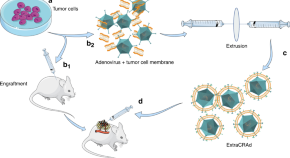
Artificially cloaked viral nanovaccine for cancer immunotherapy
Cancer therapy using oncolytic virus has shown pre-clinical and clinical efficacy. Here, the authors report ExtraCRAd, an oncolytic virus cloaked with tumour cell membrane and report its therapeutic effects in vitro and in vivo in multiple mouse tumour models.
- Manlio Fusciello
- Flavia Fontana
- Vincenzo Cerullo
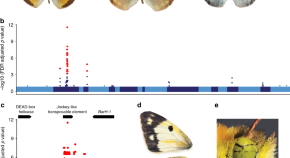
A transposable element insertion is associated with an alternative life history strategy
Tradeoffs are central to life history theory and evolutionary biology, yet almost nothing is known about their mechanistic basis. Here the authors characterize one such mechanism and find a transposable element insertion is associated with the switch between alternative life history strategies.
- Alyssa Woronik
- Kalle Tunström
- Christopher W. Wheat

Patterns of genetic differentiation and the footprints of historical migrations in the Iberian Peninsula
The Iberian Peninsula has a complex history. Here, the authors analyse the genetic structure of the modern Iberian population at fine scale, revealing historical population movements associated with the time of Muslim rule.
- Clare Bycroft
- Ceres Fernandez-Rozadilla
- Simon Myers

Single-cell transcriptomics of human T cells reveals tissue and activation signatures in health and disease
Immune cells are shaped by the tissue environment, yet the states of healthy human T cells are mainly studied in the blood. Here, the authors perform single cell RNA-seq of T cells from tissues and blood of healthy donors and show its utility as a reference map for comparison of human T cell states in disease.
- Peter A. Szabo
- Hanna Mendes Levitin
- Peter A. Sims

Genomic risk score offers predictive performance comparable to clinical risk factors for ischaemic stroke
Stroke risk is influenced by genetic and lifestyle factors and previously a genomic risk score (GRS) for stroke was proposed, albeit with limited predictive power. Here, Abraham et al. develop a metaGRS that is composed of several stroke-related GRSs and demonstrate improved predictive power compared with individual GRS or classic risk factors.
- Gad Abraham
- Rainer Malik
- Martin Dichgans

Mitochondrial oxidative capacity and NAD + biosynthesis are reduced in human sarcopenia across ethnicities
Sarcopenia is the loss of muscle mass and strength associated with physical disability during ageing. Here, the authors analyse muscle biopsies from 119 patients with sarcopenia and age-matched controls of different ethnic groups and find transcriptional signatures indicating mitochondrial dysfunction, associated with reduced mitochondria numbers and lower NAD + levels in older individuals with sarcopenia.
- Eugenia Migliavacca
- Stacey K. H. Tay
- Jerome N. Feige

NAD + augmentation restores mitophagy and limits accelerated aging in Werner syndrome
The molecular mechanisms of mitochondrial dysfunction in the premature ageing Werner syndrome were elusive. Here the authors show that NAD + depletion-induced impaired mitophagy contributes to this phenomenon, shedding light on potential therapeutics.
- Evandro F. Fang
- Vilhelm A. Bohr

Novel approach reveals genomic landscapes of single-strand DNA breaks with nucleotide resolution in human cells
Single strand breaks represent the most common form of DNA damage yet no methods to map them in a genome-wide fashion at single nucleotide resolution exist. Here the authors develop such a method and apply to uncover patterns of single-strand DNA “breakome” in different biological conditions.
- Lorena Salazar-García
- Philipp Kapranov

Evaluation of 16S rRNA gene sequencing for species and strain-level microbiome analysis
Here, the authors explore the potential of the 16S gene for discriminating bacterial taxa and show that full-length sequencing combined with appropriate clustering of intragenomic sequence variation can provide accurate representation of bacterial species in microbiome datasets.
- Jethro S. Johnson
- Daniel J. Spakowicz
- George M. Weinstock
Quick links
- Explore articles by subject
- Guide to authors
- Editorial policies
Calculate for all schools
Your chance of acceptance, your chancing factors, extracurriculars, interesting biology research topics.
Hello fellow students! I'm working on a biology research project for my school's science fair and I want to explore an interesting topic. Do you have any suggestions for unique biology research topics or ideas that could make my project stand out in the college admissions process?
Hello! It's always exciting to dive into a fascinating biology research topic for a science fair. To help make your project stand out in the college admissions process, I'd recommend choosing a topic that demonstrates your passion and curiosity for biology while addressing a current problem or emerging field. Here are a few ideas to spark your creativity:
1. CRISPR & Gene Editing: Investigate the potential applications and ethical implications of CRISPR technology. You could focus on its use in curing genetic diseases or the controversy surrounding "designer babies."
2. Microbiome Research: Examine the role of gut bacteria in human health and disease, exploring how changes in the microbiome impact our immune system, metabolism, or mental health.
3. Bioluminescence: Research the various applications of bioluminescence, such as using glowing bacteria to detect environmental pollutants or creating bio-luminescent plants as an alternative to electric lighting.
4. Synthetic Biology: Explore the field of synthetic biology and its potential applications in areas like biofuels, medicine, and environmental remediation.
5. Epigenetics: Investigate how epigenetic changes, influenced by factors such as diet, stress, or environmental exposures, can affect gene expression and contribute to disease development.
6. Climate Change & Ecosystems: Study the impact of climate change on ecosystems and species, such as how changes in temperature and precipitation are affecting species distribution, behavior, or adaptability.
7. Invasive Species: Research invasive species and the threats they pose to native ecosystems. You could focus on strategies for controlling their spread or the challenges of eradicating them.
8. Antibiotic Resistance: Dive into the issue of antibiotic resistance and the potential consequences for human health. Investigate alternative methods for fighting bacterial infections or strategies to reduce the development of resistance.
9. Biodegradable Plastics: Look into biodegradable plastics as an eco-friendly solution to conventional petroleum-based plastics. Explore their potential applications, as well as the challenges in producing and disposing of them.
Remember to choose a topic that truly interests you and aligns with your future goals, as it will make the research process more enjoyable and impactful. Best of luck with your science fair project!
About CollegeVine’s Expert FAQ
CollegeVine’s Q&A seeks to offer informed perspectives on commonly asked admissions questions. Every answer is refined and validated by our team of admissions experts to ensure it resonates with trusted knowledge in the field.
Are you seeking one-on-one college counseling and/or essay support? Limited spots are now available. Click here to learn more.
62 Best Research Opportunities for High School Students
June 2, 2024

Hands-on laboratory-based research experiences are coveted by just about every STEM-oriented teenager on the planet. Of course, this level of demand renders research opportunities for high school students a valuable and rare commodity. Fortunately, there are a number of reputable summer programs run by universities, government agencies, and private research laboratories that afford young scientists this highly sought-after experience. Research opportunities during the actual school year are more challenging to locate as colleges are, at that time, catering to their own students, and the rigidity of the high school calendar makes participation a further challenge.
What type of research opportunities can a high school student have, anyway?
Research opportunities for high school students can range from introductory to highly advanced. Some programs focus on teaching students the fundamental skills required for research while others place students with a real working research group and allow them to contribute to legitimate experiments and papers. Your level of involvement will depend on the university or organization’s policies, your mentor, your lab team, and the type of research being conducted.
What types of research experiences look best on college applications?
Authentic, laboratory-based research experiences that you get paid for are the hardest types of positions to nail down, primarily because very few of these spots are available. Moreover, such research groups are conducting serious work—consequently, they’re looking for serious, high-achieving students who will positively enhance their dynamic. Additionally, these positions typically require a longer time commitment, with students working full-time (or close to full-time) hours for several months or even years. As such, accepting one of these positions may limit the other types of summer opportunities that you can participate in. Finally, due to safety concerns and restrictions, you will likely need to be at least 16 years old to participate in many types of lab-based research.
On the flip side are research opportunities that you pay to be involved in, with some being more selective than others. Many families wonder if these programs offer legitimate research experience or are simply another way to capitalize off of the college admissions craze, and the answer is that you have to do your homework.
Although some research opportunities offer little in the way of experience, others are truly authentic opportunities to work with a mentor and delve into an area of interest for academic enrichment—no different than any other cost-based summer program. In these cases, the fact that a student prioritized their intellectual curiosity and spent several months seriously pursuing a topic of interest will be an excellent addition to their application. We’ve gone ahead and done the hard work for you—any one of the opportunities listed below is legitimate and worthy of investing your time and resources into.
How do I decide what types of research opportunities to apply for?
If conducting research is important to you, we recommend applying to a mix of highly selective and lesser selective programs to maximize your chances of being accepted to at least one. Beyond selectivity, it’s important to consider additional several factors:
- Time commitment —Some programs may require a multi-week, full-time commitment over the summer. Others may require nights and weekends during the school year.
- Time frame —Some programs are only available in the summer while others run year-round (sometimes for multiple years).
- Cost/stipend —Do you have to pay for the program, or does the program pay you? Research whether the program will be a good fit for your financial situation, including how much it costs and if you’ll receive compensation for your work, either via academic credit or a paycheck. Note that many residential programs are cost-based while commuter programs that only accept local students are more likely to be fully funded and/or offer a stipend.
- Location —Evaluate whether you’d like to attend a local program, are willing to travel to a residential program, or would prefer a virtual option.
- Level of mentor interaction —During some programs, you’ll be closely supported by PhD faculty members, while others may be run by graduate or postdoc students and require students to be more independent.
- Opportunity to publish or enter research competitions —If publishing research or submitting your project/paper to a research competition is important to you, you’ll want to look into whether the program prepares you for that venture.
Our list includes a bevy of summer program choices as well as year-long internships and apprenticeships. We’ve divided the list into three sections: Virtual, Residential/Multi-Location, and Location-Specific.
For each entry, we list the geographic location of the program, the time frame and length of the program, any associated costs or stipends, and the eligibility criteria for participation.
Virtual Research Opportunities for High School Students
Virtual research opportunities for high school students offer ultimate flexibility, in regard to time commitment as well as subject matter.
1) Polygence
- Location : Virtual
- Timeframe : Academic year and/or summer
- Length: 2-6 months
- Cost : $495-$3,695
- Eligibility: No age restrictions
For high school students who want to showcase authentic passion on their college applications, Polygence offers the most personalized and flexible online research program that helps students turn their interests into unique research projects. Accordingly, they pair intellectually curious students with PhD-level mentors to design experiments, build robots, create podcasts, write original screenplays, and publish in peer-reviewed journals in all fields from the humanities to STEM. All 1:1 programs include ten meetings with a mentor in your chosen field as well as a self-selected project topic and outcome, which could include a research paper, a prototype, or a creative piece of work.
A multitude of personalized options are available, including additional brainstorming sessions, time with a specialist who will guide the student through the publishing or research competition process, and academic credit through UCI x GATI. Moreover, Polygence’s Pods program allows students to work with like-minded peers in a group setting.
Sound like a good fit? College Transitions readers can save $50 on their Polygence package.
Research areas available include:
- Computer science, engineering, AI, & game design
- Biology, biotech, chemistry, neuroscience, and physics
- Medicine, surgery, dentistry, and public health
- Business, finance, and economics
- Math, statistics, sports analytics, and quantitative analysis
- Psychology, psychiatry, cognitive science, and social sciences
- Creative writing, history, philosophy, and literature
- Animation, the arts, fashion, photography, and dance
Residential/Multi-Location Research Programs
In the following section, we’ve outlined programs that are residential or offer opportunities in multiple locations, making them more accessible to a wider array of students.
Programs are organized alphabetically by discipline.
Biology Research Opportunities for High School Students
2) university of chicago research in the biological sciences (ribs).
- Location : Chicago, IL
- Timeframe : Summer
- Length: 4 weeks
- Cost : $14,000
- Eligibility: Current sophomores and juniors
In UChicago’s highly selective RIBS program, students practice a range of molecular, microbiological, and cell biological research techniques. The goal? To prepare them to work in a research laboratory. Accordingly, for the first two weeks, students undergo basic training in lab skills and techniques. Then, they spend the final two weeks of the course immersed in an independent research project. At the end of the course, they present the project during a research forum. Moreover, students can expect weekly writing assignments and seminars. To be competitive, students should have a demonstrated interest in science as well as top grades in those classes.
Biomedical Research Programs for High School Students
3) rosetta institute of biomedical research molecular medicine workshops.
- Location : Berkeley; San Diego; Columbia; London; virtual
- Length: 2 weeks
- Cost : $3,580-$4,180 (residential); $2,280-$2,480 (commuter); $430-1,050 (online)
- Eligibility: High school students aged 14-18
Curious about biomedical research but not ready to pursue a full-blown lab internship? Rosetta Institute offers a number of residential and online two-week programs that introduce high schoolers to topics in medicine, drug development, pharmacy, and nursing. For example, current workshops include Medicinal Chemistry, Neurological Bioinformatics, and Molecular Biology of Cancer. All students are taught by PhD-level instructors and complete an original research project.
Chemistry Research Opportunities for High School Students
4) american chemical society — project seed.
- Location : Multiple
- Length: 8-10 weeks
- Cost : Free, and students receive a $4,000 stipend
- Eligibility: All high school students whose families meet annual income requirements, but preferably current sophomores, juniors, or seniors
Having been operational for more than fifty years, Project SEED (Summer Experiences for the Economically Disadvantaged) runs programs at over 350 institutions and has served over 12,000 students. The goal of the program is to empower a diverse cohort of high school students to conduct hands-on research experience in the chemical sciences. Accordingly, all students work full-time on meaningful independent or small group projects, are closely guided by a mentor, and either write a report or do a poster presentation at the end of their fellowship.
Genetics Research Opportunities for High School Students
5) jackson lab summer student program.
- Location : Bar Harbor, ME or Farmington, CT
- Length: 10 weeks
- Cost : Free, and students receive a $6,500 stipend plus funded room, board, and travel
- Eligibility: High school seniors can apply to the Bar Harbor program, while eligible undergrads can apply to either program.
Hoping to design and execute an original independent research project? You’ll be able to do just that through Jackson Lab’s Summer Student Program, which immerses students in one of seven areas: bioinformatics and computational biology, cancer, developmental biology and aging, genomics, immunology and infectious disease, metabolic diseases, and neurobiology and sensory deficits. Moreover, students are closely guided by a mentor and present their research at the end of the summer. Finally, the application process is intense and competitive, requiring two letters of recommendation, a transcript, a resume, evidence of a strong interest in genetics and genomics, and four essay responses.
Pre-Health Research Opportunities for High School Students
6) national institutes of health high school summer internship program.
- Location : Research groups are available at many of NIH’s 27 institutes and centers , including the main campus in Bethesda, MD
- Cost : Free; all students receive a stipend
- Eligibility: High school seniors age 17+
Through their HS-SIP Program, the National Institutes of Health places high school students in full-time research positions within their many active research groups. Subject areas include biomedical, behavioral, and social sciences, and are geared toward students who are interested in pursuing research and healthcare. Moreover, students can take part in Summer Poster Day, where they present their research to the NIH community. They also have access to professional development programs and educational/career advising.
Note that this research opportunity for high school students is extremely competitive; approximately 7% of applicants are ultimately accepted. Finally, if you are under the age of 18 when you participate in the program, you will need to live within 40 miles of the campus that you’d like to intern at.
STEM/Humanities Research Opportunities for High School Students
7) army educational outreach program—high school internships.
- Location : Various
- Timeframe : All Year
- Length: 3 months
- Cost : Free, and all interns receive a stipend
- Eligibility: All current high school students. Some sites may have additional eligibility requirements.
With programs currently available in twenty states, the Army Educational Outreach Program places high school students in university research labs or at a US Army Research Laboratory/Center. Each site has its own technical focus, from biology and materials science to cybersecurity and AI. Regardless of specialty, all interns receive formal mentorship from a professional scientist or engineer, have access to high-tech equipment, and work on relevant research that addresses a current major challenge.
8) Boston University RISE
- Location : Boston, MA
- Length: 6 weeks
- Cost : $5,350 plus room & board
- Eligibility: Current high school juniors
A residential program located on the Boston University campus, RISE offers high school students the opportunity to conduct laboratory research in one of two tracks: Internship or Practicum. Students in the Internship track work full-time on a research project that aligns with their interests, and are mentored by a faculty member, postdoc fellow, or grad student. 15 subject areas are available, including astronomy, mechanical engineering, medical laboratory research, and nutrition. Alternatively, Practicum students work in small groups on structured research related to systems neuroscience and neurobiology.
Research Opportunities for High School Students—Continued
9) michigan state high school honors science, math and engineering program.
- Location : East Lansing, MI
- Length: 7 weeks
- Cost : $4,000
HSHSP is a highly selective, residential program where students can pursue research opportunities in science, engineering, and mathematics. After learning more about the research process, students deeply explore a problem of interest while engaging in an authentic (not “fail-proof”) research experience. Along the way, they’ll work with professionals and peers in their field of interest. Finally, many students have gone on to publish their work or be recognized at prestigious research competitions.
10) MIT Research Science Institute
- Location : Cambridge, MA
- Cost : Free
- Eligibility: High school juniors
With a combined focus on academic coursework and hands-on research, RSI students first take one week of STEM coursework with MIT professors. Here, they’ll learn about current research topics in biology, chemistry, engineering, mathematics, physics, and the humanities. Then, for the remaining five weeks, students “experience the entire research cycle start to finish.” During this time, they participate in an intensive, mentored individual project experience that culminates in a written and oral presentation.
The program looks for students who are exceptionally academically talented. As such, the application process is quite intensive. PSAT Math scores must be over 740 and ACT Math scores must be over 33. In addition, students must write several essays, acquire teacher recommendations, and provide transcripts. Ultimately, only 100 students are accepted.
11) NASA Internship Programs
- Location : Various; there are 15 centers and facilities in the US. Remote opportunities may also be available.
- Timeframe : Available during the fall, spring, and summer
- Length: 10-16 weeks, depending on session
- Cost : Free; the majority of interns receive a stipend, but some are unpaid
- Eligibility: High school students aged 16+
NASA’s Office of STEM Engagement (OSTEM) offers a number of internship opportunities for high school students. Available projects change each year and are location-specific, and not every NASA center will offer internship opportunities every session. That said, current projects span a range of subject areas, including Climate Change in the Hudson Estuary and Characterizing the Urban Land Surface Temperature. During the research internship, students will be closely mentored by a research scientist, engineer, or other professional. Note that you will need to make your own housing arrangements if you are not a local student.
Are you an undergraduate student? Check out NASA Pathways , which can provide a direct transition into full-time employment at NASA.
12) Smith College Summer Science and Engineering Program
- Location : Northampton, MA
- Length: 2-4 weeks
- Cost : $4,745 (2 weeks); $8,082 (4 weeks)
- Eligibility: Female high school students in grades 9-12; some programs have specific prerequisites
Fun fact: Smith was the first women’s college to create a program in engineering science. As such, their summer programs are an excellent place for young women to participate in hands-on, introductory research experiences. Two-week sessions are offered, and students can take one or both. Each session offers six distinct course choices. For example, the first session offers Chemistry of Herbal Medicine, Designing Intelligent Robots, and Novel Bacteriophage Discovery. Second session courses include Where the Body Meets the Mind, Supercontinents, Rocks, and Fossils, and the Art and Science of Microcontrollers. Students spend five days a week in class, attending lectures and conducting experiments & fieldwork. Additionally, the program is team-based, allowing students to learn from each other’s ideas and perspectives.
13) Stony Brook University Garcia Center Research Experience for High School Students
- Location : Stony Brook, NY
- Timeframe : Summer (with possible academic year continuation)
- Cost : $4,000 plus room & board
At the Garcia Center for Polymers at Engineered Interfaces, high school students can design an original research project in polymer science and technology during an intensive seven-week summer program. Uniquely, the research can then be continued during the academic year under the guidance of a faculty mentor. Students should be highly motivated and high-achieving, with at least three upper-level science courses under their belt. Finally, past participants have regularly published their research and won recognition in national competitions.
14) Stony Brook University Simons Summer Research Program
- Cost : Students need to cover transportation costs (if commuting) or room/board (if residential). Room/board is $2,781. Stipends are also awarded at the end of the program.
After being matched with a mentor and research team, students are fully immersed in the research process. Placement availability varies from year to year, but typically about thirty projects are available across over a dozen disciplines. These include biochemistry, computer science, geosciences, and pharmacological sciences, among others. Moreover, some have prerequisites, such as specific AP courses or previous programming experience.
All students participate in weekly faculty research talks, workshops, events, and a culminating poster symposium.
15) Summer Science Program
- Location : Astrophysics: UNC Chapel Hill, University of Colorado, Georgia College & State University, New Mexico State University; Biochemistry: Purdue, Indiana University; Genomics: Georgetown, Purdue, New Mexico State; Synthetic Chemistry : Southwestern Oklahoma State University
- Cost : $8,800 max; all program fees are scaled according to what each family can afford
- Eligibility: Current high school juniors and exceptional sophomores
The Summer Science Program offers four different immersive research programs that take place on different college campuses around the country. These include programs in astrophysics, biochemistry, genomics, and synthetic chemistry. Each program has its own research focus. For example, astrophysics students will dive into Asteroid Orbit Determination while genomics students explore Antibiotic Resistance and Directed Evolution.
Students spend six days a week in class deeply investigating their research topics and learning more about general experimental science. They also take part in guest lectures and other special programming.
16) Texas Tech University Anson L. Clark Scholars Program
- Location : Lubbock, TX
- Cost : Free; all students receive a $750 stipend upon completion of their projects
- Eligibility: High school juniors and seniors aged 17+ by the start of the program
The Clark Scholars Program is one of the only programs on this list with research disciplines in the sciences as well as the humanities. For example, current research areas include everything from nutritional sciences and mechanical engineering to history. Over the course of seven weeks, students work closely with a faculty member to complete a research paper in their discipline. They also participate in weekly seminars, discussions, and field trips.
17) University of California Santa Barbara Research Mentorship Program
- Location : Santa Barbara, CA
- Cost : $11,874 (residential); $4,975 (commuter)
- Eligibility: High school sophomores and juniors
During this intensive program, students work 35-50 hours per week on an interdisciplinary research project of their choice. Nearly thirty research areas are available in both the STEM disciplines and humanities; current topics include biochemistry, computer science, history, music, and anthropology, among others. Over the course of the program, they also take two courses: Introduction to Research and Presentation Techniques. Finally, students occasionally continue their research remotely during the academic year, depending on their mentor’s availability.
18) University of California Santa Barbara Summer Research Academies
- Cost : $8,224 (residential); $2,575 (commuter)
- Eligibility: High school sophomores, juniors, and seniors
Running for four weeks, the UCSB Summer Research Academies allow students to earn up to four credits. While taking a university-level course that teaches fundamental research concepts, students spend the first two weeks of the program developing a research question & framework via hands-on labs. They’ll then spend the final two weeks of the course analyzing their results and building presentations. Overall, they’ll spend about 25-40 hours per week working. Finally, twelve different tracks are available; each involves multiple disciplines. For example, “Bionic Creatures” combines mechanical engineering, materials science, soft robotics, biomanufacturing, and collective motion.
19) University of California Santa Cruz Science Internship Program (SIP)
- Location : Santa Cruz, CA
- Length: 9 weeks (two weeks virtual, seven weeks in-person)
- Cost : $4,750 plus room & board
- Eligibility: High school students aged 14+, although some research groups require students to be 16+
UCSC’s SIP Program offers a wide range of research focus areas, including science and engineering as well as social science, humanities, and art. For example, over 100 projects are currently offered that include everything from “Eating Insects in Silicon Valley: Cultural Gaps Between Food-Tech and Tradition” and “Future Projected Changes in the Distribution and Variability of Ocean Chlorophyll in Climate Simulations.” Before you dive in, you’ll spend two weeks doing online research prep (this part is conducted remotely) followed by seven weeks of in-person, mentored research. Students get to engage in authentic, open-ended projects that fully immerse them in the academic research experience. Moreover, they’ll present their findings at a symposium at the end of the program.
20) University of California Davis Young Scholars Program
- Location : Davis, CA
- Cost : $6,750
- Eligibility: High school sophomores and juniors who will be 16+ by the start of the program
Interested in biological, agricultural, environmental, or natural sciences? If so, UC Davis is a stellar place to explore those interests through research. All students have the opportunity to work on independent, original projects while receiving one-on-one faculty mentorship. Moreover, they each produce a journal-quality paper and symposium presentation. In addition to research, students also participate in a lecture series presented by UC Davis faculty; past topics have included forensic entomology and nutrition, among others. Finally, field trips to educational facilities like the Monterey Bay Aquarium and Bodega Bay Marine Laboratory round out the experience.
21) University of Florida Student Science Training Program
- Location : Gainesville, FL
- Cost : $5,200
- Eligibility: Rising seniors aged 16+
Thinking about a career in science, medicine, math, computer science, or engineering? UF’s Student Science Training Program could be the right fit. For thirty hours per week, you’ll work with a faculty mentor and lab team on university-level, ongoing research. Moreover, you’ll participate in a science lecture series as well as a UF Honors Program seminar class. Over the course of the program, you will write a research paper, present a poster, and give two oral presentations. Finally, social programming is included.
22) University of Iowa Secondary Student Training Program
- Location : Iowa City, IA
- Cost : $7,500
During this intensive and competitive program, students conduct research within small groups that are supported by a University of Iowa faculty member. There are twenty current active research areas, including chemistry, geography, neurology, orthopedics & rehabilitation, and religious studies. You’ll be working on your project approximately seven hours per day, attending classes in the evenings, and participating in structured activities on the weekend. Moreover, all groups will create and present a poster at the culmination of the program.
23) University of Massachusetts Amherst Summer Programs
- Location : Amherst, MA
- Cost : $3,636 (residential); $2,167 (commuter)
- Eligibility: Rising sophomores, juniors, and seniors
UMass Amherst offers two introductory, research-focused opportunities for high school students. These are Antibiotic Resistance: A Global Health Crisis, which allows students to join the Department of Microbiology in researching new antibiotics, and Energy Without Borders, which delves into climate change, infrastructure, and green energy. In both courses, you’ll learn research methods, complete multiple lab experiences, and present a research poster. Finally, students can earn two college credits upon successful completion of the program.
Location-Specific Research Opportunities for High School Students
The following programs are not residential and only offered in a specific location. Many also only accept local students, although some do allow out-of-state students to apply. If that’s the case, you will need to secure your own living accommodations and transportation. Moreover, if you are under the age of 18, you will need to be supervised by a parent or guardian.
Programs are organized alphabetically by state.
24) California Academy of the Sciences—Careers in Science Intern
- Location : San Francisco, CA
- Focus: STEM
- Length: Multi-year (2-3 years)
- Eligibility: 9 th or 10 th grade student enrolled in an SFUSD school with a GPA of 2.5 or higher
25) Cedars Sinai INSPIRE High School
- Location : Los Angeles, CA
- Focus: Pre-Health
- Cost : Free; all students are paid
- Eligibility: High school students age 16+
26) City of Hope Summer Student Academy
- Location : Duarte, CA
- Focus: Biomedicine
- Cost : Free; all students receive a stipend of $4,000
27) Sandia National Laboratories—Internships
- Location : Livermore, CA
- Focus : STEM
- Timeframe : Academic year and summer internships available
- Length: Academic year or 10-12 weeks (summer)
- Cost : Free; all positions are paid
28) Scripps Student Research Internship Program
- Location : La Jolla, CA
- Focus : Translational science/genomics
- Cost : Free; stipends are typically offered
29) UCSF SEP High School Intern Program
- Focus : Biomedical research
- Length: 8 weeks
- Eligibility: High school juniors enrolled in an SFUSD high school, SF charter school, or College Track San Francisco
30) UCSF Summer Student Research Program
- Location : Oakland, CA
- Length: 9 weeks
- Cost : Free; all students are given a stipend between $3,000-$4,300
- Eligibility: High school juniors or seniors, aged 16+
Connecticut
31) jackson lab academic year fellowships.
- Location : Farmington, CT*
- Focus: Genetics
- Timeframe : Academic year
- Length: 1 school year
- Cost : Free; students must be able to receive academic credit for their work
- Eligibility: High school juniors and seniors age 16+ within commuting distance of the lab
*Some fully remote opportunities are available
32) Yale School of Medicine Discovery to Cure High School Internship
- Location : New Haven, CT
33) Yale University Social Robotics Lab High School Internship
- Focus: Robotics and human social behavior
- Eligibility: Rising juniors and seniors aged 16+
34) Argonne National Laboratory — Exemplary Student Research Program
- Location : Lemont, IL
- Focus: Engineering
- Eligibility: Application must be completed by participating teacher
35) Chicago EYES on Cancer
- Focus : Biomedicine
- Timeframe : All year, with two 8-week summer research experiences
- Length: 2 years
- Cost : Free; all students receive $3,100 stipend
- Eligibility: High school sophomore, junior, or senior aged 16+
36) University of Kansas Biotech Research Apprentice Program
- Location : Overland Park, KS
- Focus : Biotech
- Length: Semester
37) Jackson Lab Academic Year Fellowships
- Location : Bar Harbor, ME*
38) National Cancer Institute Werner H. Kirsten Student Internship Program
- Location : Frederick, MD
- Timeframe : Academic year & summer
- Length: 1 year
- Cost : Free; academic credit available during school year, stipend provided in summer
- Eligibility: High school junior age 17+ who attends an eligible school located within a 30-mile radius of campus
39) University of Minnesota Lillehei Heart Institute Summer Research Scholars Program
- Location : Minneapolis, MN
- Focus: Cardiovascular medicine
- Eligibility: High school juniors and seniors age 16+ as well as undergraduate students
40) Coriell Institute for Medical Research
- Location : Camden, NJ
- Eligibility: High school student aged 17+
41) Princeton Laboratory Learning Program
- Location : Princeton, NJ
- Focus : Natural Sciences or Engineering
- Length: 5-6 weeks
42) Princeton Plasma Physics Laboratory High School Internship
- Location : Princeton, NJ*
- Focus : Physics
- Eligibility: High school seniors (program takes place summer after graduation)
*Remote projects may be available.
43) Rutgers Institute for Translational Medicine and Science Summer Research Program (RITMS)
- Location : Rutgers, NJ
- Focus : Translational medicine/science
44) Rutgers Waksman Institute Summer Experience Program
- Location : Piscataway, NJ*
- Focus : Molecular biology/bioinformatics
- Cost : $2,000
- Eligibility: High school students who have completed a high school-level biology course
*Online version of the program is also available
45) Los Alamos National Laboratory High School Internship Program
- Location : Los Alamos, NM
- Length: 11 weeks
- Eligibility: New Mexico high school seniors aged 16+
46) Sandia National Laboratories—Internships
- Location : Albuquerque, NM
47) Baruch College STEM Research Academy
- Location : New York, NY
- Timeframe : Spring/summer
- Cost : Free, but all students receive a stipend of $1,575
- Eligibility: Must be a NYC public high school sophomore junior to apply
48) Burke Neurological Institute NeuroAcademy
- Location : White Plains, NY
- Focus: Neuroscience
- Eligibility: Completion of NYS Regents Living Environment or equivalent Biology class; cumulative GPA of 3.4 or higher
49) City Tech College STEM Research Academy
- Length: Two semesters (January-August)
- Eligibility: NYC public school sophomore or junior
50) Columbia Zuckerman Institute—BRAINYAC Program
- Eligibility: High school sophomores and juniors from select partner programs/schools in Upper Manhattan and the Bronx
51) HOPP Summer Student Program at Memorial Sloan Kettering Cancer Center
- Focus: Biomedical or computational research
- Eligibility: High school students aged 14+
52) University of Rochester Laboratory for Laser Energetics Summer High School Research Program
- Location : Rochester, NY
- Focus: Laser energetics
- Eligibility: Rochester-area high school students who have completed their junior year
53) Cleveland Clinic Lerner Research Institute
- Location : Cleveland, OH
- Timeframe : Varies; depends on lab
- Length: Varies; depends on lab
54) OHSU School of Medicine Partnership for Scientific Inquiry (PSI)
- Location : Portland, OR
- Focus: Biomedical research
- Timeframe : Academic semester + summer
- Length: 16+ weeks
- Eligibility: Oregon-based high school sophomores, juniors, and seniors aged 16+
Pennsylvania
55) fox chase cancer center high school research programs.
- Location : Philadelphia, PA
- Timeframe : During school year
- Length: 2-3 months; depends on program
- Eligibility: Philadelphia-area high school students; students must be 16+ for some programs
56) Penn State College of Medicine Research Internships
- Location : Hershey, PA
- Length: Varies; could be weeks to months depending on lab
- Cost : Paid and unpaid internships available
57) University of Pennsylvania GRASP Lab High School Internships
- Focus: Robotics
- Cost : Free; stipend typically available
- Eligibility: Rising high school senior
58) George Mason University Aspiring Scientists Internship Program (ASSIP)
- Location : Fairfax, VA*
- Eligibility: High school students aged 15+ or 16+, depending on program
*Some fully remote and hybrid opportunities are available, depending on the lab.
59) Jefferson Lab High School Summer Honors Program
- Location : Newport News, VA
- Eligibility: High school students aged 16+ who live within 60 miles of the lab
60) Virginia Tech Fralin Biomedical Research Institute Summer Research Program
- Location : Roanoke, VA
- Focus: Health behaviors research
- Cost : Free; all students receive a stipend of $4,800
- Eligibility: Rising high school junior or senior in the Roanoke Valley
61) Pacific Northwest National Laboratory High School Research Programs
- Location : Richland, WA
- Timeframe : Summer & academic year programs available
- Length: Academic year or 10 weeks (summer)
- Eligibility: High school students aged 16+; some labs may require students to be 18+
62) Seattle Children’s Hospital Research Training Program
- Location : Seattle, WA
- Eligibility: High school sophomores, juniors, or seniors within commuting distance of downtown Seattle
Final Thoughts—Research Opportunities for High School Students
If gaining research experience is important to you, it’s in your best interest to explore a number of different programs, evaluating whether their structure, length, cost, and outcomes are in line with your goals. Finding the right opportunity may take some time, but it will be well worth the effort required.
- Research Programs
Kelsea Conlin
Kelsea holds a BA in English with a concentration in Creative Writing from Tufts University, a graduate certificate in College Counseling from UCLA, and an MA in Teaching Writing from Johns Hopkins University. Her short fiction is forthcoming in Chautauqua .
- 2-Year Colleges
- Application Strategies
- Best Colleges by Major
- Best Colleges by State
- Big Picture
- Career & Personality Assessment
- College Essay
- College Search/Knowledge
- College Success
- Costs & Financial Aid
- Data Visualizations
- Dental School Admissions
- Extracurricular Activities
- Graduate School Admissions
- High School Success
- High Schools
- Homeschool Resources
- Law School Admissions
- Medical School Admissions
- Navigating the Admissions Process
- Online Learning
- Outdoor Adventure
- Private High School Spotlight
- Summer Program Spotlight
- Summer Programs
- Teacher Tools
- Test Prep Provider Spotlight

“Innovative and invaluable…use this book as your college lifeline.”
— Lynn O'Shaughnessy
Nationally Recognized College Expert
College Planning in Your Inbox
Join our information-packed monthly newsletter.
I am a... Student Student Parent Counselor Educator Other First Name Last Name Email Address Zip Code Area of Interest Business Computer Science Engineering Fine/Performing Arts Humanities Mathematics STEM Pre-Med Psychology Social Studies/Sciences Submit
Department of Biological Sciences
- TTU Biology

VIROLOGY & VECTOR-BORNE DISEASES
•Medical and Veterinary Entomology •Host Range Evolution •Symbionts •Viruses •Sociovirology •Parasitology •Phages •Vector Control • Population Genetics •Vector Ecology •Vector-Virus Evolution •Microbiomes •Molecular Parasitology

Are you interested in diseases and how they move around the globe? TTU Biology faculty assess the relationships between pathogens, vectors and their hosts, and track changes in distribution patterns that affect human or veterinary health. We also research mechanisms and controls for integrated pest management plans. We engage in field work, build computer models, and conduct experiments in labs and the insectary. This diverse area of disease biology has our graduate students working across Texas, the United States, as well as Africa. Students who are curious about conducting undergraduate/ graduate research are encouraged to reach out to faculty whose research topics align with their own interests.
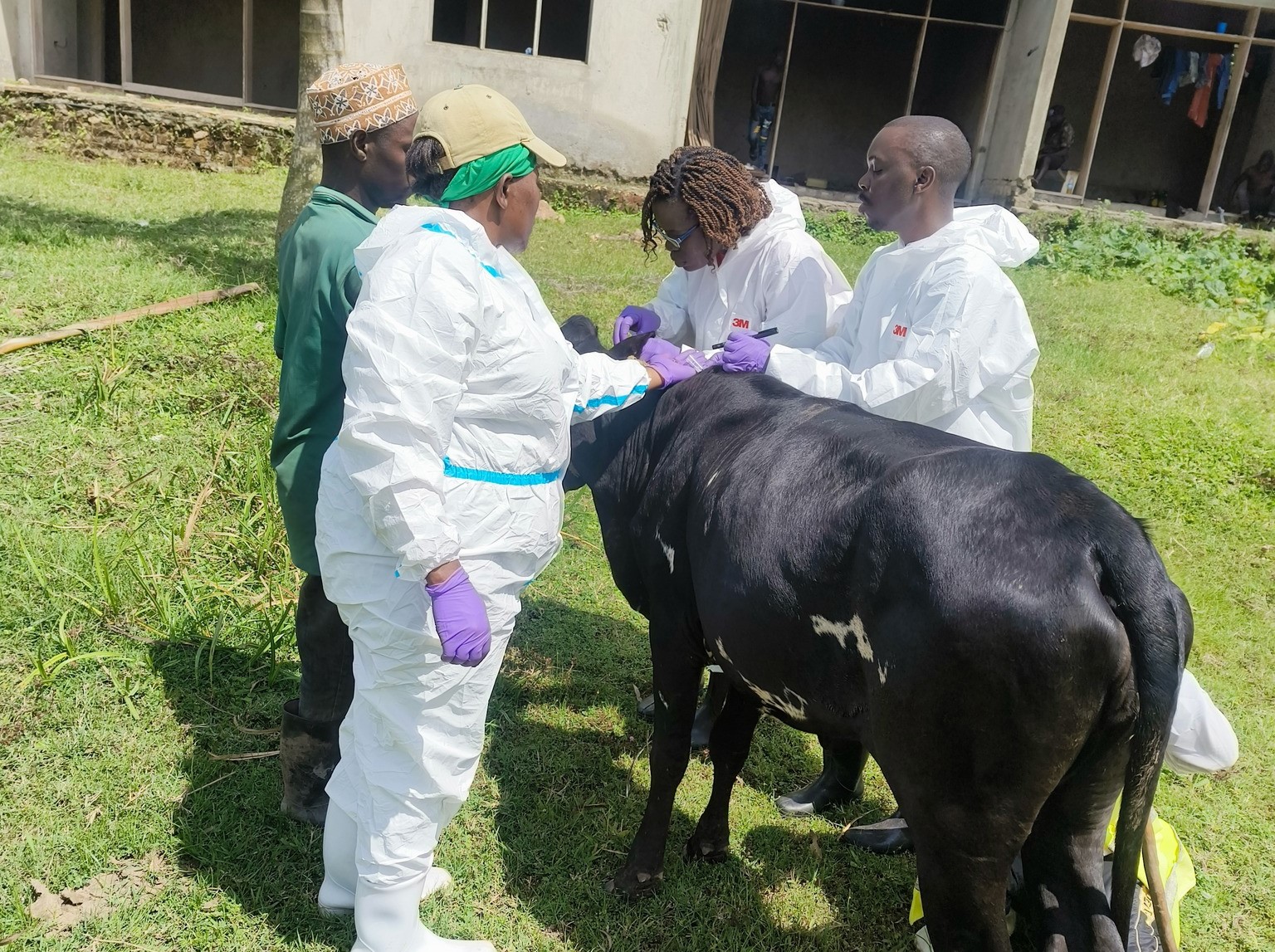
TTU Biology offers a wide range of virology and vector-borne disease courses from Applied Virology, Disease Ecology and Evolution, Emerging Pathogens, Insect Diversity, Medical Entomology, Molecular Pathenogenesis of Protozoans, Parasitology, Vector Biology, as well as independent research. Courses like Disease Ecology and Evolution, Insect Diversity and Medical Entomology are available in an online format. Many courses have labs and/or require field work. Check out the VBD certificate information below.
Current course offerings via Open Classes
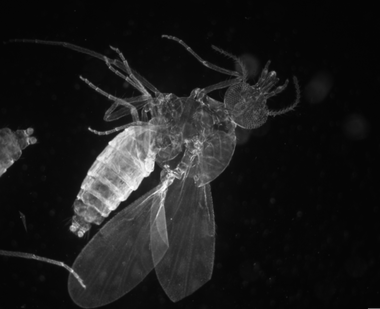
VECTOR-BORNE DISEASES CERTIFICATE
Anticipated Fall 2024: TTU Biology is pleased to start offering a Vector-Borne Diseases certificate program for both undergraduate and graduate students. This program aims to provide Texas Tech students with a solid foundation in entomology, vector biology, and related fields, equipping them with the knowledge and skills necessary for careers in fields such as public health, vector control, and entomology. The development of this certificate is supported by the CDC Rockies and High Plains Vector-borne Disease Center (RaHP VEc). Read more about the RaHP VEc .

BIOLOGY INSECTARY
In 2023, TTU Biology established an insectary for research. State of the art facility with dedicated ACL1 general rearing spaces and ACL2 experimental spaces. Currently three different species in colony, including multiple global strains of Aedes aegypti , a locally developed strain of Aedes albopictus , and a research strain of Culex tarsalis . Specimens from the colonies provide the backbone of our research into vector competence, feeding behavior, and insecticide resistance.
Contact TTU
share this!
June 7, 2024
This article has been reviewed according to Science X's editorial process and policies . Editors have highlighted the following attributes while ensuring the content's credibility:
fact-checked
trusted source
Reimagining the undergraduate bio lab experience, and keeping students in STEMM
by Howard Hughes Medical Institute
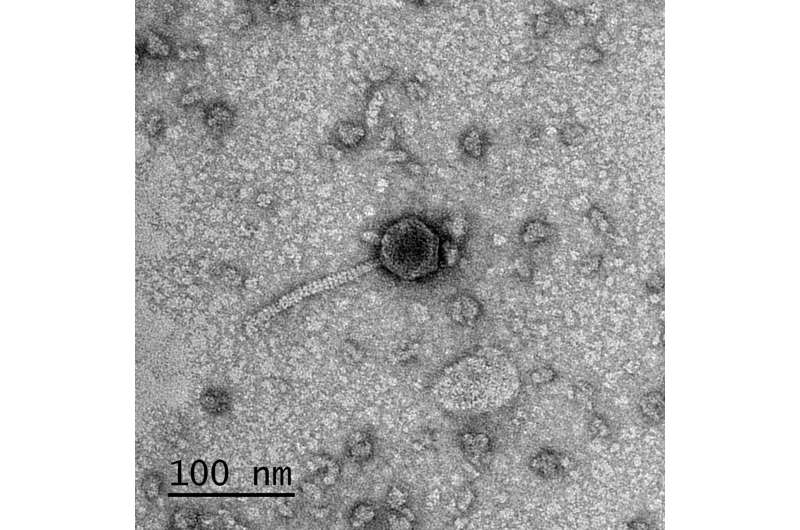
HHMI's Science Education Alliance is transforming the undergraduate introductory science experience at more than 150 two- and four-year institutions across the US. These same students are making discoveries that could change how scientists tackle bacterial infections and antibiotic resistance.
First impressions are difficult to shake. That's why the Howard Hughes Medical Institute's Science Education Alliance (SEA) is changing the introductory science experience for thousands of undergraduate students and their faculty while transforming students into researchers early in their academic journey.
In the Annual Review of Virology HHMI shared a summary of findings about the SEA Program and the impact of course-based research experiences on student persistence in science.
Established in 2008, HHMI's SEA supports a community of faculty from more than 150 two- and four-year undergraduate institutions, including community colleges , tribal colleges, liberal arts colleges, and research universities. The SEA provides faculty at participating institutions with a uniquely designed research curriculum, training, and year-round scientific support, enabling SEA faculty to mentor their students to work on high-impact research projects early in their academic tenure.
SEA students and their faculty pivot away from the typical 100-level science course structure, which all too often centers on lectures and planned lab exercises. Instead, SEA students—typically, first- or second-year undergraduates—venture beyond the classroom to, quite literally, dig into discovery science.
At the heart of the SEA Program is Phage Hunters Advancing Genomic and Evolutionary Science (SEA-PHAGES). SEA-PHAGES is a two-semester, course-based research project aimed at undergraduate students who are new to college-level science and who have little to no research experience.
During their first SEA-PHAGES term, students collect local soil samples to isolate bacteriophages—viruses that infect and kill bacteria. The students then apply a variety of microbiology techniques to purify and characterize their bacteriophages, or "phages" as they are commonly called.
In their second SEA-PHAGES term, students interpret the arrangement and function of the phage 's genes through a process known as genome annotation using bioinformatics software. Because phages are remarkably diverse and abundant—there are roughly 10 31 phages on Earth—students are all but guaranteed to find a virus or annotate a gene that has never been seen before. Many SEA students celebrate their first scientific discovery, naming their newly discovered phage before they even choose their undergraduate major.
Just like other HHMI scientists, SEA students and instructors meet to present and discuss their research findings at local science meetings. Several thousand researchers attend the annual SEA Symposium each year, making it HHMI's largest science meeting.
To take their findings a step further, students submit their annotated phage genomes to GenBank, the National Institutes of Health genetic sequence database for all publicly available DNA sequences. Many SEA students also work with their faculty and peers to publish their findings as co-authors of scientific papers.
"One of the biggest successes of our SEA-PHAGES Program is the fact that our students are in a much stronger position to compete for opportunities," said Marie Fogarty, a biology faculty member who oversees the SEA-PHAGES Program at Durham Technical Community College in North Carolina.
Fogarty noted that Durham Tech SEA-PHAGES students have secured coveted spots in National Science Foundation Research Experience for Undergraduates summer programs and other programs or paid internship opportunities at Duke University, North Carolina State University, and the University of North Carolina, Chapel Hill (UNC), as well as at institutions as far as Montana State University.
Many students have graduated from Durham Tech and continued in science, technology, engineering, mathematics, or medicine (STEMM) at NC State or UNC. One of Fogarty's recent graduates turned down a full ride at a nearby institution to continue her studies at Duke University. "All of a sudden, the community college is not a 'less than,' it is an 'equal to' experience," added Catherine Ward, Durham Tech's chair of biological sciences.
What is a phage?
A bacteriophage, commonly referred to as a "phage," is a virus that infects and kills bacteria. There are roughly 10 31 phages on Earth, accounting for about 10 23 infections of bacteria per second. Virologists have found a tremendous diversity of phages in every ecosystem, from the bottom of the ocean floor to the human gut.
SEA-PHAGES was first established as an expansion of HHMI Professor Graham Hatfull's Phage Hunters Integrating Research and Education (PHIRE) program at the University of Pittsburgh. Working with the Pittsburgh team, Tuajuanda Jordan, now president of St. Mary's College of Maryland, helped to launch SEA-PHAGES with an initial cohort of just a dozen schools. To date, more than 50,000 students have participated in the program, which supports more than 5,500 undergraduates annually.
Each year, the SEA welcomes about a dozen new institutions to the program. Faculty who are interested in launching a SEA program at their institution the following academic year must apply by October 31. SEA Program Officer Pushpa Ramakrishna and Senior Program Assistant Billy Biederman, who lead the SEA's recruitment efforts, emphasize that this is not a typical competitive application process.
"Since the SEA has the potential to revolutionize undergraduate science education, all institutions of higher education are encouraged to apply," Ramakrishna said.
"Although certain elements need to be in place at an institution to enable students to successfully engage in SEA research, we collaborate closely with all interested faculty to make it feasible for them to implement SEA research successfully at their institutions."
Biederman added, "We encourage any faculty that want to do course-based research with their students, even if you've never worked with viruses before, to reach out to us and have a conversation."
Of the SEA-PHAGES institutions, 35 have also established a SEA-GENES program since its launch in 2019. Short for "Gene-function Exploration by a Network of Emerging Scientists," SEA-GENES extends the SEA-PHAGES Program with an additional year of course-based research for mid-level undergraduates, through which students work on building phage gene libraries and screening phages for gene functions.
As with SEA-PHAGES, SEA-GENES allows student scientists to contribute useful resources and experimental observations to the broader scientific community.
Most recently, in May 2024, Richard Pollenz, director of the SEA-PHAGES and SEA-GENES Programs at the University of South Florida (USF), teamed up with 27 USF SEA-GENES students to publish their findings on a bacteriophage named Girr that infects the bacterium Mycobacterium smegmatis, a close relative of human pathogens such as Mycobacterium tuberculosis. The group's paper represented two years of work spanning two SEA-GENES cohorts.
"I am incredibly proud of our recent SEA-GENES publication," Pollenz said, noting that the group's earlier preprint led to queries from eight different scientific journals. "This speaks to the quality and impact of the research. It was amazing how excited the students were to see the final product and appreciate what they had contributed."
Central to the SEA's overall success is a mission to dismantle barriers to scientific research and discovery. The SEA is designed as an inclusive Research-Education Community (iREC), where centralized research support enables faculty from a diversity of colleges and universities to provide their undergraduates with research experience regardless of their institutional research capacities.
While some students who enroll in SEA-PHAGES have an interest in science, others find that the experience opens their eyes to a world they had never considered.
"There's data that show that students' introductory science experiences, whether they are in biology or chemistry, can serve as gatekeepers or weed-out spaces," said Danielle Heller, HHMI's SEA Program Officer and SEA-GENES lead scientist.
"Typically, the way that science is taught in most places is not the way that science is actually done. And so, by incorporating real, authentic research into courses, you're not only giving students a better experience that's more aligned with the reality of doing science and being a scientist, but you're also immediately integrating them into the ecosystem in a way that has important scientific impacts."
For more than 15 years, the SEA Program has shown that engaging undergraduates in discovery science can keep more students in STEMM.
According to a 2017 report from the US National Academies of Sciences, Engineering, and Medicine, students who participate in undergraduate research experiences are more likely to earn a STEMM degree than their peers. Even more, graduates of SEA programs often share how their experiences influenced their decision to stay in the field.
Heller fondly recalls how, a few years ago, she and SEA Senior Program Lead Vic Sivanathan gave a presentation at a large Massachusetts-based biotech company. During the talk, a woman in the audience stood up and declared, "I was a SEA-PHAGES student and that is the reason I'm in this room today."
Across the US, countless students attend institutions—such as community colleges—that may lack the resources needed to support hands-on research experiences. According to the Community College Research Center housed at Columbia University, community colleges enroll approximately 40% of all undergraduate students in the US and serve disproportionately high numbers of women, Black, Indigenous, and Latine students, as well as low-income students, first-generation college students, and students with disabilities.
"It's pretty amazing that our [SEA] students have the opportunity to do the kind of research we're doing at our tiny rural community college," said Matthew Fisher, a biology professor and head of the SEA program at Oregon Coast Community College.
In a typical introductory biology course, students learn some of the fundamentals mostly by reading from a textbook and completing basic lab assignments, but Fisher said he wanted more for his students. "The reason why I applied to the SEA-PHAGES Program is because I wanted students to immerse themselves in the scientific process. I didn't want to just perpetuate this notion that when you take a science class it's just about memorizing facts."
Since 2008, SEA undergraduate researchers have isolated more than 23,000 phages, of which more than 4,500 are fully sequenced and annotated. Further, SEA students have functionally characterized hundreds of genes, thereby shedding new light on how phages could be used as therapeutics to treat bacterial infections, including those resistant to antibiotics.
Why phages?
All told, phages carry out roughly 10 23 infections of bacteria per second. Virologists have found phages in every ecosystem ranging from the ocean floor to the human gut, and the morphologies and genomic content of phages can vary wildly.
"Part of the outcome of the SEA-PHAGES Program has been large numbers of completely sequenced phage genomes spanning this great diversity," Hatfull said.
"Each of those phages has an average of 100 genes or so, and we don't know what most of them do. The question of 'What do these genes do?' is relevant to virtually everything. It's a fundamental, compelling mystery in science, and it represents a critically important question for understanding how phages could be used therapeutically."
Although countless phage genes remain a mystery, advances in protein structure prediction programs—like AI-powered AlphaFold—enable SEA faculty and students to "make sense" of phage genome data, Hatfull said.
"Advances in computational programs enable scientists to make predictions of how proteins may interact, and that will lead to hypotheses that can be tested experimentally to allow us to see what various phage genes are doing. I see it as a game-changer."
On the education front, phages offer a beautiful entry point for discovery science. Students and faculty collaborate to identify new phages, and at times they may need to work together to overcome roadblocks. Many SEA faculty enter the program having no prior experience with phages or even virology. The SEA provides hands-on training, course materials, bioinformatics software, and a support community to help faculty excel.
Hatfull points out that the wider scientific community has a lot to learn about phages, and student-driven discoveries are making an impact. In 2019, a team of scientists showed that an experimental, personalized treatment using genetically engineering bacteriophages combatted a Mycobacterium infection in a 15-year-old girl with cystic fibrosis. To do it, they called Hatfull for help.
Because of the SEA Program, Hatfull oversees the world's largest collection of phages. He and his team combed through any that might fight the bacteria wreaking havoc on the patient's immune system.
They zeroed in on three phages—named Muddy, ZoeJ, and BPs—which offered promising characteristics. Hatfull and his colleagues modified the genomes of two and combined them with the third to create a "phage cocktail." After doctors gave the patient an IV of the cocktail twice each day for six weeks, the patient's infection had almost completely disappeared.
More broadly, phage-based therapies could provide a new weapon against an increasingly dire public health challenge: drug-resistant bacteria. According to the UN Environment Program, in 2019, nearly 1.3 million deaths worldwide were directly attributed to drug-resistant infections.
"The major goals of the SEA-PHAGES and SEA-GENES Programs are to understand viral diversity, evolution, and origins," Hatfull said.
"The discovery of so many phages and their genomic characterizations are an incredibly important part of being able to respond to the call for phages to be used therapeutically. Through the SEA Program, students and faculty provide many of the insights that make it possible to explore phage-based therapies."
"So many students enter college wanting to make a difference for humanity," Heller said.
"I think the way we teach science can connect—or disconnect—them from that motivation. Through the SEA Program, students are doing science, and they can see how it connects to the clinic, making a difference for humanity. That's really powerful and motivating."
Provided by Howard Hughes Medical Institute
Explore further
Feedback to editors

Researchers discover Earth and space share the same turbulence
15 minutes ago

DNA in the feces of snow leopards shows alpine cats eat plants
32 minutes ago

Study suggests evolutionary basis for male risk-taking behaviors
46 minutes ago

Study adds new sea cucumber species to the research toolbox
50 minutes ago

Wildfire smoke reached 99% of US lakes in 2019–2021: Study introduces 'lake-smoke day' metric

Advertisers may be inadvertently funding misinformation

Ancient crustal weaknesses contribute to modern earthquakes in West Africa, study finds

Study sheds light on how conflicting processes occur within a single cell
2 hours ago

QUIET: A place to study qubits shielded from the effects of cosmic rays

Untapped power: Logical operations using RNA droplets
Relevant physicsforums posts, covid virus lives longer with higher co2 in the air.
10 hours ago
How do fetuses breathe in the womb?
Jun 5, 2024
Universal wing- and fin-beat frequency scaling
A dna animation.
May 29, 2024
Probability, genetic disorder related
May 28, 2024
Looking For Today's DNA Knowledge
May 27, 2024
More from Biology and Medical
Related Stories

The value of information gathering in phage–bacteria warfare
Jan 10, 2024

How to keep students in science
Dec 4, 2017

Giant phage holds promise as treatment for lung infections, researchers find
Apr 3, 2024

Lab shows phage attacks in new light
Mar 6, 2023

Researchers directly detect interactions between viruses and their bacterial hosts in soil
Feb 13, 2024

Deciphering how viruses choose to turn nasty or not to their bacterial host
Mar 13, 2024
Recommended for you

'Sour Patch' adults: 1 in 8 grown-ups love extreme tartness, study shows
Apr 29, 2024

Linking environmental influences, genetic research to address concerns of genetic determinism of human behavior
Feb 27, 2024

40 years of crop research shows inequities
Feb 22, 2024

AI-generated disproportioned rat genitalia makes its way into peer-reviewed journal
Feb 19, 2024

Unpacking social equity from biodiversity data: An interdisciplinary policy perspective
Jan 16, 2024

A whiff of tears reduces male aggression, says study
Dec 25, 2023
Let us know if there is a problem with our content
Use this form if you have come across a typo, inaccuracy or would like to send an edit request for the content on this page. For general inquiries, please use our contact form . For general feedback, use the public comments section below (please adhere to guidelines ).
Please select the most appropriate category to facilitate processing of your request
Thank you for taking time to provide your feedback to the editors.
Your feedback is important to us. However, we do not guarantee individual replies due to the high volume of messages.
E-mail the story
Your email address is used only to let the recipient know who sent the email. Neither your address nor the recipient's address will be used for any other purpose. The information you enter will appear in your e-mail message and is not retained by Phys.org in any form.
Newsletter sign up
Get weekly and/or daily updates delivered to your inbox. You can unsubscribe at any time and we'll never share your details to third parties.
More information Privacy policy
Donate and enjoy an ad-free experience
We keep our content available to everyone. Consider supporting Science X's mission by getting a premium account.
E-mail newsletter
Obituary: Stan H. Braude, professor of practice in Arts & Sciences, 62

Stan Braude, a professor of practice in biology and in environmental studies in Arts & Sciences at Washington University in St. Louis, died at home Saturday, June 1, 2024, after a short illness. He was 62.
Braude earned his bachelor’s, master’s and doctoral degrees in biology at the University of Michigan, spending summers at the university’s Biological Station in northern Michigan. He worked in Kenya for more than 20 years, becoming a world expert on naked mole-rat ecology, evolution and behavior in the wild. He also worked in Argentina, Djibouti, Ethiopia, Tanzania and Uganda and locally in Missouri.
In addition to his naked mole-rat research, Braude published articles and textbook materials on many different topics in ecology, evolution and conservation biology over the years, including elephant behavior, rhinoceros inbreeding and the evolution of dogs, as well as his research on dragonflies, tuco-tucos, giant pouched rats and cave salamanders. Braude was also interested in human biology — publishing research on Barr Bodies, differential blood counts and the evolution of humor, for example — and proposed several theories on medically relevant topics including testosterone levels, inflammatory bowel disease and the oncoprotective fever hypothesis.
Braude began his teaching career at Washington University in 1992 as a lecturer in University College, now known as the School of Continuing & Professional Studies, and started teaching full time in the Department of Biology in 1997.
He taught classes in human anatomy and physiology; advanced wilderness medicine; Missouri’s natural heritage (an Ampersand program class); and the woody plants of Missouri, among others. When teaching about the biology of dog breeds, Braude brought his oversized dogs to campus to participate in classes.
Braude received multiple national awards for teaching, including the 2004 College Biology Teacher of the Year award from the National Association of Biology Teachers and the 2011 Distinguished Teacher Award from the Animal Behavior Society. Locally, Braude was honored with the Emerson Excellence in Teaching Award in 2022 and the Arts & Sciences Distinguished Teaching Award in 2019.
“Dr. Braude taught me to take ownership of how I act. He also showed me the importance of recognizing the impact of my actions in addition to my intentions,” Alison Leslie, a 2017 alum, told a writer who profiled Braude and his effectiveness in the classroom in 2019. “I truly believe that getting to know him through his courses has made me not only a better student but also a better person.”
“Stan was a consummate teacher,” said Ram Dixit, a professor and chair of biology. “He brought passion and creativity to the multitude of courses he taught in the biology department and in the University College program. His love of the outdoors and hands-on inquiry have had a lasting impact on many generations of students.”
Braude was an active participant and mentor for research projects sponsored by the Living Earth Collaborative, the Institute for Public Health and Tyson Research Center, WashU’s environmental field station. He was an animal trapper, fisherman, carpenter and gardener. He made his own camping gear and he foraged for wild edibles, a talent and skill that he taught to WashU undergraduates and younger scouts in the St. Louis area. Most recently, his knowledge of local foods led to collaborations with Bulrush restaurant and the university’s Buder Center for American Indian Studies.
“For the last eight or nine years, we’ve been tapping the maple trees on campus and then boiling down all that sap into syrup for a pancake breakfast,” Braude told the Humans of Tyson project in 2020 . “I make a fire outside and boil the sap over it. The last couple of years, I would start at around 6 in the morning and invite people from the Pathfinder class around 11, when we would have the first batch of syrup ready.”
Certified as an EMT, wilderness medicine educator and arborist, Braude was the first curator of the Washington University arboretum , which attained Morton Arboretum Level II certification during his tenure. He initiated the love letters for trees event and continued the life of the oldest campus tree .
Braude had recently traveled to Cambridge, U.K., to trace the journey of Frederick Law Olmsted, the landscape architect who crafted the first plan for the WashU campus in 1895. With the support of a Newman Exploration Travel Award , he was seeking inspiration for the design of green spaces around the new Arts & Sciences building west of Olin Library.
Braude is survived by his wife, Nancy E. Berg, a professor of Hebrew language and literature in Arts & Sciences; children and extended family.
Services were held June 4. In lieu of flowers, the family requests donations to One Tree Planted, a local food pantry or a charity of your choice.
Comments and respectful dialogue are encouraged, but content will be moderated. Please, no personal attacks, obscenity or profanity, selling of commercial products, or endorsements of political candidates or positions. We reserve the right to remove any inappropriate comments. We also cannot address individual medical concerns or provide medical advice in this forum.
Latest from the Record
Announcements.
Parking shares latest update
Staff leadership program applications due May 31
Peace Park planting May 18
Collado named an Astronaut Scholar
WashU recognized as a top workplace
Ten inducted into Bouchet Graduate Honor Society
Liz Colletta, longtime accounting employee, 55
Eduardo Slatopolsky, professor emeritus of medicine, 89
Research Wire
WashU receives grant to address economic mobility of Black youth
Internal clock helps cyanobacteria sustain life on this planet
Analysis reveals function of mitochondrial disease-related protein
The View From Here
Washington people.
Sadie Williams Clayton
Caitlyn Collins
Kim Thuy Seelinger
Who Knew WashU?
Who Knew WashU? 1.27.21
Who Knew WashU? 1.13.21
Who Knew WashU? 12.9.20
A new study reveals that marine cyanobacteria communicate
Three years ago María del Carmen Muñoz, a researcher at the University of Cordoba, was peering into an electron microscope to study the vesicles of marine cyanobacteria and found, almost accidentally, something she did not expect: structures that, although they had already been discovered years ago in other bacteria, had never been found in this type of living being, responsible for producing more than half of the oxygen on Earth. Thus began an extensive study carried out by a multidisciplinary team. Today their work comes out, its results having just been published in the journal Science Advances .
These strange structures are called membrane nanotubes, and the most relevant thing is that, according to the study, these small tubes make it possible for these living beings to transfer material by generating an exchange bridge, a kind of hose that connects with nearby cells, allowing them to transfer substances from some cyanobacteria to others. Since the discovery of these organisms, this is the first time that physical and direct contact between them has been demonstrated.
"This finding has enormous implications, and strengthens the idea that we need to change the way we think about cyanobacteria," said researcher José Manuel García. Challenging the idea that these organisms operate in isolation, the study suggests that they could act as a kind of network in which they interact, a premise of great relevance considering that these living beings are the most abundant photosynthetic organisms on the planet, representing a veritable "lung" for the oceans, and being indispensable for the sustenance of life as we know it.
In recent years the study, led by principal investigator María del Carmen Muñoz, has mobilized a multidisciplinary group composed of, among others, the UCO's Departments of Biochemistry, Molecular Biology, and Cell Biology; the Maimonides Institute for Biomedical Research (Cordoba), the University of Cádiz's University Institute of Marine Research, the Institute of Plant Biochemistry and Photosynthesis (Seville), and oceanographer Sallie W. Chisholm, a member of the Massachusetts Institute of Technology and discoverer of the Prochlorococcus genus of cyanobacteria.
Key details
Since the study began, and after reviewing the literature available on these nanotubes in other bacteria, the team has launched different experiments in the laboratory, such as the use of fluorescent proteins and their monitoring by fluorescence microscopy; and the use of electron microscopy for the characterization of these structures. Through these tests they have been able to confirm that there is an exchange of material from the interior of one cell to the other. In addition, as doctoral student and the study's first author Elisa Angulo explained, the work has shown that this transfer of substances not only occurs in cyanobacteria of the same lineage, but also between those of different genders, something that has been verified not only at the laboratory level, but also in natural ocean samples.
New questions
As is often the case in science, these findings now open the door to new questions: is this transfer of molecules a support mechanism or a weapon to compete for survival? What other substances could be exchanged, beyond proteins? Is there any relationship between this mechanism and the amount of food available in the environment? Elisa Angulo, a researcher at the University of Cordoba, is already trying to answer this last question, and has just concluded a voyage on the high seas in which she has been researching the behavior of these living beings in oligotrophic areas of the Pacific poor in nutrients. We will have to wait for the next few months to continue acquiring knowledge about these marine bacteria, the living beings that invented photosynthesis and that, more than 3.5 billion years old, represent one of the oldest known forms of life. Their study, therefore, is not only of vital importance for ecosystems, but also to understand fundamental processes in the vast field of Biology.
- Biotechnology and Bioengineering
- New Species
- Microbiology
- Environmental Awareness
- Oceanography
- Exotic Species
- Gas exchange
- Biochemistry
- Neurobiology
- Decade Volcanoes
Story Source:
Materials provided by University of Córdoba . Note: Content may be edited for style and length.
Journal Reference :
- Elisa Angulo-Cánovas, Ana Bartual, Rocío López-Igual, Ignacio Luque, Nikolai P. Radzinski, Irina Shilova, Maya Anjur-Dietrich, Gema García-Jurado, Bárbara Úbeda, José Antonio González-Reyes, Jesús Díez, Sallie W. Chisholm, José Manuel García-Fernández, María del Carmen Muñoz-Marín. Direct interaction between marine cyanobacteria mediated by nanotubes . Science Advances , 2024; 10 (21) DOI: 10.1126/sciadv.adj1539
Cite This Page :
Explore More
- 'Missing' Early Sea Sponges Discovered
- Younger Classmates Diagnosed With ADHD
- Upending Theory of Milky Way Formation
- Black Holes a Byproduct of Dark Matter?
- Marine Cyanobacteria Can Communicate
- 'Tweezer-Like' Bionic Tools Feel Right
- Odd Planet-Forming Disks Around Low-Mass Stars
- Toward Blood Stem Cell Self-Renewal
- Restored Hearing and Speech in Kids Born Deaf
- Babies and AI Both Learn Key Foundation Models
Trending Topics
Strange & offbeat.

IMAGES
VIDEO
COMMENTS
Research Topics in Biology for Undergraduates. 41. Investigating the effects of pollutants on local plant species. Microbial diversity and ecosystem functioning in a specific habitat. Understanding the genetics of antibiotic resistance in bacteria. Impact of urbanization on bird populations and biodiversity. Investigating the role of pheromones ...
Biology Research Topics For College Students. 1. Investigating the role of genetic mutations in cancer development. See also 301+ Research Topic Examples For Students [Updated 2024] 2. Analyzing the impact of climate changes on wildlife populations. 3. Studying the ecology of invasive species in urban environments. 4.
The first of our potentially easy biology research topics: climate change and ecosystems. Investigate how ecosystems respond and adapt to the changing climate. And learn about shifts in species distributions, phenology, and ecological interactions. 1) How are different ecosystems responding to temperature changes and altered precipitation ...
A List of Researchable Topics for Biology. A list of researchable topics for biology students starts with several interesting biological topics concerning sociological perspective and ethical issues. The most debatable subjects are abortion, human cloning, genetic researches and the new ethics that should be created to resolve these issues.
70 Different Biology Research Topics College Students Would Love. Read on to find 70 of the best biology research topics college students can choose from, for their research papers. These topics offer just the right amount of challenge for college students to put in the effort needed to make a successful paper. They are not just challenging ...
212 Unique Biology Research Topics For Students And Researchers. Every student studying something related to biology — botany, marine, animal, medicine, molecular or physical biology, is in an interesting field. It's a subject that explores how animate and inanimate objects relate to themselves. The field unveils the past, the present, and ...
View the most relevant schools for your interests and compare them by tuition, programs, acceptance rate, and other factors important to finding your college home. The 10 Most Interesting Biological Research Fields ; #1, Johns Hopkins University Baltimore, MD ; #2, University of Pennsylvania Philadelphia, PA ; #3, Columbia University.
Here are 30 research ideas for high school students to stimulate inquiry and enhance their understanding of biological principles. 1. Genetics and Heredity: Understanding Life's Blueprint. Genetics and heredity are the foundation of life's diversity.
This is the study of, the classes, family, diseases, etc related to plants. Botany is a good area for research and plant lovers can ace the benefits from the topics that we are going to provide them. Top 20 Botany Research Topics. Genetic inheritance in plant species. Crop science.
Biology is a vast field of study that explores the diverse aspects of life, from the smallest organisms to the complex ecosystems they inhabit. With new discoveries being made every day, the field of biology is constantly evolving and expanding. As a result, there are numerous research topics within biology that can capture the imagination of students, researchers, and professionals alike.
In this project, we will perform and systematic review and meta-analysis of fasting or diet-induced autophagy and its benefits on the body. You will gain skills in 1) searching and reviewing primary literature, 2) computational skills for performing data analysis (R language), and 3) writing your scientific findings.
200 Biology Research Topics- To Start With Right Away. High School biology has several sections to choose from, which may make it taxing for students to resolute on one choice. Here is a sizable list of 201 biology research topics for high schoolers which they can start instantly: Cell Biology. Animal cell and its structure; Functions of Cells
3.9 15 Plant Pathology Biology Research Topics. 3.10 15 Animals Biology Research Topics. 3.11 15 Marine Biology Research Topics. 3.12 15 Zoology Research Topics. 3.13 15 Genetics Research Topics. 3.14 15 Biotechnology Research Topics. 3.15 15 Evolutionary Biology Research Topics. Biology is one of the most magnetic fields of study these days ...
To make things as simple as possible for you, we've put together a list of biology research project ideas. You will find 100 topics on various subjects below. Of course, you can use any of our topics for free. However, keep in mind that even though we are doing our best to maintain this list fresh, other students will find it as well.
These tiny living things consist of microbes like bacteria and fungi. When scientists study microbiology, they find solutions to medical and environmental issues. Here are biology research topics for college students. Discuss resistance in microbes. Discuss the human immune system and the role of bacteria.
Genetic Researches Biology Topics. The improvement of abortion law in the USA. The ethical aspects of experiments with stem cells. The biological perceptions of abortion. Genetic disorders and related treatment. DNA's structure: infographics and explanation. Modern technology of DNA analysis. Human cloning science perspectives.
This biology research topic can focus on exploring the regulation of circadian clocks at various genetic levels. ... Projects based on exciting biological topics allow students to explore the science of living things and get hands-on experience with everything they learned in high school. From investigating altitude's impact on cognition in ...
This is one of the most fascinating biology research topics for anyone interested in the life-changing clinical applications of CRISPR. 3. Climate Change. There's no denying that climate change is one of the most pressing issues we're facing today. There's an urgent need for research into finding practical solutions.
1. Find the biochemical underpinnings of cancer predisposition syndromes. 2. Analyze biological sequencing databases to understand what makes certain cancers more aggressive. 3. Study tumor progression and how cancer cells invade and interact with other cells.
Biology Research Topics for College Students. The molecular mechanisms of cancer. Bioinformatics and computational biology. Neuroplasticity and learning. Genome editing with CRISPR technology. Sustainable agriculture and food security. The biology of stress and its effects.
Biology research is a serious analytical task that usually contains scientific findings, debatable questions, and detailed explanations. Students who are studying biology may get an assignment to find some interesting biological topics to do research for essays, term papers, and scientific reports.
Top 50 Life and Biological Sciences Articles. We are pleased to share with you the 50 most read Nature Communications articles* in life and biological sciences published in 2019. Featuring authors ...
Synthetic Biology: Explore the field of synthetic biology and its potential applications in areas like biofuels, medicine, and environmental remediation. 5. Epigenetics: Investigate how epigenetic changes, influenced by factors such as diet, stress, or environmental exposures, can affect gene expression and contribute to disease development. 6.
RESEARCH. Are you interested in nature and want to help make the world a better place? A B.S. degree with an emphasis in Ecology and Environmental Biology is designed to give students an understanding of the interrelationships between organisms and their environment, and to prepare them for careers in conservation, ecosystem health, environmental consulting, education, and many others.
Hands-on laboratory-based research experiences are coveted by just about every STEM-oriented teenager on the planet. Of course, this level of demand renders research opportunities for high school students a valuable and rare commodity. Fortunately, there are a number of reputable summer programs run by universities, government agencies, and private research laboratories that afford young ...
In 2023, TTU Biology established an insectary for research. State of the art facility with dedicated ACL1 general rearing spaces and ACL2 experimental spaces. Currently three different species in colony, including multiple global strains of Aedes aegypti, a locally developed strain of Aedes albopictus, and a research strain of Culex tarsalis.
To enhance the student experience and increase access to experiential learning, colleges and universities have gotten creative with undergraduate research experiences. Undergraduate research opportunities are one way to provide experiential learning in many disciplines, introducing learners to research methods under the supervision of a faculty member and providing experience for a résumé.
According to the Community College Research Center housed at Columbia University, community colleges enroll approximately 40% of all undergraduate students in the US and serve disproportionately ...
Stan Braude, a professor of practice in biology and in environmental studies in Arts & Sciences at Washington University in St. Louis, died at home June 1, 2024. Braude was the first curator of the university's arboretum and a world expert on naked mole-rat ecology, evolution and behavior in the wild.
Oct. 23, 2019 — New research on an enzyme that is essential for photosynthesis and all life on earth has uncovered a key finding in its structure which reveals how light can interact with matter ...